
Title: Horse Stories, and Stories of Other Animals
Author: Thomas Wallace Knox
Release date: May 2, 2016 [eBook #51949]
Most recently updated: October 23, 2024
Language: English
Credits: Produced by David Widger from page images generously
provided by Google Books




CONTENTS
HORSE STORIES AND STORIES OF OTHER ANIMALS
Charley and George—What they Wanted—The Lesson of Kindness—Story of Old Jane—The Horse that Went for Assistance—A Grateful Patient—Engine-house and Training-school of the New York Fire Department—Wonderful Intelligence of Fire-horses—Likes and Dislikes—Memory in Horses—Anecdotes of Old Army Horses—A Good Story of a Faithful Dog.


I wish I had a horse of my own,” said Charley Graham, as he saw one of his friends riding on a pony which had recently been presented to him by his father.
“And I'd like one, too,” exclaimed his brother George.
“Well,” said Charley? “suppose we ask father about it. Perhaps he'd give them to us, when he knows Henry Johnson has one.”
“That's so,” was the reply, “as I've heard him say he believed in boys knowing how to ride.”
There was an animated discussion as to the probabilities of the granting of the request, and also as to the best form of presenting it. It was agreed that the petition should be made that evening, shortly after dinner. The youths were good students of human nature, and had observed that Mr. Graham was in his best humor after partaking of a satisfactory meal. In this respect he was not unlike the rest of the world.
Charley and George were two youths with whom the readers of “Dog Stories and Dog Lore” are already acquainted. Their adventures in rearing and training two dogs, a Newfoundland and a Black-and-tan Terrier, are familiar to many young people. We are about to learn of their experience with horses and other quadrupeds, and will join them in listening to stories of animal intelligence in various parts of the world.
Mr. Graham received the request of his sons with a complacency that greatly encouraged them, but, before giving an answer, he questioned them as to their knowledge of horses. It was not very extensive, to be sure, as it was limited to a knowledge of the horses then in the stable, and none of these had been trained to the saddle. Next he asked them how they would treat the animals in case they should become the possessors of what they wanted.
“I would treat them kindly,” replied Charley, “and I am sure George would do the same. We have got along so nicely with Rover and Dash, by always treating them kindly, that we believe the same plan will do with horses. Are we right?”
“Yes,” replied Mr. Graham; “the horse has a great deal of affection for his master when the latter is his friend, though perhaps not as much as the dog. Horses may be taught to do a great many things; they vary in intelligence and disposition, like dogs, and men too, for that matter. Where they are intelligent and of good disposition they are capable of an amount of training that will surprise most people.”
“Here is a story which I found to-day in a newspaper,” continued the gentleman, “which will illustrate what I was saying about the intelligence of the horse. It is told by a writer for Every Other Sunday, about a favorite animal that was called Jane. The author of the story says:
“'She was large and strong, a good carriage horse, obedient to the least touch of rein or inflection of voice, and so gentle that she was the best possible playfellow for our youngest, a child of ten years, who was never happier than when in company with Jane.
“'Little Emily was not long in learning to harness after she once made Jane's acquaintance; and the great horse would bend her head down meekly while the child, mounting a chair, succeeded after great effort in putting on the bridle. Again Jane would stand with quiet patience while her little mistress tried to curry her, combed out her long mane and tail, patted and hugged her, ran about and under her, or climbed up for a ride on her broad back.
“'One fair spring day we went for a long drive in the woods. It was so mild and lovely under the oaks and pines, and we found such treasures of flowers that we lingered and lingered, and were tempted to explore some grassy unused wood roads that looked especially inviting. In so doing we lost our way, and before we could again find the open country road the sun had set. Jane started off for home at a good pace; but it was distant several miles, and the darkness gathered fast. It was a cloudy, starless evening. Soon we could not see distinctly even the horse's length in front of us; but we knew Jane could be trusted, so we gave her a loose rein and let her take her own way. She was trotting briskly along a quiet lane, when suddenly she stopped. We could see no approaching team or any obstacle in the way, so bade Jane go on. To our astonishment the horse, for the first time in all our experience of her, refused to obey. She paid no attention to rein or voice, and only tossed her head a little at the unwelcome touch of the whip. We could see that she kept turning her head, and looking back at us in a gentle, wistful way. Clearly something was wrong. The driver threw down the reins, and springing from the carriage, walked up to the horse's head. Then the mystery wras explained.
“'A few paces in front of Jane, seated right in the wheel-rut, was a little child,—a curly-haired, blue-eyed baby of two years. He was patting the earth with one little hand, and looking up in a sweet, wondering way at the great horse, looming above him through the dusk. He was not directly in the horse's path; Jane could have passed him easily enough. How could she know that the swift-turning wheels behind her, which she herself could not? see, would reach and harm the child?
“'Our good Jane! How glad we were of the disobedience that had troubled us so much a moment before! How we stroked and petted and praised her, even before we lifted the pretty baby from his perilous position, and carried him to the nearest house, with injunctions to the young Irish mother, who had many children about her, to take better care of the youngest!'”
“That's a very nice story,” said Charley, as his father paused. “I've read something like it in an English book; it was about a gentleman that was riding one night along a road and happened to be hit on the head by a projecting limb of a tree. He was stunned by the blow and fell to the ground. The horse went at once to the house he had started from, which was about a mile away; the family had gone to bed, but he made such a noise at the door as to rouse them. When some one came out he turned around and immediately led the way to where his master was lying senseless in the road.”
“And I've read about a horse,” remarked George, as his brother paused, “that showed its gratitude to a lady that had befriended it. It was in an open piece of ground near her house and the poor animal's shoulder was raw and bleeding. She coaxed him to come to her by giving him pieces of bread, and then she covered the wound with some adhesive plaster which she spread on a piece of leather. Then the horse went to grazing again, evidently feeling very much better. A little while afterward the horse's master came and led him away.
“The next day the horse came again to the lady's gate, and after looking around a while he put his head over it and whinnied. The lady went out and found that the plaster was gone from the sore spot; she put on another, and the next day the horse came again for the same attention, which was given. After that the plaster remained and the horse recovered. Ever after that when he saw the lady he showed his gratitude by whinnying and then rubbing his nose very gently against her. Sometimes he came to the gate and called her, and she used to go out and pet him, which seemed to give him a great deal of pleasure.”
“After those two stories,” said Mr. Graham, “I think you ought to have the horses you want. I'll buy them for you in a few days, and in the meantime we'll go to the training school for the horses of the New York Fire Department and see how they educate the animals there.”
Charley and George were delighted with the prospect of having horses of their own, and waited with some impatience for the purchase of their steeds. The day after the conversation just narrated they accompanied their father to one of the engine-houses and afterward to the training school. They were greatly interested in what they saw there, and Charley afterward wrote an account of the visit. He was assisted by a reporter for one of the newspapers whom he happened to meet in the engine-house, and we are permitted to copy the following from their story:
“The engine house was a big square room, smelling horsey and strong, yet was scrupulously clean and neat and resplendent with the polished steel and brass and the painted woodwork of the engine and hose-cart and chiefs wagon. In this particular engine-house the hose-cart happened to be in the front of the room, before the street doors, with the horse stalls on either side of it, against the sides of the room. The stalls were parallel with the hose-cart. Back of the hose-cart was the engine, big and shiny, with the 'ready' steam hissing into it through pipes from the boiler below. The chiefs cart was at one side of the engine, and in a corner of the room was the fuel wagon. In the side stalls stood two magnificent white horses—silent, motionless, but with ears erect, and wide open eyes watching the foreman and the strangers and apparently very anxious to join in the conversation.
“Suddenly a jingle bell in the room beat a lively rattle, and the fire gong began to ring out an alarm. The firemen slid down from upstairs on the polished rods of brass which stretched from the ground floor through scuttle-holes into the firemen's sitting-room, and took their several stations. The man on 'house watch' counted the gong strokes. As the electric snap on the bits of the horses in their stalls were unfastened, the horses jumped to their places at a bound, down came the hanging harness upon them, and collar, headstall and reinbit were fastened by ready hands in less than two seconds. Before the gong stopped sounding, engine and men and horses were ready to rush into the street if the alarm should turn out to be a call from their part of the city. The alarm did not so turn out, and all went back to their places.”
On the way from the engine-house to the training school in Harlem, Charley asked how the horses were obtained and where they came from. On this point the newspaper man enlightened him.
“The horses are generally selected,” said he, “by Captain Joseph Shea, who has charge of the training school, or by one of his assistants. They only deal with dealers whom they know to be trustworthy, and who have, in fact, furnished most of the horses to the department for years. Strength, agility, intelligence, kindness—these are the traits the buyers look at.
“When a horse has been picked out, he is sent to the training stables, and Captain Shea takes him in hand. The horse is set to tugging big loads, is punched, examined, trotted and exercised generally for fifteen days. Captain Shea has an old fire-engine at his quarters, and the horse is drilled with this, too, and is taught to notice and to mind the gong. If Captain Shea doesn't like the horse, the animal is sent back to the dealer or his former master. No horses are bought except on probation. If the horse seems to be a good one. Captain Shea sends him to some engine-house for practical trial. There the horse is made to do the same kind of work that other horses do, and if after fifteen days more the officer in command of the company doesn't like him, back he goes to the stables. It he is a very bad or stupid horse, the department rejects him finally. But the department has other uses for horses, of course, besides that of tugging engines and trucks to fires. It needs horses for supply wagons and in its repair shops, and in a great many other places, and if the horse can be used at all he is put at these kinds of work.”


When our friends reached the training school they were cordially welcomed by Captain Shea, to whom Mr. Graham presented a letter of introduction. Then they were shown through the establishment, and during the visit the Captain talked in a very interesting way about the intelligent animals which he had in charge.
“Some horses are kind o' dead like,” said he. “We coax 'em and show 'em over and over again what to do, but it's no use—they never know anything. Then an intelligent horse is sometimes vicious, and though very quick at getting to fires has some trick or other, so that we always have to be on the lookout. But a horse, if he's got the making of a good fire-horse in him, generally gets to learn his business in about three months. I have come to believe more and more that a horse is about as intelligent as a man. We can let some of 'em out in the street, and when they hear the gong sound they'll come back to the engine-house and get by the pole in a jiffy. Now you take a good horse for a tender, he don't wait for his driver to get into the seat, but out he goes when the engine goes, driver or no driver. A good tender horse'll never be more than 100 feet behind the engine as he goes down the street.
“A horse comes to know his feeding times, and he gets restless and uneasy when those times come, though I suppose all horses do the same. A fire-horse gets so accustomed to regularity, though, that he knows when he ought to be fed just as if he could read the clock. The driver generally feeds and takes care of the horses, though he consults with the company officer about what he shall give 'em. He puts the feed in the forward corner of the stall, opposite the corner across which the horse has to rush to his engine. Otherwise the latter corner would get slippery, and the horse would stumble as he dashed across it.
“One of the hardest things we have to teach a horse is to leave his food and get to the engine when the gong sounds. It's a good test of the stubbornness or docility of a horse, whichever way you've a mind to put it, whether he'll do this or not. There are a great many horses in the department that wont do it. Most of those which will, are the old horses. It annoys a real spirited horse to run out to the pole every don't get a chance to snap the collars, and at noontime it's generally a race between the men and the horses to see who gets to the pole first.”


“Do the horses know the difference between false alarms and real ones?” Charley asked.
“Why, certainly,” was the reply, “a horse knows he's going to a fire. I know he does, and every man who knows anything about a fire horse knows so too. With all their mad rush as they go down the street they are cautious, and they don't rely on the driver's rein to tell time the gong strikes and not start with the engine. He frets and worries and whinnies and acts just as teased as a horse can. They get to know some signals though, and they play us some cute tricks. Now, at noon every day every engine company gets the time on the gong from headquarters, and the horses come out as usual. But some of 'em get to know that they never go out of the house on that signal, and they whirl around after coming to the pole and get back to the stalls again. The men who have to snap the collars have to be mighty quick or they them when to turn out of the way of an obstruction. They get to know the location of hydrants in their district and they pull right up to them. They can tell when they're coming near a fire just as well as the driver can, and when they smell the smoke or see the blaze they give a lively tug on the engine. I think a horse can tell whether it is a big fire or not, too. The noise of other engines they hear going to the fire excites them. When they get to the fire, too, they're alive, you bet. You know the place of a horse on a tender at a fire is at the back of the engine. Well, when a horse has pulled the tender right up to the burning building, so that the men can use the hose, after the hose is unwound the horse will turn and trot back to its engine, just as unconcernedly as can be, and will pick its engine out from all the others.
“It's a queer thing about the likes and dislikes horses will take. They are just as queer about that as men and women are. Of course, horses are of all kinds and some will let anybody pet 'em and some wont let anybody come near 'em while they are in the stalls. But often a horse will take a great notion or a great aversion to some one man in the company. I was in a company once six years with a team of horses, and one of the horses would always kick at the assistant foreman whenever he got a chance. Sure as death, whenever Dick got behind that horse, the horse'd raise on him. Dick was a kind, good enough feller, too. That same horse'd let any other man in the company do what he wanted with him.
“A good many of these stories are true about horses that have been in the service of the department and mustered out, minding the gong when they happen to hear it, and getting excited and going to fires when an engine passes them on the street. I remember once driving an engine down Broadway on the run, and we passed an old, worn-out, miserable-looking horse on one of the street-cleaning department's carts. The man who was loading the cart had just, put an ash can on the cart wheel as we passed, and was getting ready to dump it. The old horse pricked up his ears, gave a big snort, and started after us pell mell, scattering the ashes right and left. He was an old fire-horse, sure enough. We turned a corner, and I don't know whether they ever stopped him or not. A good many of our horses go into the streetcleaning department when we get through with them. We keep horses till they get pretty old, though, if they are good ones. Old horses know the ropes so well that they are good to have around, but, of course, we can't keep 'em always, and they lose their snap after a while.”
“That reminds me,” said Mr. Graham, “of the story of a horse that had been in an English cavalry regiment and was sold in his old age and put to the prosaic work of hauling a common cart. One day some cavalrymen were exercising and were rather taken by surprise when a horse dragging a cart laden with sand came among them and took his place in line as though he belonged there. The carter who owned the horse came rushing after him, and when the officer scolded him for what the animal had done the poor man protested that he couldn't tell why he did it. The horse started at the sound of the trumpet and his owner was unable to control him.
“Inquiry into the history of the horse showed that he had been for a long time in the cavalry service, and the officers were so well pleased with his performance that they bought him for a good price and relieved him from dragging a cart for the future.”
“There are many stories of the same sort,” continued Mr. Graham, “all tending to show that the horse has an excellent memory. In one of the books there is a funny anecdote of how a clergyman's wife was once dragged around in her carriage by a horse that had belonged to an artillery company. She had gone in her carriage to witness an artillery parade, and when the company began its evolutions the horse could not be restrained but joined in the exercise. Round and round he dragged the lady in spite of her screams and also in spite of all that the driver could do in his efforts to check the steed. It was not a graceful performance for a clergyman's wife to be engaged in, and the animal was sold and sent elsewhere very soon afterward.”
“Yes,” said Captain Shea, “and there's the old chestnut of a story about the war-horse that had been sold to a milkman and was used by his daughter for carrying milk to customers. She had a can of milk hung at each side of the saddle and used to go around in this way to serve out the article where it was wanted.
“The same thing happened as in the other cases. There was a troop of cavalry getting ready for the parade, and as the trumpeter gave a signal the milk-horse went in and took his place in the ranks; the girl couldn't stop him and he didn't seem to mind the fact that he wasn't at all equipped like the rest. The milk-cans were not exactly a part of a cavalryman's outfit, but that wasn't any affair of the horse. He knew the bugle-call and was obeying orders.”
On the way home from the training school of the fire department several other stories of the same sort were given, but as they were all illustrative of what we have mentioned it is hardly necessary to repeat them. It is proper to say that the memory of the youths was a great deal freshened by what they heard, and they did their part in recalling stories of equine intelligence.
“While you are waiting for your horses, as I may not be able to find suitable ones immediately,” said Mr. Graham, “you had better give your attention to some of the books which tell about these animals.”
“What books shall we get, father?” said Charley, when the foregoing suggestion was made.
“There are several excellent works about horses,” was the reply, “but I will not give you a large number at the start. There is a large volume called 'The Book of The Horse,' by Mr. Sidney, which I would advise you to get, and there's 'Horse and Man,' by Rev. J. G. Wood, the author of Wood's 'Natural History' and kindred works. 'The Book of The Horse' is a companion to 'The Book of The Dog,' and tells a great deal you will wish to know; it not only describes the different varieties of the horse but gives directions for arranging their stalls, caring for them in health and illness, training them for the saddle or to harness, and for nearly everything belonging to the animal we are discussing. You'll find enough in it to keep you busy for some time.”
Mr. Graham wrote an order for his bookseller to deliver these books to the boys, and as soon as they obtained the volumes they had no thought of anything except to peruse the pages. What they learned in the course of their reading we will ascertain in the next chapter.
On their way home the youths met Mr. Webb, the gentleman who had given them so much advice relative to the training of Rover and Dash. They told him about their father's promise and he congratulated them on their good fortune.
As they were separating Mr. Webb told them he had just received a letter from an old friend, George M. Elwood, of Rochester, New York, who was like himself a great lover of dogs. “He tells me an interesting story about a dog,” said Mr. Webb, “and I know you will enjoy it. Dogs and horses go together,” he continued, “and this dog story will equal any horse story that you are likely to hear.”
So saying he drew a letter from his pocket and read the following extract:
“About the year 1840 my father, James L. Elwood, then living in Rochester, N. Y., owned a very fine dog that enjoyed a considerable degree of local celebrity.
He rejoiced in the ambitious name of Bonaparte, being familiarly called 'Boney,' which latter name described him very nearly, for he was a monster, standing over thirty inches high at the shoulder. In markings and make-up he is said to have closely resembled Landseer's 'Distinguished Member of the Humane Society.' He was remarkable for his intelligence as well as his unvarying good temper and was a prime favorite with young and old in the then little city, especially among children, toward whom he, in common with most members of his race, exhibited great affection and devotion.
“Among those who bear this noble animal in affectionate remembrance, many stories are still told illustrating his unusual sagacity and reasoning powers. The possession of this latter faculty by dogs is, I know, doubted by many, who ascribe all evidence of it to 'instinct,' whatever that may be besides reason, but that it does exist and manifests itself by the same processes that it does in the human animal, every true lover of a good dog religiously believes and mantains.
“The following incident will serve to illustrate 'Boney's' thinking' faculty, and I may say, parenthetically, that the facts herein given are thoroughly vouched for by those who remember the circumstances in detail. My father was, at that time, engaged in a banking office located, on the Court-house Square. In those more honest times bank robbery had not reached its present degree of refined skill, and it was the habit of his associate and himself, on going to dinner at mid-day, simply to turn the key in the safe, leaving the bank open, with no other guard than 'Boney,' who remained on duty until their return.
“One day, during this noon hour, two well known business men and customers of the bank chanced to meet on the side-walk in front of the office. They had some business transaction, in which one wished to pay the other a considerable sum of money. It was proposed to step into the bank, where, outside of the counter, was a table with, chairs for the convenience of customers, and there complete the transaction, which was accordingly done. While one of the gentlemen was engaged in writing a receipt, the other produced a large package of bank bills and proceeded to count out the required sum. 'Boney' got up from where he was lying, and, knowing both of the gentlemen, came over to where they were sitting, wagging his huge brush in friendly recognition and stood watching their proceedings. When the first gentleman had finished counting the bills, he pushed them across the table to the second, saying 'There, I think you will find that right.' At that moment the dog lifted his huge paw and laid it squarely on the pile of bills. There was no demonstration of unfriendliness on his part, but a quiet air of such firm determination that neither gentleman felt inclined to meddle further with the money. In vain they coaxed and ordered him to 'Go lie down, sir!' and there the three sat for nearly an hour. At the end of that time, to the infinite relief of at least two of the trio, my father came in, and as soon as he reached the table, 'Boney' took down his paw as quietly as he had placed it there and went back to his accustomed rug. The money was paid and receipt passed without any farther attention on his part, and the gentlemen departed, their annoyance at the awkward delay in their affairs entirely cancelled by their admiration for the dog's sagacity.
“Now I do not presume to infer that 'Boney' really knew the value of the money, as such, but he did understand that it was a commodity which was not allowed to change hands in that office except in the presence of some duly authorized representative of the bank. I think any one, who accepts the fact, will be prepared to believe that the dog recognized his duty, as he understood it, to firmly insist that no money should be transferred until the return of some duly accredited and responsible party.”


Pitting up the Stables—Loose Boxes and their Uses—Stable Fittings—Light, Ventilation and Drainage—Cobweb and Major—How to tell a Horse's Age—Do Horses understand Language?—Starting a balky Horse—The Horse that knew the Doxology—Horses telling Time by the Clock—Famous Horse Trainers: Rarey, Gleason, and Sullivan the Whisperer—How Cruiser was Tamed—Horse-breaking in Texas—“Creasing” Wild Horses.
Mr. Graham told his boys they might fit up the stable for their horses in whatever way suited them best; he gave them this permission in the confident belief that they would thereby be led to learn more about the animals and their needs than if the stables were turned over to them already fitted. The correctness of his judgment was shown by the earnestness with which the youths proceeded to inform themselves on the subject.
“There's plenty of room in the stable,” said Charley, “and so we'll have a 'loose box' for our horses in addition to the ordinary stalls. Mr. Sidney says it is desirable to have one box for every two stalls and therefore one box will be enough for us.”
“How large shall the box be?” George asked.
“Not less than twelve feet by fourteen if we have the space for it,” was the reply, “but even a much smaller box is better than none at all. Where space is limited one of the stalls may be made into a box by putting a gate across the end of it. A space large enough for a horse to turn around in, so Mr. Sidney says, is of great advantage sometimes to a sick, or very tired horse, or to one that is obliged to be idle several days at a time. When horses are in good health and steady use they haven't much need of boxes, and as we propose to keep our horses healthy and use them, too, one box will be enough for both of us.”
Then came the question of ventilation, which did not require a long debate. The youths were agreed at the start that horses as well as other animals require plenty of light and air; Mr. Graham had been of the same opinion before them, and had built his stable upon intelligent principles. It was on a dry foundation, was well drained, no unsavory gutters or sewers near it, and the windows were numerous and well arranged. He had taken especial pains with the windows and his orders to the grooms were very strict as to the proper ventilation of the stable.
“Unless you watch the grooms closely,” said Mr. Graham to Charley, “you'll very likely find them keeping the windows of the stable closed when they should be open. Grooms like to heat their horses into a condition of moisture in order to give their coats a silky appearance, and their best way of doing this is to keep the windows closed and the air foul. The colonel of an English regiment has said on this subject that the horses of his command live in stables that are constantly open to the air, and consequently are very rarely out of sorts; the same gentleman has a pack of hunting horses at his country seat, and his manager keeps them in stables that are close and hot. The hunters are constantly sick and he attributes it to the bad air in which they are confined.”
“Some people use deodorisers about their stables,” the gentleman continued, “but I have always found that when cleanliness and fresh air are insisted upon no deodorisers are needed. With a stable properly ventilated, well-paved, and kept at all times clean the horses will be in good health and disinfectants may be thrown away.”
Charley was exercised in mind as to the best form of feeding and drinking arrangements for his horse, and pondered some time on the subject.
The result of his deliberation was that he chose a trough with a rack at one side, the former for grain and the latter for hay. The tie, or fastening, for the horse was a patent one so arranged that the slack of the halter was taken up by a sliding weight inside. Mr. Graham had lost a valuable horse some years before by the animal becoming entangled in a long halter, and ever after that he had his stables provided with fastenings that would render entanglement impossible.
At the suggestion of the groom the headstall was provided with several inches of chain next to the animal's head, so as to discourage any possible inclination he might have to bite it. Some horses will use their teeth on anything, and if they once succeed in gnawing off their halters and getting loose it is not easy to break them of the habit.
Various articles for use in the stable were procured and made ready by the time the horses were bought. When the animals were sent home the two boys could hardly stay out of the stable long enough to take their meals, so anxious were they to see that proper attention was given to their prizes.


Charley's horse was a medium sized animal and was said to have come from Kentucky. The first question of the youth was as to the age of the creature, to which Mr. Graham replied that he must find out for himself.
This was a subject that had not been investigated; it demanded immediate study and away went Charley to his books again. In a few days he considered himself competent to tell a horse's age, and his practice on his own steed showed that he was not far out of the way.


“But do you know, father that I'll have to violate a very old injunction,” said Charley, as he proceeded to the study of the subject.
“How so?”
“You gave me the horse, did you not?” queried the youth.
“Certainly,” replied Mr. Graham.
“Well, then,” quoth the boy with a smile, “Isn't there an old adage that says 'never look a gift horse in the mouth'?”
“Yes,” the father answered, his face reflecting the smile of the son, “but all rules have their exceptions, and we'll make one in the present case.”
We haven't space for all that Charley learned about the way in which the age of horses is shown by their teeth. The novice who is buying a horse should not rely upon himself in this matter, and it is not at all probable that Mr. Graham would have allowed the youth to make a purchase on the strength of his limited study of the subject. A great deal of observation and practice are necessary and even then one may be deceived. The best judges of horses have been defrauded by the tricks of dealers, who can reduce the apparent age of an animal by careful filing of the teeth. The general appearance of the creature, the smoothness of his skin, the shape of the limbs and head, and many other things must be taken into consideration as well as the condition of his teeth.
Charley's horse was pronounced about four years old, while that of George was not far from five. Both the animals were of gentle disposition and the boys made friends with them at once.
Charley decided that his horse should be called Cobweb, while George thought that Major would be a good name for his steed. Accordingly the animals were known as Cobweb and Major and very quickly knew their names. In this respect a horse is very much like a dog and learns to associate a word with himself when it is frequently repeated.
“Do you think horses understand language?” George asked his brother one day while they were exercising Cobweb and Major.
“I'm quite sure they do,” was the reply. “I went to see some trained horses that were being exhibited by a man named Bartholebeen a secret sign given to the horse by the trainer, but we were positively assured there was nothing of the kind.


“That the horses all knew their names was very evident, for they stood up in a row and each one walked out when his name was called, either by the trainer or by persons in the audience. They were bright, intelligent horses and perfectly docile; after the performance was over the audience went among the horses and petted them and not one showed the least sign of ill temper. On the contrary they seemed to appreciate the attention they received and to be proud of it.”
“I have noticed,” said George, “that the horses on the street cars understand the meaning of the conductor's bell. When they are going mew. The horses did a great many things just as he told them, and to make sure there was no trickery about the matter he asked the audience to give some of the orders.”
“How was that?”
“Why, when a horse was standing at the front of the stage the trainer would ask the audience to tell the animal which way to make a circle, whether to the right or left. The horse would hesitate a moment after the order was given and then he turned in the when he was asked to. This was done several times; perhaps there may have they stop at the sound of the bell, and when they are standing they start up as soon as the bell rings.”
“I've observed that, too,” was the reply, “and the drivers say it only takes a few days for a green horse to understand it. And a car horse after a little experience learns just about how long a time should be required for a passenger to enter or leave a car, and when the time is exceeded he is apt to show impatience.”
“Henry Johnson was telling me an amusing story the other day,” said George, “about how a man started a balky horse on the street in New York.”
“How was that?” Charley asked.
“Henry was going along Broadway,” said George, “and saw a crowd around a handsome horse that was attached to an equally handsome carriage. One man had him by the bit, another by the tail, a couple of men put their shoulders against his ribs and heaved as hard as they could but the animal was as immovable as a house.
“When everybody was in despair, a stranger appeared, and stepping out of the crowd said to the driver, “'I'll show you how to make that horse go.'
“The driver retired, and the stranger took the horse confidently by the mouth, opened it and looked into it, examined his teeth for a few minutes, then seized the beast by the bridle, and to the astonishment of the crowd, the horse started off at a good gait, drawing the carriage after him with perfect ease.
“The success of the stranger's method of persuading a balky horse to go was so surprising that Henry asked the man how he did it.
“'It's very simple,' said he. 'Of course you didn't see me, but I took a chip of wood which I picked up from the sidewalk and placed it under the horse's tongue. The presence of that bit of pine chip diverted the horse's attention. He forgot all about being balky, and when I took hold of the bridle he started off like any other horse. A horse can think of only one thing at a time and you want to keep that fact in mind when you are training him.'”
“I heard a groom say the other day,” Charley remarked when George had ended his story, “that you could often start a balky horse by pretending to do something to the harness. Fasten and unfasten some of the straps, be very busy about it for several minutes, then take the reins and give the order to go on in an ordinary tone and quite likely the horse will start off without hesitation. Gleason, the famous horse trainer, acts on this principle when he is handling vicious horses; he puts a string in the animal's mouth that incommodes him though it does not hurt him. The horse concentrates his thoughts upon how he will get rid of the incumbrance and hasn't any time to be ugly. And what's more, he follows the trainer all round the ring and keeps him constantly in sight for fear he'll go away without removing the string.”
“Did you ever hear of a horse that knew the doxology?” George asked.
“No!” replied his brother in a tone of surprise. “He must have belonged to a clergyman.”
“So he did,” was the ready answer. “He belonged to a preacher in the country and had been driven by him for eighteen years. The preacher said he had so often driven the horse to church and left him standing near by, that the horse learned the doxology, and whenever it is sung he begins to neigh, knowing that he is going home soon.”
“I heard a gentleman say recently,” Charley responded, “that the school horses in the riding academies in New York can tell the time by the clock.”
“Nonsense!” said George. “That's too much to believe.”
“So I think,” was the reply, “and probably the gentleman didn't mean it literally. He explained that the horses are used for an hour at a time and they seem to know almost exactly when they have been in the ring for that period. They go around perfectly docile and obedient to their riders till just about as the hour is up, when they turn toward the mounting block and intimate very plainly that they think it is time for them to be relieved of duty and sent back to the stable. In the same way when they are taken into Central Park they know all the turns of the bridle path, and are very ready to take those that lead back to the stable.”
“You mentioned Gleason, the horse trainer, just now,” said George; “I wonder how these famous trainers have such control over horses?”
“I've been trying to find out,” was the reply, “but can't tell. Some of them say it is no secret, while others make a great deal of mystery about the matter. They teach others how to control horses, but it is rarely the case that their pupils are able to accomplish anywhere near as much as the masters. One of the most remarkable men in this line of business was Rarey, an American, who became famous in Europe about thirty years ago for subduing horses that had been quite unmanageable; I was reading about him this morning and was particularly impressed with one thing that he said.”
“What was that?” queried his brother.
“That you must never show either fear or anger in dealing with a horse. He says you should always treat him kindly, speak to him in gentle tones, let him regard you as a friend, pat him and call him endearing names, and be perfectly familiar with him. But probably there was something more than this in his method, as some of the horses that he subdued were not of a character to be soothed by kind words when he started in with them.”
“Isn't he the man that conquered the English horse Cruiser?” George asked.
“Yes,” was the reply. “When Mr. Rarey went to England a good many people thought he was playing a trick upon them, and somebody published a suggestion that he should try his skill upon a famous horse called Cruiser. Cruiser was so vicious that no one could approach him, and he had not been touched with a curry-comb for months. He kicked the planks of his stall to pieces and once he broke off an iron bar an inch in diameter by pulling it with his teeth.”
“How long did it take Mr. Rarey to conquer this ferocious animal?”
“About three hours,” was the reply. “At the end of that time his owner, Lord Dorchester, was able to mount Cruiser and ride him, a thing that nobody had done for three years. The horse was perfectly gentle after that and would follow his master like a dog. Mr. Rarey afterwards tamed a zebra and rode him, and he did other things that a great many people had believed impossible.”
“How carious!” exclaimed George.


“Yes, it was indeed,” replied Charley, “but other men have done very much the same sort of thing. I've been reading about an Irishman named James Sullivan, who was called the 'Whisperer' by the people of his neighborhood, as they believed he was able to make the horses understand what he wanted by whispering to them.”
“What could he do?”
“No matter how unruly the horse or mule that was put into his hands, he was able to make it perfectly docile in half an hour. Exactly what he did nobody knew, and the secret died with him.
“He used to ask that the stable where they kept the horse on which he was to operate should be shut, and he was to be left alone with the animal until he gave the signal for opening the door. In about half an hour he would give the signal and when the people entered they found the horse lying down and the man and horse playing together in the most friendly way imaginable. From that time on the horse was perfectly docile, no matter how bad his temper had been before. Horses that had refused to be shod and had resisted all the efforts of other trainers became thoroughly obedient in the short time he was with them; they obeyed others just as readily as they did the man who tamed them.”
In the evening following the foregoing conversation, one of the boys asked Mr. Graham about the different ways of breaking horses to saddle or harness.
“That is a branch of the horse business I don't think it desirable for you to engage in,” was the reply, “but it is well for you to know about it.”
“Various methods are pursued by trainers,” he continued, “and a great deal depends upon the character of the horse. Most of the horse-breakers are coarse, rough fellows, and employ the harshest means for subduing the animals they take into their charge. Some horses are readily tamed, and if an animal is played with by children when a colt, and grows up among them, it is generally the case that he can be ridden without the least resistance. He should be accustomed to have a blanket folded over his back when he is very young, then a saddle should be placed upon him, and after a few days of this practice a very light person may mount the saddle. Coaxing and caressing will do a great deal; it is said that the Arabs do not have to 'break' their horses at all, for the simple reason that the animals associate with the family and are accustomed to be ridden by the children of their owners when they are the merest colts.”


“Here's an account of how they break horses in Texas,” said Mr. Graham, as he took up a newspaper, from which he proceeded to read as follows:
“There are but a few men who make it a business to break horses, and who possess sufficient skill and patience to conquer the fiery spirit of the most vicious animal. These 'wild horse riders,' as they are called, in addition to receiving the use of the horse while handling him, get fees ranging from five dollars to twenty-five dollars. Fearless Frank, a well-known Texas tamer, had been engaged to break a magnificent sorrel, called Mad Ranger. Ranger was a spoiled horse. He had been caught several times for the purpose of being saddled and bridled, but the tamers had been unable to do anything with him.
“The horse-lot was inclosed by massive logs and stout timbers, capable of successfully resisting the most determined effort on the part of the beasts to escape. Connected with the large enclosure were several smaller ones, and into one of these Ranger was driven. Frank then took from his saddle a coil of three-quarter-inch rope, forty feet long, and a second coil about half as long, but much heavier, and an oilcloth slicker. Thus equipped, he slipped into the inclosure and faced the horse. Making a noose in one of the coils, he quickly threw it over Ranger's head and fastened the other end to a post called the tug-post. The animal commenced to rear and plunge, but at every plunge the slack in the rope was taken up, and Ranger was soon alongside the post. Here he was made secure with a Spanish knot, which his struggles only served to tighten.
“Seizing the old slicker, the trainer next hit the horse over the head and neck, causing the animal to rear and kick. The horse was soon tired out, and the blows that fell upon him scarcely caused him to wince. The trainer next took his long rope and fastened it around Ranger's head in such a manner that it served as a halter. The other end of the rope was secured to the post. A rope was then placed around the animal's body in such a manner that it would not slip, and another rope was fastened to his hind foot. The rope attached to the foot was drawn through the one around his body and the end taken by the trainer.
“A couple of hard pulls brought the foot up to the stomach, and the horse was compelled to stand on three legs, thus unable to kick or rear. The trainer then patted the horse on the head and slipped the bridle on. Then the saddle was put in the proper place, and the stirrups 'hobbled,' to prevent any injury to the animal, should he fall. The rider then seated himself in the saddle, the ropes were taken from the horse's feet and body, the gate of the pen opened, and horse and rider dashed out on the prairie. For fully an hour the infuriated animal reared, plunged and jumped about, vainly endeavoring to throw his rider, but finally, becoming exhausted, came to a standstill, and had to be urged even to walk. It was then that the horse was broken.”
“And now,” said Mr. Graham, after pausing a moment, “did you ever hear of how they used to capture wild horses in Texas by 'creasing' them?”
“I've read about it,” replied Charley, “but forget exactly how it was done.”
“Well,” responded Mr. Graham, “here's an account by a man who was once in the business and knows all about it. Shall I read it?”
Both the youths were anxious to hear about this manner of taking horses, whereupon their father gave them the following in the words of Mr. Hill, an experienced cattle raiser of Texas:
“In the early days of the cattle business in Texas, from 1857 to 1860, the ranges were overrun by bands of wild horses. These animals were a great nuisance, as they would get mixed with our loose horses and run them off when any one approached. As a rule, they were a rough, ill-shaped set of beasts, and almost untamable, so that few attempts were ever made to catch them, it being considered best to shoot them and thus get rid of a disturbing influence in our horse herds.
“Sometimes, however, a really fine animal would be seen and the ranchmen would try hard to secure it. But the ordinary mode of capture—lassoing—could seldom be used against wild horses, as these beasts were very shy, and even a poor horse, carrying no weight, could outstrip a very fine animal with a man on his back.


“In this extremity the Texans used to resort to a means of capturing the horses which is, I believe, exclusively American. It was discovered, I do not know how, that a blow upon a particular sinew in a horse's neck, located just above where the spine joins the skull, would paralyze the animal temporarily without doing it any permanent injury. In those days the Texans were nearly without exception fine shots, and at short range could send a rifle ball with phenomenal accuracy.
“The horses could not be approached on foot, and it was impossible to catch them on horseback. But, not to be overcome by any such difficulties, the cowboys discovered a way to capture them. Taking his rifle, a hunter would crawl through the thick chaparral until within fifty or sixty yards of the horse he desired to secure. Then, taking careful aim, he would endeavor to send a bullet through the top of the neck so as to strike the sinew. When this was properly done the horse would fall as if struck by lightning and remain insensible for ten or fifteen minutes, recovering completely in an hour or two, with no worse injury than a slight wound in the back of the neck that soon healed. Of course many bullets went astray and hundreds of horses were killed, but a good marksman would secure about one horse in three that he attempted to 'crease' as this mode of capture was called.
“The weapon universally employed in creasing mustangs was the old Hawkins rifle, which carried a bullet not much larger than a pea, had a set trigger and required but a small charge of powder. Hundreds of mustangs, always the best animals in the herd, used to be creased every year, and this practice was kept up until the herds had entirely disappeared.
“Some of the horses thus secured were very tough and fleet animals, but few were of any practical use. Nearly all were irreclaimably vicious, even when judged from the Texas standpoint. Even when broken to the saddle, they could only be ridden by the very best horsemen, and were always on the lookout to do their riders an injury. Strange to say, they seldom tried to kick, but a man had to be continually on the lookout for their fore feet and teeth. They only used their hind feet when a man was about to mount, but nearly every one of them had a trick of kicking forward as soon as the rider put his foot in the stirrup, and unless he was wary he would receive a terrible blow on the leg. I used to own a horse that, I believe, could scratch himself between the ears with his hind foot, his hind leg being apparently made of India rubber. The instant he felt a foot in the stirrup his hind hoof would come forward with the speed of lightning, in the attempt to inflict a most vicious kick. I gave up mounting him in the usual way and always used to vault into the saddle without touching the stirrups, a feat easily enough performed in my younger days, although I would have some difficulty in doing it now. I used to like to ride wild horses, but after one or two narrow escapes from their deadly fore feet, which they would use if a man carelessly stood in front of them, I gave it up and stuck to the tame stock.”
Other stories about horses consumed the evening, and at length the boys said “Good-night” and went to bed, where they doubtless dreamed of exciting experiences among the wild horses of Texas and other regions where those animals abound.
How Miss Lake's Circus Horses were Restored—Music under Disadvantages—A Lady's Adventure with an Intelligent Horse—The Horse who got his Mate out of Trouble—Friendship of a Bull and a Donkey—Intelligence of the Donkey—His Affection—Glen. Dix's Pet—How Dr. Hammond's Mule saved his Life—Old Jennie—Uncle Jake's dumb Critters—Cruelty of Blinders and Check-reins—Anecdote of Macadam—Torture by Thoughtlessness—Cobweb and Major in Harness.
One of the stories told daring the evening was about the seizure of some circus horses in Nashville, Tennessee, at the time of the American civil war. Lake and North's Circus was performing there during the winter of 1864, while the town was held by the Northern army and threatened by the Confederates.
“At 9 o'clock on the morning of the 6th of December the company was in the practice ring, drilling for a new grand entry. They had nineteen ring horses, including three black stallions, which Miss Lake, the daughter of one of the proprietors, used to drive in a manège act, and which she had trained herself on her father's Kentucky farm, and loved as a Kentucky girl will love her horses.
“The band had just finished the first bar when in stalked an officer of the army, and called Lake aside.
“'You have nineteen horses here, I see,' he said; 'one of them is lame; we don't want him, but the others are confiscated. Rather a fine lot. Suppose we say a hundred apiece for them.' Then he made out a requisition on the Treasury for $1800—handed it to Lake, called in his men, and in five minutes left the company with a show on its hands and only one lame horse to do all the equestrian business.
“Miss Lake cried and some of the men used hard language, but all the same, for four days they gave a show twice a day with that one lame horse. Then Miss Lake got desperate. She was a mere girl, and with a girl's audacity she did a thing which an older person would have considered the wildest folly.
“'John,' she said to the clown, 'I'm going to General Wilson to get my horses. I want them and they want me.'


“Nothing that anybody could say would hold her back, and so away she went to General Wilson's headquarters. She marched in on General Wilson and asked for her horses back. She had a sweet and winning way, and when she cried and told him how heartsick she was for her horses, and how much she knew they missed her, the General let his feelings get the better of his sense of duty, and gave her an order for every horse taken from the circus.
“One of Wilson's orderlies afterwards gave a reason for giving the horses back, which, while it is not so romantic, may be partly true. The horses were all trained for ring service and most of them were trained to dance to the music, and to fall upon their knees and sides upon being touched upon the haunches with a spur or the whip. The whole bunch was turned over to a military band as their mounts, and the orderly said that during the four days that the band was mounted on those beasts there was not an hour when one of them was not dancing around so that he could not keep time, or else horse and man—sometimes three or four of them—were rolling on the ground together, the musicians having unwittingly given the horse his lying-down cue.”
The boys laughed heartily over this anecdote, and then Charley told a story he had read somewhere about a horse which belonged to a lady who used to ride him in the hunting field. She had had him for three or four years and was constantly petting him and giving him sugar and other dainties. There was a great friendship between them and the horse manifested his affection for his mistress in many ways.
One day while jumping a hedge, horse and rider fell into a ditch; the lady was quite under the horse, her head being between and slightly in front of his fore legs, but there was only a little of his weight that rested on her.


Several men came to her assistance, and at first it was thought that the only way of rescuing her would be by digging her out. It was finally decided to move the horse forward and then lift him up, but there was great fear that in his efforts to rise he would trample on the lady and seriously, if not fatally, injure her. She was able to speak with the men, and told them she was confident the horse would carefully avoid harming her. Her confidence was justified by the result, as he managed to get on his feet without giving her the least scratch, beyond a slight mark on her face, which was made by the first movement of his knees and could not be avoided.
Then George told about two horses belonging to Mr. Allen of Minnesota, that were greatly attached to each other. One day Mr. Allen tied them with strong ropes, about fifty yards apart, where they could eat the grass close to the shore of the little lake. Then he went to a house a little distance away and lay down to take a nap. He hadn't been there long before he heard the sound of a horse's footsteps, and a moment afterward one of his favorites put his head into the door.
The animal gave a slight neigh and then started back towards the lake. Mr. Allen was greatly surprised to find that the horse had broken loose from his fastenings, and also that he had left his mate; surmising that something was wrong, he immediately followed to the edge of the lake, where he found the other horse lying in the water with his feet entangled in the rope, and devoting all his efforts to keep his head above the surface. Mr. Allen at once proceeded to extricate him from his trouble, and as he did so the other horse manifested his joy in every way he could.
“Three things that mark the intelligence of the horse are shown by this incident,” remarked Mr. Graham. “In the first place, he had the sense to understand that his mate was in serious trouble; secondly, he knew his master could relieve him; and thirdly, he realized that he must exert all his strength to break his own rope, a thing he had never done before and never tried to do afterwards.”
Next Charley read a little incident which he said was written by Charles L. Edwards for the American Naturalist. It was in these words:
“While riding along a country road in the environs of Cincinnati, Ohio, about the first of last October, I noticed a remarkable and very amusing display of animal intelligence. In a field beneath some trees, at the bottom of a very high hill, stood facing each other a donkey and a young bull. The bull was standing very patiently, slightly nodding his head up and down, while the donkey, with a rather heavy stick about two feet long in his mouth, was scratching his companion's forehead. Once the donkey dropped his instrument, but, without hesitation, lowered his head, picked up the club again with his teeth, and continued scratching very gravely, to the evident satisfaction of the bull. We often see two cows 'rubbing horns,' and whether this was a return for a similar favor from the bull or not, the donkey very clearly realized his poverty in the matter of horns and happily supplied the deficiency.”
“Folks call the donkey stupid,” said George, “but certainly that one showed a great deal of intelligence. Is the donkey really as stupid as he is said to be?”
“He is not,” answered Mr. Graham, “and there are plenty of anecdotes to show his intelligence. He has been known to open a gate by carefully lifting the latch, and after returning to the yard, he would shut the gate, so that any trespass of which he had been guilty during his absence would not be laid to his charge.
A donkey will follow a kind master or mistress just like a dog, and he fully equals the horse in showing his appreciation of kind treatment.”
Gen. John A. Dix owned a donkey that lived to the age of forty-two years, and endeared himself to his master and the members of the family by his docility and almost human intelligence.
The little creature was, after the death of the general, domiciled at the family country seat, West Hampton, Long Island, where almost luxurious accommodations were provided for his comfort; but old age, and the absence of those who, in days gone by, patted his shaggy coat, and the sound of whose voices he would recognize and greet, no doubt tended to hasten physical ailments, which necessitated the request that an officer of the Society for the Prevention of Cruelty to Animals should put an end to the suffering of an endeared and most affectionate animal who, although he outlived his master and mistress, at last succumbed to the inevitable. He was buried near where the waves of Long Island Sound wash the sandy shore of West Hampton, and a mound of green sod marks the spot where lies the body of the humble friend of the honored soldier, who issued the famous patriotic mandate: “If any one attempts to haul down the American flag, shoot him on the spot.”
“Does the mule equal the horse or donkey in intelligence?” George asked.


“It is generally conceded that he does not,” was the reply, “but he is far from being the stupid animal that many people suppose. He has a keen nose, and can often scent danger of which his rider or driver is ignorant. He has a great dread of an Indian, and it is a common saying in the Far West that a mule will always give warning when Indians are about. On this subject Dr. William A. Hammond tells a good story:
“One day, while the Doctor was stationed at Fort Webster, in what is now Arizona, he started down the canyon on a very fine large mule. The beast suddenly stopped abruptly and would not budge a step. Spurs were used to no purpose. There he stood as firm as a rock. Dr. Hammond pulled him around and galloped back to the fort. The next morning it was ascertained that at a point scarcely a hundred yards in advance of where the mule gained his victory some Apache Indians had ambushed the road; and, but for the brute's keen nose, and ears, and in resisting an obstinate man, short work would have been made of mule and rider.
“Mules live to a great age when they are properly cared for,” continued Mr. Graham. “Until quite recently there was a mule named Jennie on Blackwell's Island, that had been there forty years, and she was supposed to be nearly twenty years old when she became a public charge.
“Jennie has an interesting history. About forty years ago her owner had a mild attack of lunacy and was consigned to the insane asylum. He had traveled across the continent from San Francisco with Jennie it was said, and became so attached to the beast that he could not be persuaded to part with her, and the two were carried to Ward's Island together. The mule and the lunatic were about the same age then, and were devoted friends. In all kinds of weather they roamed about the asylum grounds together. One day Jennie was taken across to Harlem to be shod. The boat was moored and the animal tied to a tree by the bank, while the keeper went off to find the blacksmith. When he came back for the mule she was no longer in sight. The broken halter was lying on the ground, and Jennie was found that afternoon, still wet from her swim, with her old friend on the island. At length the lunatic died, and Jennie fell into the hands of the Board of Governors, and was set to work on Randall's Island. She dragged brick carts and lawn rollers for awhile, her size and age-unfitting her for heavier work, and was used for distributing bread in the morning among the various buildings. She was saddled, too, sometimes, and ridden by the children and their nurses.
“Twenty-five years ago the keeper of the stables asked permission to kill her as an incumbrance. Isaac Bell was then one of the Charities Commissioners, and through his influence and interest in the matter, an order was issued declaring that Jennie should be retired from active service and live in the comparative luxury of the island's stables and grass plots as long as she pleased. The mule was moved once more, this time to Blackwell's Island, and took her quarters in the stone stable at the south end of the almshouse grounds. Keepers and inmates have been changing ever since, but in all the twenty-five years the venerable mule has seemed to grow scarcely a day older. She still draws light loads when the keepers harness her for exercise, and the Irishman in a striped jacket who is her involuntary groom stands in as great awe of her hind legs as ever. With the rest, however, she is good humored and docile, and has long been caressed as a pet.


“And let me say,” continued Mr. Graham, “that if you ever own a mule, don't disfigure him and make him unhappy by clipping his mane and tail. Nature has not made him as beautiful as the horse, but, in the language of one of his friends, 'she has endowed him with those gifts useful to his race, and among those are a good mane and tail; if not as an adornment, yet as a protection against his enemies, the tormenting, biting flies. To shear these does not add to his good looks; on the contrary it makes him appear more unsightly. He is not to blame for large head and long ears; why then should these be made more disproportionate by clipping the mane? and why should the tail be reduced to a mere pendant tuft, when both are needed to protect the poor, overworked creature from his winged enemies? It is to be hoped that mule-owners will learn to consider this custom as senseless, as a sin against the comfort and protection of this good servant, and treat the despised mule with more humane consideration.'”
“I found some verses to-day,” said Charley, “that I liked very much. They were in a paper called Our Dumb Animals, and illustrate the advantages of kindness to the creatures that cannot speak to tell their wants. Shall I read them?”
“Certainly,” said Mr. Graham: “Read them, and let your playmates read them, too.”
Thereupon Charley slowly read the following:
“I don't know much of languages, such as the scholars tell.
But the language of dumb critters I understand quite well.
And I think, sir—yes, I think, sir—that their voices reach the sky.
And that their Maker understands the pleading of their eye.
And I shouldn't be surprised, sir, if at the judgment day,
Some cruel, heartless human folks should be as dumb as they.
My house is not so elegant as many are, I know;
But my cattle are all sheltered from the wintry winds and snow.
And they are not kept on rations that leave nothing but the frame.
Or in the spring returning to 'the dust from whence they came.'
Ah! God hath wisely ordered, sir, that in a money way,
Starving, abusing, critters are the things that will not pay.
If any of my flock are sick or hurt in any way,
I see that they are cared for, sir, by night as well as day.
My letter's on their wool, sir—'tis all the brand I know;
My lambs—they are not tailless, for God didn't make them so.
Some say sheep don't need water, but I tell you it's a lie!
They're almost frantic for it, sir, the same as you or I.
My horses—you have seen them, sir, they are just what they seem;
And, if I do say it myself, they are a splendid team.
They wear no foolish blinders, and from check reins they are free;
And they never had a hurt, sir, that had been caused by me.
The way they do my bidding now.'tis really a surprise!
They know my very step, sir, and thank me with their eyes.
My pig pen, over yonder, I'd like, sir, to Lave shown;
My hogs—they never are the 'breed' that is but skin and bone;
I know, sir, that to fatten them they need both food and drink,
A shelter and a bed, sir, will help it on I think.
I have a yard on purpose, they can root whene'er they choose—
It seems to me like cruelty, so rings I never use.
There's one thing more I want to show, 'tis Hannah's hen-house, here—
Our poultry always pays us well, and just now eggs are dear—
'Tis warm and clean and bright, you see, with gravel on the ground;
There's food and water standing here each day the whole year round.
But maybe I have tired you, sir—forgive an old man's pride;
But somehow I love dumb critters, and I want their needs supplied.”
“There's one thing in those verses I want to ask about,” said George, when his brother paused. “Uncle Jake says his horses 'wear no foolish blinders, and from check-reins they are free.' Now I want to ask why horses are made to wear blinders in harness, when they don't wear them while under the saddle! I know that the carriage horses in our stables don't wear blinders, but I never thought to ask why.”
“It's because I've given strict orders that none of my horses shall wear them,” Mr. Graham answered. “And my reasons for so ordering I will give in the words of Dr. Humphreys, who has studied the subject and long ago converted me to his way of thinking. Dr. Humphreys says it is charitable to suppose that intelligent people are not designedly cruel. In most cases they are so, more from thoughtlessness than design! Nay, they are often quite astonished to learn—when their attention is called to the subject—that they have long been inflicting some cruelty unwittingly upon some of their dumb servants. This is a busy world, and we live in a very busy part of it, and we may, perhaps, be excused for not looking at every step lest some luckless worm be trod upon.
“'The custom of having wagon or carriage horses wear blinders,' says Dr. Humphrey, 'originated at a period when horses were supposed to be thoroughly vicious and ill-trained, ready to run upon the slightest provocation; to take fright from seeing any passing object,—looking back in anxious dread of the whip—all of which supposes a condition of things now pretty well passed away. Horses are better bred and better trained. The Arab proverb well says: 'The pure blood horse has no vice.' He only wants to know what is required of him and he will do it if within his power. A driver who is fit to drive a horse rarely or never strikes with his whip. A mere motion of the rein or whip is all the horse requires, and all that most horses will submit to. The bad temper and the bad tricks of horses, are made so, nineteen times in twenty, by the causeless brutality of driver or trainer.


“The use of the horse's eye is important. He should see what is before him, and on each side of him, and the ground on which he treads. Objects on either side of him do not frighten him if he sees them. It is the sudden appearance of unaccustomed objects that frighten nervous horses. The blinders contribute to this, and so far from being a preventive are a provocative of fright. Give the horse the use of his eye, and let him see the object, and he is rarely or never frightened. A shying horse is a horse who does not see clearly. If blinders were necessary to prevent horses from being frightened, why not use them on saddle horses; and the fact that they are never so used, disposes of the whole argument in their favor.
“The horse needs his eyes to see the ground upon which he steps. We may not think so, but all animals are even more careful than men where they tread. A horse running over a human body will not step upon it if he has his eyes. But with the eyes half covered with blinders, he may do so, a consideration of no small importance in a crowded city.
“Has it ever occurred to ask ourselves what right we have to deprive horses of the use of their eyes. They minister to our convenience and pleasure, and we give them their food and care. Nay, we may even render them serviceable. But we have no right to deprive them of the light of day or the joy of beholding surrounding objects. To assume that they do not prize or care for it argues but slight acquaintance with their nature.
“Again, the non-use of an organ tends to destroy it. Fortunately the mass of our horses are not born of those whose eyes are habitually blinded, or we should, ere long, come to a race of no-eyed horses. But even now the blinding has not been without its curse. The eye of the horse is not so fine as that of the ox, the deer, or the gazelle, to say nothing of the increasing frequency of weak eyes—defective vision and blindness.
“And all this comes of heedlessness. We do it because we are accustomed to it. We don't think of the pleasure of which we are depriving our mute friends. We don't think how much better the horses would look with the use of their eyes, or of how much light the eye would add to the picture.
“The harness maker doesn't think of it. His business is to make as much of the harness as possible. To him 'there is nothing like leather.' The coachman doesn't think of it. So long as his position on the box is secure, he is satisfied.
“Occasionally a sensible man—and very often he's a poor man—is seen driving his horse or team without taking from them the use of their eyes—and how other horses or teams must envy those fortunate ones. But the great mass with huge blinders drawn tight over their eyes, blunder on in the dark, their drivers and owners utterly unconscious of the wrong they are doing or the misery they are unconsciously inflicting.


“And in the same spirit of thoughtlessness,” continued Mr. Graham, “the check-rein, or bearing-rein, as the English call it, is used upon horses. There ought to be a law making it an offence punishable by a heavy penalty, to fasten a horse's head high in the air, as we see the heads of many carriage-horses fastened. Mr. Bergh, the founder of the Society for the Prevention of Cruelty to Animals, has done much toward breaking up the abuse, but it still continues, in spite of his efforts. Many articles on the subject have appeared in the Society's paper Our Animal Friends. Here is one of them, it is entitled: “the check-rein.”
“'Under the mistaken idea that this device in some way adds to the beauty of the horse, this poor, patient, helpless servant is submitted to the most cruel and prolonged torture. The horse is one of the most beautiful animals, because of his fine proportions and graceful curving outlines. His beauty can be enhanced only by good feeding, care and grooming. Clumsy, heavy, ill-fitting harness, trappings which conceal his body from view, and all devices which cause him to assume unnatural and constrained positions, always tend to mar his good appearance. Notice how his beauty is spoiled at once by destroying the graceful curves of his natural position, and introducing the straight lines and angles incident to the use of the overcheck. The grandeur and nobility of the animal's appearance are sadly marred by putting him into this foolish position, with his eyes gazing upward into the sky, his nose sticking straight out before him, and his straining and craning so ungracefully and uncomfortably. If any driver, or any one else, thinks it is not cruel to fasten a horse's head in such a position, let him try it himself. Put a man into this terrible, unnatural position, with the hot sun blazing into his eyes, unable to watch his steps, give him a burden to draw or carry, whip him into a smart run over the rough roads and streets, and he will soon understand why a horse with an overcheck is continually restlessly tossing his head and turning it from side to side in his vain effort to get relief from his excruciating misery. Stand up, throw the head back, and look steadily at the ceiling for five minutes, and without any bit to chafe the torn and bleeding mouth, you will get a vivid and lasting impression of what torture is. A horse allowed to hold his head in a natural position makes a beautiful and pleasant picture, while one tortured and disfigured by a strap extending over the head, is an exhibition causing discomfort to the beholder, and awakening his kindest sympathies and arousing his indignation. The overcheck contrivance was originated by a horse-jockey, whose horse, when rapidly driven, made a whistling noise in breathing. How any gentleman or lady of intelligence can consent to ride behind a horse which is being tortured with such a silly contrivance of cruelty it is difficult to imagine.'


“In England,” continued Mr. Graham, “one of the most indefatigable workers for the abolition of the bearing-rein, is Mr. Edward Ford-ham Flower, who has published a book on the subject. In this book he says:
“'It is a severe penance to any man who loves a horse to walk along the fashionable streets or the park, and to witness the sufferings of horses from this absurd and cruel practice. Little does the benevolent dowager who sits absorbed in the pages of the last tract of the 'Society for Prevention of Cruelty to Animals,' know of the sufferings of the two noble animals by whom she is leisurely drawn along the 'Lady's Mile.' She probably fancies that the high prancing step, and the toss of the head which scatters flakes of foam at every step, are expressions of pride and satisfaction at their task, when in fact they are occasioned by pain, and a vain attempt to obtain a momentary relief from their suffering. Let any one watch the horses in the park, or standing as they do for hours at the theaters, shops, etc., with foaming mouths, and tongues swollen and hanging out, trying to get a little ease to their poor heads and necks, by tossing them up, putting them sideways, or in any possible position, vainly appealing to their unheeding or ignorant masters, or coachmen, to slacken, if only for a few minutes, the torturing rein, and then say if we can call ourselves a humane people!
“'It must be a source of grief to see the number of animals in carriages to whom this bearing-rein is applied.. The first thing is, whatever may be the form of the neck of the horse, to bring him, so to speak, into the same line, and the bearing-rein is introduced in order to bring his head into the required position. He is then attached to a carriage, and what is the next step? Perhaps the carriage is ordered to the door a couple of hours before it suits the convenience of the riders to enter it, and they let the horse stand there exposed to the heat of the sun and the biting of the flies; and there is the wretched animal with his head stuck up in the air, unable to drive away a fly. The bewigged brute and idiot of a coachman, of course, thinks it a very fine thing to sit behind these poor animals with their stuck-up heads; but his master ought to know better.'”
Mr. Graham said that any person who doubted the ability of a horse to pull more with his head free, than when it is held by a check-rein, could easily convince himself by making a trial with a team. He then told a story about the Scotchman Macadam, who invented the road bearing his name. On one occasion Macadam was on the outside of a coach, traveling on one of his own roads, when the horses stopped, halfway up a hill. Macadam was taunted with the failure of his system, for there were those who disbelieved in his plan, or were jealous of the reward granted to him by the Government. Macadam quietly got off the coach, went to the horses' heads, and loosed the four bearing-reins. The horses stretched their necks, put their shoulders to the collar, and easily reached the top of the hill. He thus vindicated the success of his system, and taught his fellow passengers and the coachman a lesson of humanity and common-sense.
Mr. Graham added that Barclay and Perkins, the great brewers of London, who own hundreds of horses, have forbidden the use of blinders or binding reins on any of their animals.
The following, under the title “A True Horse Story,” is taken from a recent number of Our Animal Friends:
“On Madison Avenue one day I paused to pat the nose of a beautiful horse which stood by the curb, and commiserate his misfortune, for this beautiful animal, though sleek of coat and shapely in body and limb, was apparently suffering most excruciating torture. His head had been checked inhumanely high, and the cruel bit, drawing tightly in his mouth, disfigured an animal face of unusual charm and intelligence. I was just fancying that the horse had begun to understand and appreciate my words of sympathy, when the lady who sat in the carriage holding the reins fumbled in her pocket, produced a lump of white sugar, and asked me to give it to the horse.


“'He is very fond of sugar,' she explained, 'and I have quite won his heart by feeding it to him. I always carry sugar in my pocket while out driving, and give him a lump at every opportunity. I never knew a horse to be so fond of sugar. Will you please give him another lump?'
“'Certainly,' I replied; 'I see that you are quite as fond of the horse as he is of sweets.'
“'Yes, I think everything of him.'
“'Then why do you torture him?'
“'Torture my Prince?'
“'Yes, that is just what you are doing. Do you know that the poor animal suffers agony because his head is checked so unnaturally high? His neck is drawn out straight, producing a most ungraceful angle, he holds his head awkwardly, the bit is hurting his mouth, and that graceful curvature of neck and carriage of head which are in his nature are now entirely lost. Why do you check him so high?'
“She didn't know. She was not aware that high checking was a source of pain to horses, nor that it destroyed their natural beauty. She was amazed at the discovery.
“'May I trouble you to unloosen his check?' she asked.
“When the strap was unsnapped, the horse immediately lowered his head, straightened the cramps out of his handsome neck, shook himself to make sure that he had actually been released from bondage, and they looked around with such a grateful, delighted expression in his intelligent eyes that his mistress declared no more checking straps should be used upon him.”
Cobweb and Major had both been broken to harness, as well as to the saddle, and some days after the conversation recorded in this chapter, Charley tried Cobweb in a dog-cart which his father had given him. Check-reins and blinders formed no part of the pretty creature's harness, and he seemed to appreciate his freedom from those abominations of modern custom. Major was tried in the afternoon of the same day, and his performance fully justified the faith that the boys had in the reformed system of driving. Not only did George and Charley declare that they would never use blinders or check-reins on their horses, but they chorussed the evils of the old practice to their young friends, several of whom were induced to follow their example. And of all those who did so, not one returned to the cruelties he had so unthinkingly practiced, simply because it was the fashion.


How horses can be cured of their maladies by kind and proper treatment, is told in the following extract from the life of Sir Astley Cooper. His coachman was instructed to attend every market-morning at Smithfield, and purchase all the lame young horses which he thought might possibly be convertible into carriage or saddle horses, should they recover from their defects. He was never to give more than £7 ($35.00) for a horse, but £5 ($25.00) was the average price. In this manner thirty or forty horses were sometimes collected at Gaelis-bridge, his farm. Once a week the blacksmith came up from the village, and the horses were brought to him for inspection. Having discovered the cause of their lameness, he proceeded to perform whatever seemed to him necessary for the cure. The improvement produced in a short time by good feeding and medical attendance, appeared truly wonderful. Horses which were at first with difficulty driven to pasture, because of their lameness, were now with as much difficulty restrained from running away. Even one fortnight at Gaelisbridge would frequently produce such an alteration in some of them that it required no unskillful eye in the former owner to recognize the animal which he had sold. Fifty guineas were paid for one of these animals, which turned out a very good bargain, and Sir Astley's carriage was for years drawn by a pair of horses which, together, cost him only £12 10s.


Horses that need Check-Reins and Blinders—Proper Mode of applying Them—Uses of Whips and Spurs—How to Train a Horse to Follow You—A Horse in a Parlor—The Horse that Wouldn't be Called a Blackguard—Intelligence of London Bus Horses—How Horses express their Gratitude—Henry Bergli and the Society for Preventing Cruelty to Animals—A Summary of the Society's Work—What it has Accomplished—Friendships of Dogs and Horses—How the Horse lifted his Friend the Cat—Locomotive and Colt Racing—Believers in a Future Life for Animals—A Horse Saved his Master's Life—Tatters and What he Did.
When our young friends reported to their father the result of their experiments at driving their horses without check-reins he was greatly pleased to know they had followed his advice and found it so satisfactory.
They further told him that their neighbors had said it was not safe to give up check-reins altogether on all kinds of horses, and asked if such was the case.
“That is quite true,” Mr. Graham answered, “and I'm glad the subject was mentioned. There are some horses that it would be dangerous to drive without some kind of a check-rein; very fresh, unruly or vicious horses require something to prevent their getting their heads down and running away, but the rein should always be so loose that when a horse has his head in proper position the snaffle-bit will hang down from the corners of the mouth instead of being drawn up into the cheeks.
“Mr. Sidney says,” continued Mr. Graham, “that the object of a check-rein should be to divide the weight with the driver's hands so that when the horse drops his head below a certain point the weight of his mouth will come on the check-rein instead of upon the driver's hands. It also prevents horses, when standing still, from rubbing their heads against each other or against the pole where the bit is liable to be caught and cause an accident. Properly fitted, the check-rein does no harm and may be the means of preventing runaways, but unless it is slack when the horse has his head in a natural position it is not properly fitted. If a horse naturally carries his head down, like a pig, he is not suited for a carriage anyway, and should be employed solely as a working horse.”


“Thank you, sir,” said Charley, “and Mr. Webb also said that there are horses which cannot be driven safely without blinders.”
“Undoubtedly he is right,” was the reply, “but of all the horses now driven with blinders, nineteen out of twenty would be just as safe without them. A great deal depends on the training and early treatment of a horse; if he is broken without blinders he is very unlikely ever to need them, as he will be accustomed to the noise and sight of the carriage behind him and to what is going on around him. Some nervous horses are always looking back, and whenever the driver makes the least move they are apt to jump or become restive. Such horses may need blinders, but they should be put on in such a way as to allow a good range of vision in front. Several gentlemen have equipped their horses with narrow blinders, or more properly screens, that stand straight out from the side of the animal's head; he thus has a view in front and on both sides of him, but cannot seethe carriage and its occupant. Year by year the disuse of blinders increases, and we may hope for the day when they will be practically given up. Nobody thinks of putting them on saddle horses, and they are very rarely, if ever, used on trotting horses in harness. If not needed on race-trotters, why should they be placed on any other horse in harness?”
The subject of check-reins and blinders having been disposed of, Charley's next question referred to the use of the whip in riding or driving, and the spur in riding.
“For most purposes,” said Mr. Graham, “the whip should be more an article of ornament than of use. It should never be applied in anger, and in most applications it should be simply as a reminder. I have known horses that were quite lazy, and refused to move above a very slow pace, when their riders or drivers had no whips or spurs, but a single touch of either, at starting, rendered further use unnecessary. A lady's saddle horse requires a slight touch of the whip as an indication to take certain steps or to change from one pace to another. The best horsemen do not ride without spurs, but they very rarely use them, and then only for some real reason.
There is no need for the spurs to be sharp; in fact they had better be blunt, as the chances of injuring the horse are thus diminished.”
George asked how he could teach Major to follow him when he got off to walk a short distance, as frequently happens.
“For instruction on that point,” said Mr. Graham, “I will refer you to Mr. Rarey's book, where very clear instructions are to be found. They are copied on page 298 of 'The Book of the Horse.'”
George hunted up the paragraph and read as follows:
“Provide yourself with a gig-whip and three or four carrots cut in slices. Lead the horse out in either a halter or a common watering-bridle. A closed barn or riding school is the best place for all instruction, because there is then nothing to distract the horse's attention, but a quiet lane will do as well. Begin by fondling your horse, talking to him in horse-language, and giving him one or two bits of carrot, for which, if he has not been fed recently, he will be eager, and begin to push his nose into your hand for more. Then commence by leading him forward and backward with one hand, holding the gig-whip trailing behind you with the other, calling to him by name, if he has one, all the time, as thus:—Come—come along, come along, old fellow, touching him up gently or sharply, as the case may be, on his hindquarters, with the point of the gig-lash to drive him forward, and fondling or rewarding him as he comes to your hand. He will soon learn to press forward to avoid the flick of the whip behind, and to come to your shoulder to be caressed and rewarded. Instead of flying from you, he will learn to seek safety by your side, and follow you anywhere.”
“The whip has something to do with the instruction,” George remarked, as he read the foregoing paragraph to Charley.
“Yes,” said the latter, “but you see there are more carrots and caresses than whips. Here's something about the use, or rather the misuse, of the whip which I have just found in Our Animal Friends. The writer appears to know what he wants to say.”
“The whip is the parent of stubbornness in a high-spirited animal, while gentleness will win obedience, and at the same time attach the animal to us. It is the easiest thing imaginable to win the affection of animals, and especially horses. An apple, a potato, or a few lumps of sugar, given from the hand now and then, will cause the horse to prick up his ears at the sound of his owner's footstep, not with fear, but with a low whinnying note of pleasure. The confidence of the noblest beast thus gained, will lead him to obey the slightest intelligent tone of voice or indication of the bit. There is no such thing as balkiness to be found in a horse thus treated; he shows a desire to obey, whereas a few lashes of the whip, smartly applied, if he be a horse worth having, will arouse in him a spirit of retaliation and stubbornness that may cost the owner hours of trouble, and possibly danger, to life and limb. Horses are made gentle by kindness. They believe in the 'master' they love, and his voice will calm them in a moment of fear, or induce them to struggle forward, even when overladen, and when a whip would be sure to bring them to a stubborn standstill.
“No man knows the true value of his horse until he has won his regard and confidence, as it were. The whip will never know this. A kind hand and gentle voice will act like magic. Thus we have known women who could handle and drive horses that would almost invariably show vicious traits in the hands of a male driver.”
“And here's a good story,” said George, “which is copied from the Cornhill Magazine:
“'All horses have their fancies, and know perfectly well whom they have to deal with. I am just now exercised with Whitefeet. One day I found her in the drawing-room. To reach it she had walked into the house by the front entrance, and after traveling a corridor some forty feet long, had passed through three door-ways. There she was, examining furniture, smelling knick-knacks, and looking out of the window. I expected a scene, since she was as good as wild, having never been made acquainted with saddle, bridle or shoe. Yet she behaved like a young lady, not only daintily walking about among chairs and tables without damage, but exhibiting solitary self-consciousness, especially when she came to look at herself in the mirror. This she did with much interest, getting first one side of her face and then the other into the most appreciable position. It seemed to me that she smiled. When she had gazed her fill I said. 'Now come out, my dear.' Then she put her warm, velvety nose into the hollow of my uplifted hand and followed me, as I walked backward like a courtier into the paddock. And yet a professional breaker had found her hard to manage. She was evidently too refined for him, and resented his coarse manners. Horses show deliberate resentment. Years ago we had two piebalds, Marquis and Tag. I have a portrait, but knew them not, as they lived before I was born. You might—it was so related to me when a boy by my elders—call Tag anything but a 'blackguard.' Tradition says that an incredulous guest, having been told this, one evening after dinner, went up by himself to Tag, before breakfast the next morning, and quietly said: 'Tag, you are a blackguard.' He was thankful to get into the house with only half his coat torn off his back. Tag flew at him, open-mouthed, at once.'”
“The intelligence of horses in England is not monopolized by the high bred ones,” said Charley after listening to the account of White-feet in the parlor. “Here's what an Englishman says of the London omnibus horses!—
“'I like riding on an omnibus; it is the best way to see London, and I often sit by a 'bus driver's side to the end of his stage and back. So I see a good deal of the 'bus horse, and I find in him an animal who well repays watching. Most people know that he understands the conductor's bell; but few know how well he understands it. The London 'bus driver is a very Jehu, but his cattle need very little driving. I see them stop when the bell rings, and I see them start when it rings again, even when it does so within two seconds. Yet, when the 'bus is in full roll, and the conductor rings twice, to show the driver that he is 'full inside,' the horses know the double ring and never pause in their stride. Again, the 'bus horse knows the policeman's signal. I am driving down Oxford Street. At the corner of Bond Street, an old lady wants to cross the road. The policeman holds up his white-gloved hand and the horses stop, automatically, not pulled up by Jehu. The lady safely across, the policeman jerks his thumb forward, and the horses start again. A heavy dray is in front. Without sign from Jehu, the horses swerve to right and circumvent it. I sometimes think the conductor might drive by merely pulling his bellcord, and so save the driver's wages. Further, these sagacious beasts know all their stoppings; they know the import of the cue 'higher up,' and they know the clatter of the released brake. Observe, too, how skilfully the 'bus-horse picks out the dryer portion of the wet and slippery wood pavings. And see him cleverly skate down Waterloo Place, after a shower of rain or water-carts, with heavy 'bus behind him. What other animal could do the like?'”


“From a loaded omnibus horse, to a New York street-car horse, is a very natural step,” remarked George. “Listen to this account by Supt. Hankinson of Mr. Bergh's society, of the appreciation of kindness, which was manifested by some car-horses that had been turned out to rest on a farm near the city:
“'Among the animals were three which appeared to have formed an attachment for each other, for no matter where one went, the others would follow. One of the officers had plucked several apples from a tree on the grounds, and while eating the fruit the horses approached, and stood in line before him. The first, a sorrel, had a most perfect face, and evidently came from the best stock. The other two appeared to be of ordinary breed; but all were completely run down physically, by reason of the hard work they had done while engaged in dragging street cars. The poor creatures looked longingly at the officer as he ate the fruit, and when the sorrel was given a piece of an apple, the other two took positions, one on the right, the other to the left, with the sorrel well in front.


“'The sight of the group would have gladdened the heart of an artist. Their wistful looks beaming from beautiful eyes, as the officer preceeded to cut an apple into three parts and distribute it among them, would have pleased a sympathetic mind. When the last piece of apple was disposed of, and the officer moved to another part of the field, he was followed at a respectful distance by his dumb acquaintances, and from place to place, wherever duty required his presence, the three horses would accompany him, as if to show their appreciation of the simple kindness which had been shown them. A stone wall, about four feet high, divided the field from the highway leading to the place where the Society's patrol wagon, had been left, and when the officers had finished their work, they passed through a gate opening into the road. Sorrel and his companions did not propose, however, to be left in any such a summary manner, and followed along by the stone wall, until further progress was stopped by a high wooden fence.
“'When about half-way down the road, the officers heard sounds of furious galloping, and, to their amazement, the sorrel came dashing up, having leaped the stone wall, a feat which his companions either could not or would not venture to do. He followed after the officials until great results from his work. Superintendent Hankinson said recently, in an interview with a newspaper reporter:
“'We have not in these days the disgusting exhibitions of cruelty and brutality that disgraced civilization a quarter of a century ago. You rarely see lame horses dragging heavily loaded trucks or cars now. You seldom hear of men brutally beating their horses. People are no longer sickened by the spectacle of horses covered with bleeding, festering sores. The cattle yards are better and cleaner and healthier than they ever were. The swill-milk stables are gone. Dog fights and cock they had reached the vehicle, when he was captured and led back to the paddock.'”
Charley agreed with his brother that it was an interesting story. Their comments upon it naturally led to a discussion of the Society for the Prevention of Cruelty to Animals, which has been mentioned in a preceding chapter.
“You know it was founded by Mr. Bergh,” said Charley, “and before his death that gentleman had the satisfaction of seeing very fights are not as numerous as they were, and there is even an element of humanity in the brutal sport of pigeon shooting.
“'I have no hesitation in affirming that this changed condition of affairs is wholly due to the labors of the Society for the Prevention of Cruelty to Animals. The Society was organized to work just such a reform, and I am sure the public will bear me out in the statement that its efforts have been crowned with success.
“'Just let me instance some phases of cruelty that were very common in this city in the early days of the Society, but which are very rarely heard of now:
“'What an ordinary spectacle it once was to see a horse, dragging a heavily laden cart or truck, fall from sheer exhaustion in the street! And the brutal driver would take a rung from his cart and beat the poor animal in the most horrible manner about the head and body. That spectacle is very rare in these days. Drivers of horses are particular now not to overload their trucks, and they think a good deal, if the horse happens to fall, before using a cart rung on him.
“'You remember, too, how certain dealers in poultry used to go through the streets carrying fowls by the legs and letting their heads drag along the sidewalk. Nowadays fowls are transported about the city in crates.
“'Bit burrs are not quite as numerous now as they were some years ago. They were quite a 'fad' in society once. They were made of leather about three inches in diameter, and one such was thickly studded with long, sharp tacks. These burrs were fastened to the bit and placed on each side of the horse's mouth. They were a constant source of agony to the horse, but they pleased society because they made the horses jump and prance as though possessed of an exuberance of animal spirits. The horse's attitude and antics were magnificent, but it was magnificent agony, for those tacks tore and lacerated the tender flesh about the mouth in the most horrible manner. That burr was a most diabolical instrument of torture.
“'Another society 'fad' which the Society stopped, or rather ameliorated, was the practice of clipping horses as cold weather approached. The Society's officers frequently saw teams that had just been clipped standing in front of houses in Fifth Avenue or before the big dry-goods establishments for hours, shivering with cold. Of course, they looked very neat and glossy, but the deprivation of the animal's covering was a horrible cruelty.
The Society's protest had its effect, and those who clipped their horses after that had the humanity to provide them with blankets.
“'Glanders and farcy, those contagious diseases, incurable in man as well as in beast, are not by any means as prevalent as they once were. And this is owing to the work of the Society in compelling people to keep their stables in good condition. Those diseases are the result of neglect, bad food, and damp, ill-ventilated stables.
“'Through the efforts of the Society an element of humanity has been introduced into the treatment of the cattle sent to New York for slaughter. The treatment these poor creatures got at one time was simply barbarous. We have officers at all the stock yards and abattoirs, and they make it their business to see that the animals are properly fed and cared for, and that their quarters are kept in a cleanly, healthy condition. A great reform has been consummated, too, by the Society, in the method of transporting live stock.
“'And speaking of live stock, reminds me of an incident that happened in the early days of the Society. Mr. Bergh—and how we all will miss him now that he is gone—was going through Chambers Street one day, when he saw two men leading a cow and her calf. The calf was literally skin and bones. There was a rope about the cow's neck and another about the calf's. The cow's udder was fearfully distended with the milk within it, and the calf made continual efforts to get at it, but the man pulled the poor little thing away. Well, Mr. Bergh stopped the man, took the rope from the calf's neck, and the moment he did so the famished thing made a dash for that distended udder and drank its fill. The men protested, but Mr. Bergh was inexorable, and he stood there during twenty minutes, the center of a crowd of five hundred people, while the poor calf got the first good square meal of its life.
“'Dog fights and cock fights—brutal, cruel, demoralizing exhibitions—were quite a feature of metroplitan life at one time, but are, happily, becoming more and more rare. People who like that so-called 'sport,' to indulge their propensity are now found to sneak off like so many thieves or felons to some stable or loft in the country, and there have their 'fun' in the constant fear of interruption by Mr. Bergh or of the police.
“'The Society, at one time, had great trouble with the street railroad companies, which persisted in driving lame, crippled, sick and disabled animals; in salting their tracks and overloading their cars to a fearful degree. But there has been a marked reform in all these particulars, and I think I can say the car horses of the city to-day are in very good condition.
“There can be no doubt that the twenty-two years of the Society's existence have been fraught with great good to the animals that minister to the needs of man. Our Society has grown to enormous proportions, and has branches in every State and city, and almost every town and village, in the country. Since its organization the Society in New York has prosecuted 13,850 cases in the courts, suspended 35,108 disabled animals from work, humanely destroyed 24,099 horses disabled past recovery, and removed 4444 disabled horses from the streets in its ambulances. Last year the Society prosecuted 797 cases of cruelty in the courts, suspended 3456 disabled animals from work, destroyed 2546 disabled horses, destroyed 1102 small animals disabled past recovery, removed 522 disabled horses from the streets in ambulances, and received and investigated 3773 complaints.
“It must not be supposed that the existence of so many cases of cruelty indicates an increase in the cruel treatment of animals; the large figure is rather due to the greater facilities the Society now possesses for the detection of such offences.
“Our paid officers are of course limited in number, but every humane person in New York can be said to be a detective of the Society. We receive a great many complaints, investigate them thoroughly, and then report to the complainants the result of such investigations. People write to tell us a certain man is in the habit of beating his horse or of feeding swill to his cows, or that a dog is dying in a vacant lot up-town, or that boys are in the habit of stoning birds in a certain locality. All these things we look into, and when we catch the guilty parties practicing the cruelty complained of we arrest and prosecute them. With all these aids it is clear the work of the Society has been very much simplified and more thorough, but it can be much more so by a further cooperation of the public. That we look for and hope to obtain.”
Our young friends agreed that Mr. Bergh had done a great work which should be commemorated by a monument in his honor. “Magnificent monuments have been erected to men far less deserving than he,” said Charley. “If the animals whom he befriended could contribute, many thousands of dollars would be subscribed at once. All the more noble was his philanthropy, because the objects of it could never know their benefactor.”
Charley and George were not long in possession of their horses before they discovered that quite an attachment had been formed between Cobweb and Rover, which was followed by a similar friendship between Major and Dash. Whenever the horses were taken out for exercise the dogs accompanied them and seemed to enjoy the run very much. At night the dogs slept in the stalls with the horses, coiling up under the manger while the steeds were standing, but nestling down among their feet or close to their bodies when they were lying down.
“That's nothing remarkable,” said Mr. Graham, when the boys told him of the equine and canine friendships.
“Dogs and horses are very often mutually attached and sometimes are able to be of service to each other.”
“How is that?” Charley asked.
“There is a story told of an English gentleman who had a fine hunting horse, which was so fond of a greyhound that he was always uneasy when the latter was out of sight. The gentleman used to call at the stable to have the dog take a walk with him, and when he did so the horse always looked after him and neighed uneasily. When the dog returned to the stable he always ran immediately to the horse and licked his nose, the horse returning the greeting by rubbing the dog's back.”
“One day when the groom had taken the horse out for exercise the dog followed, and during the promenade he was attacked by a larger dog which threw him down and was rapidly getting the best of the encounter. Thereupon the horse threw back his ears, and in spite of the efforts of the groom to restrain him, he rushed at the strange dog and seized him with his teeth. He took a good grip of the dog's back that made him quit his hold on the greyhound, and then he shook him till the skin gave way. Under these circumstances the strange canine was not disposed to renew the attack on the greyhound, but ran off as fast as his wounds would permit. As he did so the horse pranced about very proudly, and was evidently quite happy at being of service to his smaller friend.”
“I've read,” said Charley, “about a horse and cat that were great friends, the cat generally sleeping in the horse's manger. When the horse was going to have his oats, he used to take the cat very gently by the skin on her back, just as cats pick up their kittens, and lift her into the next stall, so that she wouldn't be in his way while he was eating his food. How he learned that cats should be lifted in that way was a mystery, but he certainly did it so that he never hurt her in the least. She seemed to understand it perfectly, and whenever he put her out of the manger she stayed away till he had eaten his oats. He always liked to have her about him, and she frequently climbed on his back and seemed perfectly at home there.”
“Here's a story,” said George, “about a race between a colt and a locomotive, and according to the account, it was a lively race. It was printed in the Pittsburgh Despatch, and here it is:
“'Information comes of a remarkable and exciting race between an express train, on the Chesapeake and Ohio Railroad, and a three-year-old colt one day last week. The colt belongs to Vince Carpenter, at Limestone Station, in Carter County, Kentucky. When the express train arrived at Limestone, on the day in question, the colt stepped on the track in front of the engine, and when the train started the colt started also, keeping some distance ahead of the engine until a large trestle was reached at the next stopping-point, a distance of five and a quarter miles from Limestone. The colt started over the trestle, but fell down, and the race came to an end. The engine stopped, a rope was attached to the colt and it was removed from the track.
“'In the race of five and a quarter miles, which was reported to have been made in the short time of thirteen minutes, the colt jumped several cow gaps, crossed numerous small trestles, and ran around one or two bridges.'”
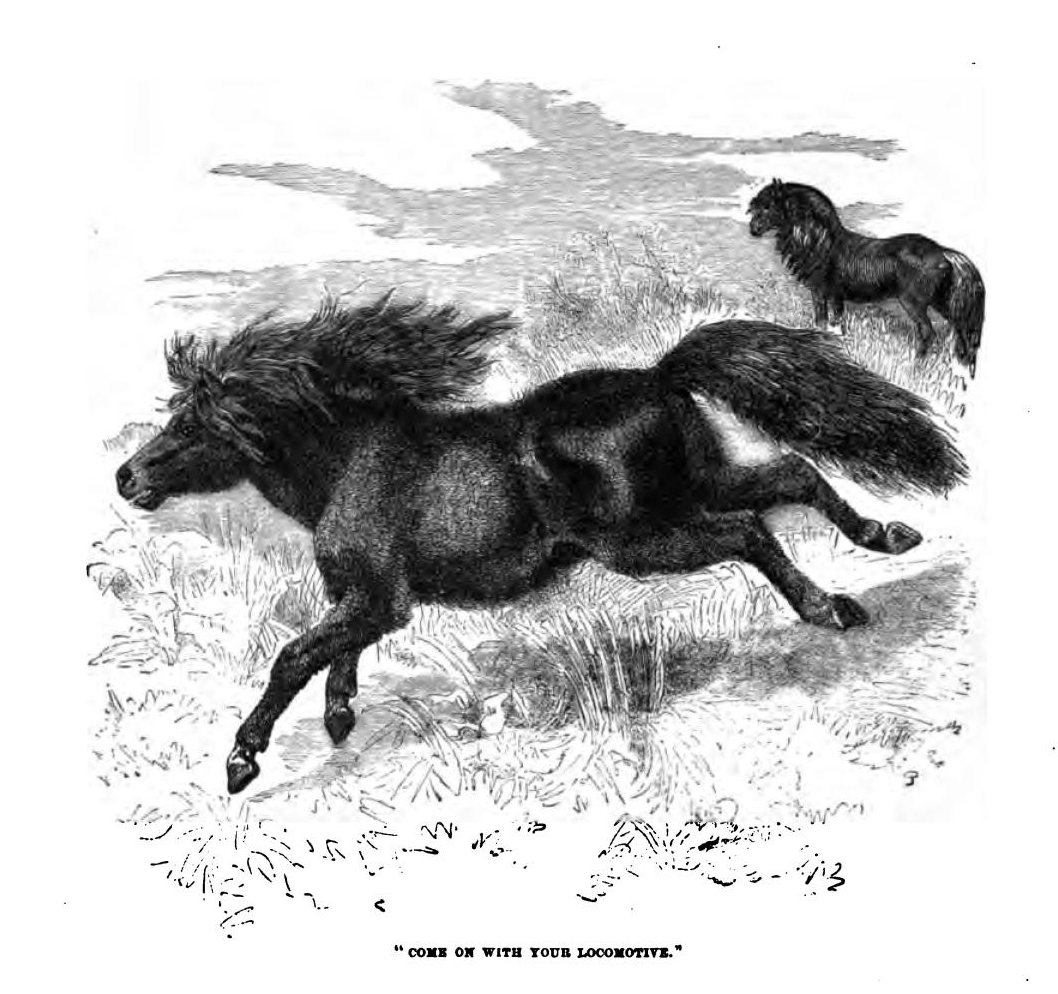

Charley's mention of the friendship between a horse and a cat naturally turned the conversation in the direction of cats, and led to several stories about those domestic favorites. We will give some of these anecdotes in the next chapter. Before the conference broke up, George asked a question which he had seen in a newspaper: “Is there any future life for animals?”
Mr. Graham said he had never given the subject a thought, and had no opinion to offer. He read the following, which was written for Our Dumb Animals by George T. Angell, in answer to the question, in the very words in which George had asked it:—
“We answer, John Wesley, the founder of Methodism, thought there was. So did those eminent Christian Bishops, Jeremy Taylor and Butler. Coleridge advocated it in England, Lamartine in France, and Agassiz in America. Agassiz, the greatest scientist we ever had on this continent, was a firm believer in some future life for the lower animals. A professor of Harvard University, has compiled a list of one hundred and eighty-five European authors who have written on the subject. Among the leading clergy in Boston, who have publicly expressed their belief in a future life for animals, are Joseph Cook, Trinitarian, and James Freeman Clark, Unitarian. Some years ago a man left by will for Mr. Bergh's Society, a hundred and fifty thousand dollars. Relatives contested the will on the ground that he was insane because he believed in a future life for animals. The judge, in sustaining the will, said that he found that more than half of the human race believed the same thing.”
“Why do I love horses? Listen, and I will tell you,” said a gentleman, whom the author of this volume has known for nearly twenty years. He is a prominent man of business in New York, but modestly declines to have his name in print, so we will call him Mr. A..
“When a boy, living at home on a Vermont farm, my father owned a pair of spirited grays, one being a special pet, never seeming weary and never refusing to go anywhere or to do any service asked of him. His mate was of the other sort, sulky, ugly, and a thorough shirk. My pet had formed a strong personal attachment for me, would always whinney when he heard my step, in fact seemed to have the love of a dog for his master.
“Coming down the mountain with a heavy load, by a road plowed out for a single track, and snow three feet and more deep on either side, we met an old gentleman and lady in a single cutter, who could not or thought they could not, turn from the road to allow us to pass.
“The off horse, the ugly one, refused to turn into the snow, and I stepped forward of him, taking him by the head, standing in the snow half my depth. Instead of accepting my invitation to follow my lead, he reared and came down upon me, throwing me on my back, with my head just out from under his chest, both of us lying at full length in the snow.
“Now my pet showed his love and that he saw where the trouble lay. Taking his mate by the side of the lip in his teeth, he lifted him up upon his fore feet, then supposing his duty done, let go his hold, when at once the rascal came down again, this time with one knee upon my chest, nearly crushing it in, and making breathing almost impossible.
“The old gentleman and lady screamed, and I feared fright of my horses would be an added danger, but instead, no wise man's head was ever clearer as to duty in time of danger, than was that of my equine friend. Taking his mate again by the side of his lip and with a strong grip of his teeth, he lifted and held him sitting on his haunches as a dog would have done, and with one fore foot bowed out on either side of me. Getting hold of the harness I dragged myself from under my captor, when Billy showed in no doubtful manner that he meant all he had done. His whinney was like a cry of joy. He called to me, danced, rubbed his head against me, and showed plainly as language could have done that instinct and love had joined in saving my life. Was it reason or instinct or inspiration.
“It seemed like a dog's thoughtful, unselfish love, but in the story of horses, I have never known such devotion. Now you know why I love horses, and why cruelty to one of them is, to me, like a cruel injury to a true friend.”
A lady, with whom the author of this volume is well acquainted, writes as follows on this subject:
“I think that blinders ought to be abolished by law, but if we cannot get rid of them that way, every friend of the horse should exert all possible influence to induce people to abandon their use. When I first obtained my horse 'Tatters' he had never been driven with an open bridle, and had never been used under a saddle, but he had the reputation of being exceedingly gentle and afraid of nothing except the steam railways and the elevated cars. The statement was correct, as he would stand up and strike toward them with his front feet, snorting and trembling in great terror. I needed a horse both for riding and driving, so I ventured to try him under the saddle before purchasing.
“I am not a very fearless person, as you know, so I went through all the prescribed rules laid down for horse-breakers, such as giving him the saddle to smell and examine before placing it on his back, putting the skirt of my riding habit under his nose to rub with his upper lip and feel of in his own way, which he did very thoroughly, taking about seven minutes before he seemed entirely satisfied. After mounting and riding round the ring once, I feared Mr. 'Tatters' was balky, for if I wanted him to pass between other riders he would stop suddenly and refuse to move on until a space of six or eight feet was made for his horseship to pass, then he would trot along quietly until the same thing occurred, and so on, until I bethought me that perhaps he was under the impression that the carriage was behind him. I then wheeled him around two or three times in as small a space as possible, at which he showed considerable fear and he kept a sharp look out for splinters.
“After about two weeks of this performance daily a fine afternoon tempted me to a ride in the park. Then the question of 'blinders' came up, and each of the 'horsey' people at the stable contributed his quantum of caution to the effect that Tatters would shy at everything and run away for nothing the first time he went out and saw much, but I argued there was no help for it; one could not put blinders on a saddle horse, and there was a heap of courage in remembering that Tatters had not worn blinders when he went to the blacksmith's to be shod.
“I shall never forget the delightful afternoon we—Tatters and I—had. Tatters enjoyed the prospect of the fun—turning his head from side to side, and every little while heaving a great sigh of satisfaction which every lover and owner of a horse recognizes and understands.
“Our usual run now is around the reservoir and park, then up to Macomb's Dam bridge. Glad of company when it is congenial, good company for each other when alone. One day, being with a friend who wished to ride over to the Riverside Drive, I assented, forgetting for the moment that we must pass under the elevated railway in order to get there from Seventh Avenue and One Hundred and Twenty-fourth Street. Fearing ridicule, I would not turn back after assenting to the proposition; so, taking an extra firm grip of the saddle and with a good deal of thumping in the region of my watch-pocket as we approached the dredded object, and assuring Tatters in the sweetest tones possible that 'Nothing will harm the boy! Missis wouldn't let anything hurt her Tatters,' etc. etc.—imagine my surprise when Tatters, after looking up at the passing train and then turning his head first to the left and then to the right, seeing where the train and the noise came from and where it went, quietly walked along under it perfectly satisfied.
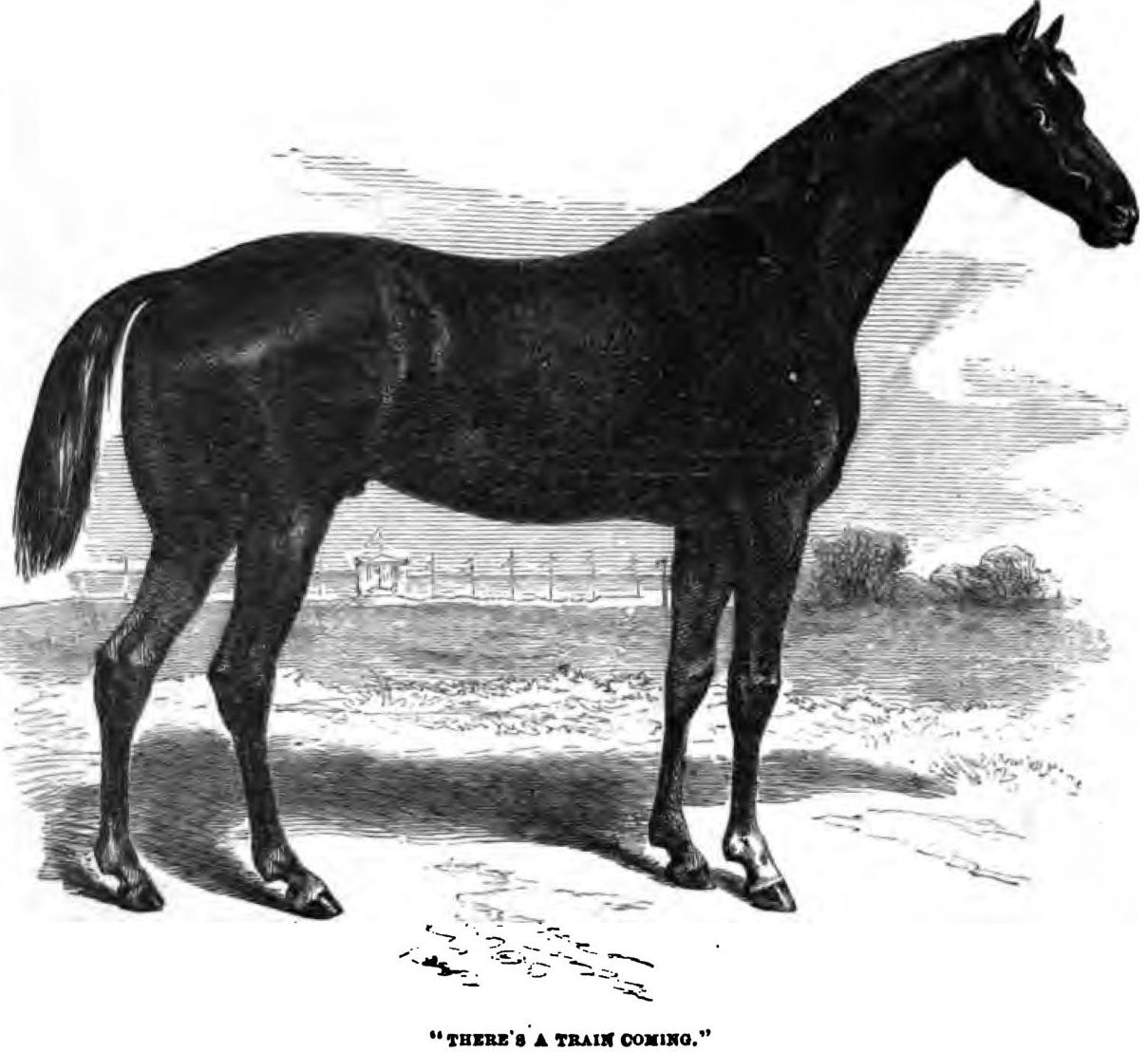

“I at once made up my mind that if he could see the objects which worried him we should get along better together, so I determined that I would take the blinders off the next time he went in harness. The people at the stable where I keep him tried, in every way, to discourage my doing so. 'He will be scared and run away when he sees the carriage behind him, and will kick and smash it to pieces.' 'It will never be safe for you to do it.' 'He will see everything at the side of the road, and you can't drive him at all that way,' and so on, without end. But; I had a woman's obstinacy and determined to try him.
“When they found I would have my way they said I must have him handled by a trainer and driven in a breaking cart until he was accustomed to the open bridle.
“So it was arranged, and I made an appointment with the trainer. Tatters was harnessed into the breaking cart, and with a good stout kicking strap attached. Then the trainer—looking as though he dreaded the job—took the reins and mounted the seat—carefully watched by about twenty grooms, who had come out on the sidewalk to see the fun, and were offering bets on the result. The trainer drove from Fifty-ninth Street up the Boulevard about a dozen blocks and back again, passing under the elevated trains each time. Tatters never behaved better in his life. 'Now,' I said, after walking him around the phaeton with the top first up, and then down, 'harness him into it and drive him up the Boulevard and back again,' and the trainer did so, with the same result. Then I got into the phaeton alone and drove around Central Park and up over the bridge at the end of Seventh Avenue, and Tatters never showed the least alarm, and he did not worry and sweat when going fast, as before; but, on the contrary, seemed to enjoy the novelty. He has never been driven with a blind bridle since, and never will be as long as I have him. He certainly goes better than ever before, he is no longer afraid of the trains on the elevated railway, he used to be scared when bicycles came up alongside of him, and now he pays no attention to them.
“It seems to me that when a horse can see anything properly he doesn't mind it half as much as when he hears a noise and can't see what is making it. Horses are slow in understanding, but once convinced they never forget. When we are near a railway or anything else that is likely to frighten him I talk to Tatters and let him take his own time to see what it is, and then he concludes he isn't to be harmed, and pays no attention to it the next time he sees it. He is a great pet; he eats out of my hand and is very careful not to let his teeth harm me, he recognizes my voice, points his ears and whinnies whenever I go into the stable and say, 'Where's my Tatters?' He appreciates every little kindness, and seems to try to do his best to please me. We are great friends; I always try to understand what he is thinking about, and act accordingly. No one can win the confidence of a horse without being kind to it, and above all—-patient.”—S. A. D.
Cats Among the Ancient Egyptians—Feline Peculiarities—Prince Krapotkine's Cat—Sailor s Superstitions About Cats—How a Cat Asked for a Surgical Operation—Steamboat Cats and their Travels—Display of Feline Gratitude—The Cat that Gathered Apples for Its Master—Putting Out a Fire—Cats as Foster-mothers for Rabbits, Foxes and Other Small Animals—Fishing with Hook and Line—Superstitions of Cats—Fashionable Cat Parties—How Dan saved the House from Burning—A wonderful Troupe of Performing Cats—The Lesson of Kindness to Pussy.
As intimated in the last chapter, cats were the subject of conversation between Mr. Graham and his sons, after the story of the horse that lifted the cat out of his manger when he wanted to eat his oats.
Several feline anecdotes were related, and then the further consideration of the topic was postponed until the next evening, when Mr. Webb formed one of the party. Henry Johnson happened in during the course of the evening and contributed his share to the general fund of entertainment.
“Cats are among the earliest animals domesticated by man,” said Mr. Graham, “but possibly they are ante-dated by the horse and dog. We find these three animals appearing on the sculptures and paintings of the ancient Egyptians, by whom cats were held in the highest reverence. Temples were erected in their honor, their bodies were mummified after death, sacrifices and devotions were offered up to them, and it was customary for a family to shave off its eyebrows whenever a cat died in its house.”
“Superstitions concerning cats have descended to the present time,” Mr. Webb remarked, when Mr. Graham paused. “In the Middle Ages, they were supposed to be the familiars of witches, and a black cat was an object of dread rather than of veneration, as it was supposed to be the embodiment of Satan. Sailors formerly had a dread of cats on shipboard, as a sign of ill-luck, and to a considerable extent this belief continues among them to-day. Many people predict rain when they see a cat washing its face, and a cat-call on a housetop is by some persons held to be a sign of death. It was a current belief in the Middle Ages that a cat had nine lives, and the saying is a common one how. The prevalence of this belief has been the cause of a great many cruelties inflicted on this graceful animal.
“Cats do not usually attach themselves to persons,” continued Mr. Webb, “their preference being rather for places than individuals. This preference gave rise to the belief, which was endorsed by Buffon and other naturalists, that the cat is incapable of affection, and retains in its domesticated state its savage ferocity, which is merely disguised by cunning and restrained by selfishness. But there are many stories told, on perfectly good authority, to illustrate the affection of cats for their owners and friends, though it is proper to say that instances of personal affection are far less numerous in the cat than in the dog.”
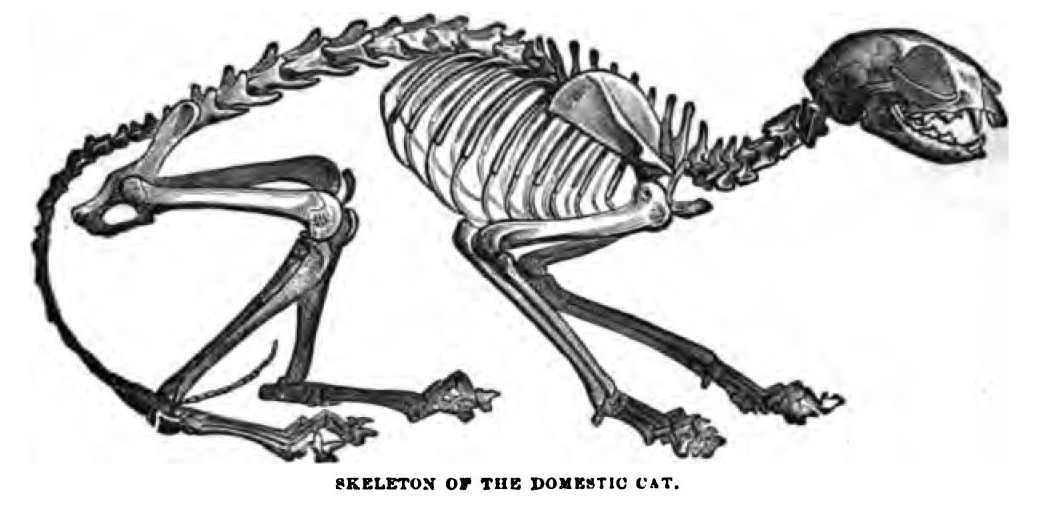

“Dr. Johnson and Southey were fond of cats,” said Mr. Graham. “Southey declared that no house was properly furnished without a child rising three years and a kitten rising three weeks. Lord Chesterfield left a sum of money for the support of his favorite cat, Prince Krapotkine, like other famous captives, has a prison pet—a cat,—which has been a jail bird almost from its birth, and has grown to be a great favorite with the Prince. Like Sir Walter Scott's cat, this cat can do everything but talk.”
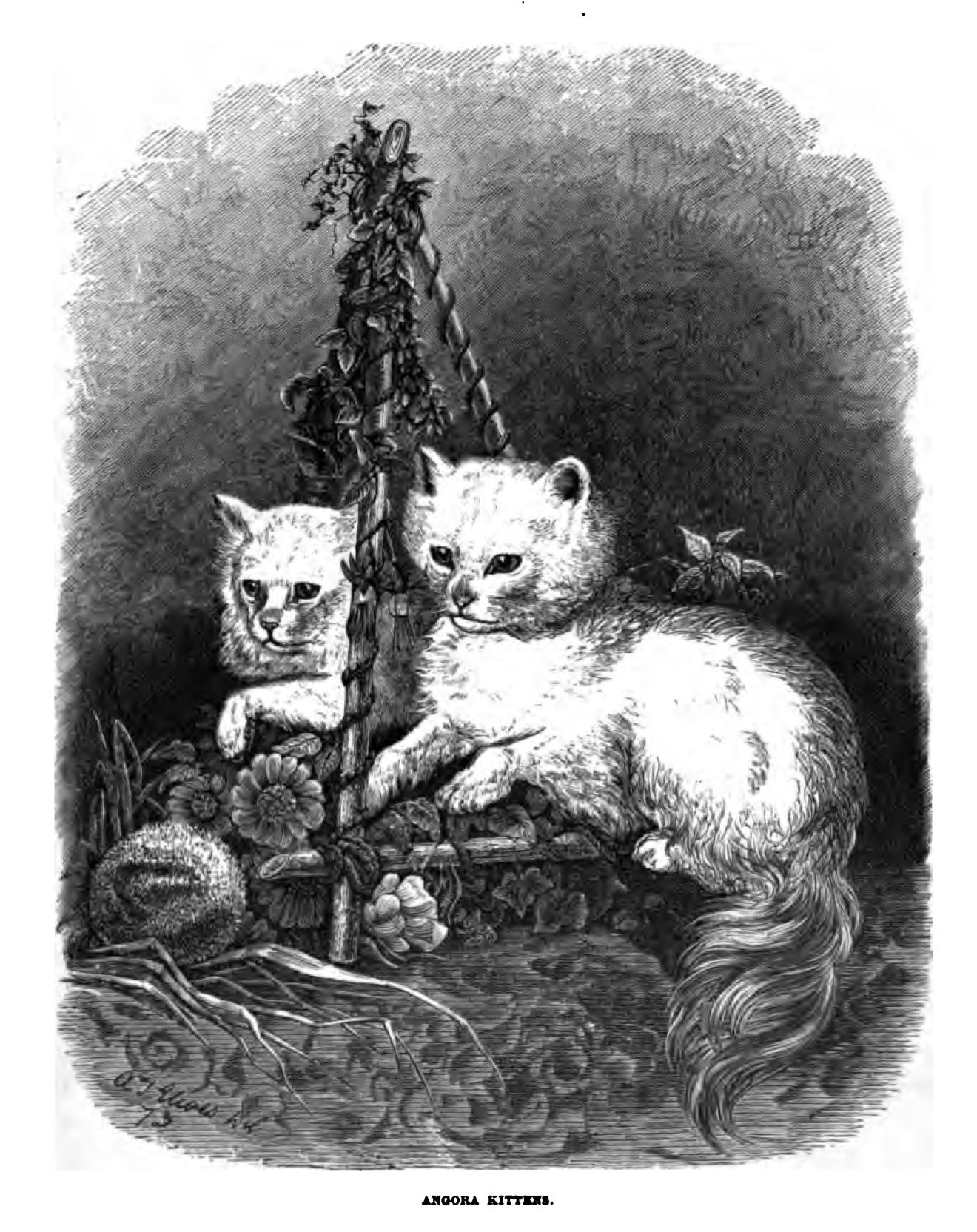

Mr. Graham then read the following from Prince Krapotkine's story of his prison life:—
“When the cat wants my door opened, it does not mew, it stretches itself to its full length and shakes the latch with its paw. If the door had another kind of fastening, it would certainly open it by raising the latch. It knows perfectly well the meaning of all the bells which ring in the prison—that to bid the inmates to rise in the morning, that which sounds before soup is served. Its dictionary is very limited, but it understands perfectly the meaning of the words it knows. Thus, in the evening when I walk in my room, it performs all sorts of gambols, and by making certain special sounds, endeavors to make me play with it at hide and seek—it plays this game exactly as children do, and insists that each party should hide in his turn—or to draw a string along for it to run after. If, in reply to its invitation to play, I say to it, 'What do you want? Food? Drink?' it is displeased, and goes with a sulky air to sit behind my little stove. But when I say, 'the string?' it replies immediately by two sounds, concerning the affirmative tone of which there can be no doubt. I could relate other instances of sagacity, but I do not wish to impose upon the credulity of your readers.
There is, however, an interesting point which it would be well to have cleared up. Are cats susceptible to music? Without being able to affirm positively, I believe they are. When my cat was little, it several times seemed to us that it found a real pleasure in listening to some air of a pleasing cadence. For example, the waltz from Faust, provided it was sung by a very high and pure voice. We even thought that music caused it to assume almost a sentimental air. It is unnecessary to say that my cat, like all others, is very susceptible to caresses, and, for I must confess its faults, to flattery. In general, cats are less intelligent than dogs, but, by care and attention, their intelligence can be highly developed. I am sorry that I have not sufficient time, or I should undertake the education of my cat by a system of cards, as proposed by Lubbock.”
“Speaking of sailors' superstitions about cats,” said Mr. Webb, “a lady told me not long ago that she bought a Persian cat in Calcutta and brought it home on a sailing ship. Every time they were becalmed the sailors would try to get her cat and throw it overboard, for they think that doing so would raise a wind.
“This is an old superstition of the mariner. It would be hard to say how it originated, but it is probable that it was originally intended as a sacrifice to Neptune, the god of the sea; as on land the gods were propitiated by the offerings of the devout, so Jack sought to calm the sea god's fury by offering him a cat. The old sailor, even in this meaning of the word 'cat's-paw.' It is simply a quaint idea of the marine, who sees in the sudden and peculiar zephyr that ruffles the water, a resemblance to the frolics of the cat. Does pussy jump around good-humoredly there will be a good breeze and fair. But when she arches her back and swells her tail, then look out, for her scowling look will be as a calm to the storm it foreshadows, and the flashes from her eyes but as sparks to the blue streaks of zig-zag lightning which will certainly soon illuminate the sky.”
“I've a story about an intelligent cat that belonged to a doctor,” said Charley. “I found it in the Tribune; it is dated at Deposit, and signed O. T. Bundy.”
All listened while Charley read the following:
“My cat, which we knew by the name of 'Peter,' was a sufferer from a large abscess on the lower jaw, directly underneath. I attempted to lance it, with what proved to be a broken pointed instrument. He cried while the attempt was being made, but did not run away from me, advanced age, regards the cat as a veritable weather gauge. The old landsman is often puzzled to account for some of the strange sea terms, and questions are often asked as to the although I did not hold him, or try to. Of course I failed to introduce the instrument into the sore, and showed what I held in my hand. I then took a sharp lance from the case and showed it to him.
He came up directly to me and raised his head in such a way that the sore was exposed, and held it in this position until I had completely opened the abscess and withdrawn the lance, not crying or offering to go away from me. Now the blunt tool was torture, and it gave him no relief, yet he must have thought from my talk and manner that relief was intended, or he would never have held still for the second trial.”
“Here's a story about a steamboat cat,” said George, “which was written by somebody for the New Orleans Pickayune.”
“In July the steamer. Golden Rule arrived here from Cincinnati. A little common gray cat lived on the boat, that had been left at Bayou Sara, by accident. She had stepped on the wharf boat and had not returned in time. The officers on the Golden Rule felt sorry to lose her, for she had left three little kittens behind, who missed their mother sadly. But, to the surprise of all, the next boat that arrived down brought puss as a passenger or stowaway. She remained on board in her new quarters till near midnight, then made her way to the Golden Rule.
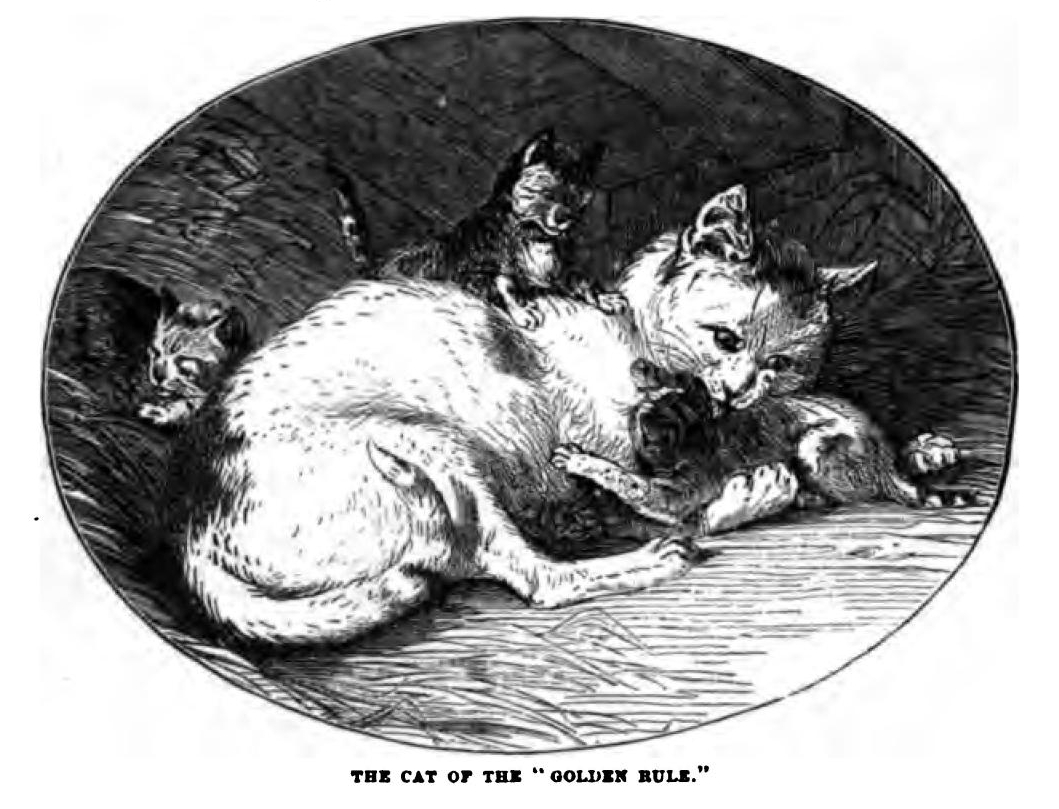

The watchman saw her come on board and witnessed the happy meeting between the kittens and their mother. I was a passenger on the boat as she returned to Cincinnati that trip, and puss was quite a heroine. But, alas, the temptations to visit wharf boats was so strong that she got left behind again, somewhere on the Indiana side of the Ohio, I have forgotten the town. Real grief was manifested by her friends when they missed her; they thought she was lost to them forever. On their arrival at Cincinnati, the steward left the boat, and the kittens disappeared with him. Three or four days afterward the Ariadne arrived from below, and the gray pussy came up on her. No one knows how she found out that boat was bound up the river instead of down, for other boats had stopped at that place, but only this one going up to Cincinnati. Puss was soon installed in her old home again, but the kittens were gone, and she was lonesome; so she went out on the wharf-boat and found a poor, forlorn kitten nearly as large as herself. This she carried in her mouth up into the cabin of the Golden Rule and placed it on a chair, and insisted that it should be noticed and caressed, nor would she eat until it was supplied, and she had it with her last winter.”
“That steamboat cat reminds me of one in New Haven,” said Henry, who felt that it was his turn to tell a story. “I found the anecdote in the New Haven News:
“'A curious story is told of a cat which lives on the Starin steamboat dock. The cat will occasionally take a notion to visit New York, and if driven off the boat at one place, will be seen to jump on at another, in time to avoid getting left. She will stay in New York two or three days at a time, and when her visit is concluded, will return and remain contented in New Haven for a season, until the fever for traveling comes on again. The persistency and ingenuity of the cat in boarding the boat for one of these journeys excites wonder, as the cat has a family of kittens living in New Haven. These kittens appear to be resigned to the temporary absence of their mother, but are always glad when she gets back from New York.'”
“There are many instances of the display of gratitude by cats,” Mr. Webb remarked. “One of the best I know of is told by a lady in California, as follows:
“'My cat, with regard to his meals, is a most grateful cat, and, however hungry he may be, he never thinks of eating until he has purred his thanks and rubbed his head against my hand. This trait of character was once displayed in the most affecting manner. One day 'Pret' had been shut up in the loft, on account of a lady visitor who had a strange antipathy to cats. I was going to town that day, and did not return until after midnight. As I was going upstairs I heard 'Pret's' voice calling me in a very anxious manner, and, on inquiry, I found that the poor cat had been forgotten, and had been shut up all day without a morsel of food or a drop of milk. Of course I immediately procured some milk and meat and carried it up to him. The poor creature was half wild with happiness when he heard my footsteps, and on seeing the plate of meat and saucer of milk he flew at them like a mad thing. But scarcely had he lapped a drop of milk when he left the saucer, came up to me with loud purring, and caressed me, as if to express his thanks. Then he went to the plate, but only just touched it with his nose, and again came to thank me for having attended to his wants, both of food and drink. It quite brought the moisture to my eyes to see the affectionate creature, though nearly wild with hunger and thirst, refrain from enjoying his food until he had returned thanks.'”
Mr. Graham said the Californian story reminded him of a Connecticut one, that appeared a short time before, in a New Haven paper. The story was that Mr. George Baldwin had several apple and pear trees, and last fall his cat awoke to the fact that these trees bore fruit which his master's family liked to eat.
One day in October, the cat's owner was surprised by the action of his pet. The animal was walking slowly about one of the trees, stopping every minute or two to gaze up at the apples on the boughs. After completing its tour of inspection, the cat climbed the tree, and slowly made its way out on a limb toward what was probably the ripest and largest apple of several bushels of fruit on the trees. When it reached its goal, the animal made several attempts to break the stem with its teeth, and finally succeeded. It had taken care to bite off a bit of the stem long enough to be securely held, and with its prize in its mouth the cat began its descent. Once on the ground, the apple was carried to a porch and laid by the side of a door opening into the house. The exploit was frequently repeated by Mr. Baldwin's sagacious puss, and the side of the porch was usually lined with apples.
“Did anybody ever hear,” said Charley, “of the cat that shared its dinner with its master?”
Nobody had heard of this wonderful cat, thereupon Charley read the following from the Manchester Times:
“A member of the Zoological Society says: I once had a cat who always sat up to the dinner-table with me and had his napkin round his neck, and his plate and some fish. He used his paw, of course, but he was very particular, and behaved with extraordinary decorum. When he had finished his fish I sometimes gave him a piece of mine. One day he was not to be found when the dinner bell rang, so we began without him. Just as the plates were put round for the entrée, puss came rushing upstairs and sprang into his chair with two mice in his mouth. Before he could be stopped he dropped a mouse on to his own plate, and then one on to mine. He divided his dinner with me as I had divided mine with him.”
There was a laugh all around over this amusing incident, and when it subsided, George asked what became of the mouse which the cat put on its master's plate. History seemed to be silent on that point, but whether the youth supposed the dainty was or was not devoured by the gentleman, we will not inquire. The subject was not discussed, as the attention of the party was next turned to a cat that put out a fire. The incident happened in Monongahela, Pa., and was as follows:
A family went out to a meeting, leaving Master Tom, a favorite cat, in sole occupation of the house.
On their return the cat's actions led to an examination, when his feet were found to be blistered. The sitting-room served to explain matters. A live coal had been thrown out and set the carpet on fire. Puss had evidently clawed out the fire for a considerable distance about the spot burned, leaving nothing but a center of ends, charred and frizzled. All the circumstances indicated that the cat had put out the fire.
“Cats are very fond of valerian,” said Mr. Graham, “and I have heard of a woman in St. Thomas who turned this fact to practical use.”
“How was that?” queried Mr. Webb.
“She detected the odor of sewer gas in her parlor,” was the reply, “and as the landlord from whom she leased the house would not believe in the existence of the gas, she hit upon a device to convince him. She first poured a quantity of valerian down the pipe of one of the basins in the upper story. The odor of valerian presently filled the parlor below. Procuring two cats she turned them loose in the parlor. They immediately evinced delight at the odor, and ran to an adjoining closet where it was strongest. They finally jumped upon a shelf in the closet, and there, by their contentment, showed that they had traced the odor to its source. The householder sent for a plumber, who, removing the lath and plaster, discovered a leak in the pipe which communicated with the sewer.”
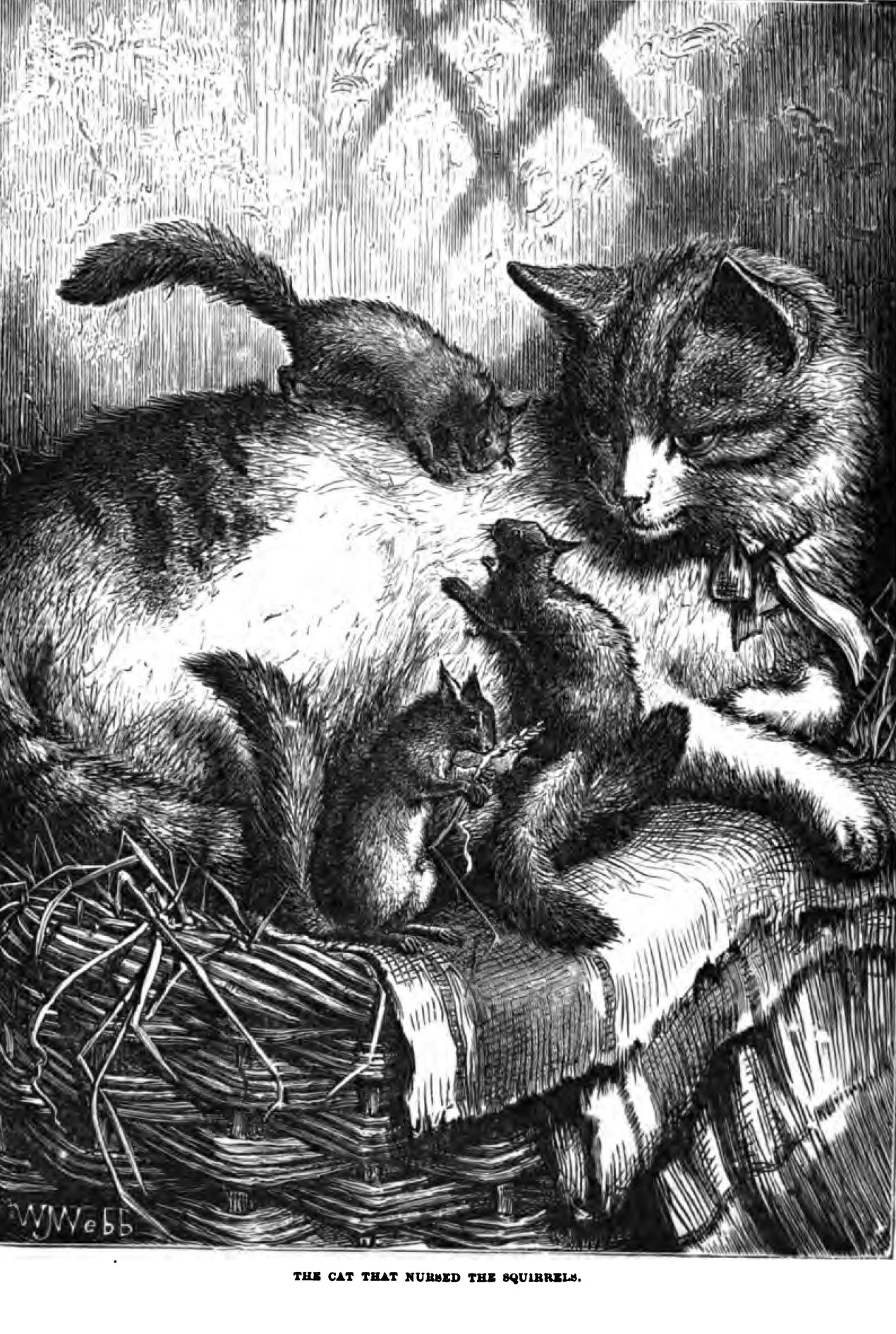

Feline peculiarities were discussed at the conclusion of the foregoing story. Some one told about a cat in Missouri, which had four kittens, and one day she went into the woods and brought in two young rabbits, which she added to her family. She licked and caressed the little rabbits, just as she did her own kittens, and the new comers got along with the others on perfectly friendly terms.
Then somebody else told about four young foxes in Indiana that have been adopted by a cat. She seems to manifest as much maternal solicitude and motherly fondness for them as though they were her own. The foxes have accepted the situation in a spirit of meekness, and are seemingly satisfied. This was followed by a story of a cat whose kittens had been drowned; she found three young squirrels that she adopted and tenderly nursed.
“That is not so strange,” said Mr. Graham, “as the performance of a French cat, which I read about in the Revue Scientifique. One day the cat came into the house, having in its mouth a sparrow, caught in the neighboring garden. Scarcely had puss entered the room when she let the bird free, evidently for the purpose of playing with it, as is the custom of cats with mice before devouring them. The sparrow, having one of its wings injured, could not escape by flying, but boldly began to attack its huge enemy by fierce blows on the nose with its beak. The cat seemed astonished at the attack, and beat a retreat. From that moment the two seemed to forget their natural instincts and came to a mutual understanding. The truce continued and gradually grew to a fraternal friendship. They ate, played and slept together. Often they ran about the house, the sparrow perched on the cat's back, and sometimes carried gently in the cat's mouth, from which it was released on the first wish to be free. When feeding together, puss never touched a morsel till her friend had first partaken.”
“I read not long ago,” said Charley, “a story about a friendship between a cat and a rat. It was signed C. A. B., and appeared in Our Animal Friends. Here it is:
“'My cousin was much plagued by rats; they were so troublesome that every method was used to exterminate them. One day the cook thought she would try to scald them, and, watching her opportunity, threw a pail of boiling water, which covered the back of one, taking the hair and a portion of the skin off,—but he was enabled to reach his hiding place. Some days afterward a rat was seen eating from the same dish with the cat, having no hair on its back and appearing quite feeble. The cook called the attention of her mistress to the fact, and told the story of her throwing the scalding water some days before, and that the rats had ceased to be troublesome since.
“'Time rolled on, and it became quite an amusement to the family to watch for the coming of the rat, and the eating of its regular meals with the cat, and the little gambols indulged in together after eating.
“'In the course of the summer the family went on a visit, and closed their house for a few months, but made provision for the favorite cat, that she should stay with a relative in the same town.
“'Upon their return in the fall they called upon their relative for the cat, as the house was much infested with rats, and learned from them, that soon after they had left, an ugly-looking rat, without any hair on its back, made its appearance and used to eat with the cat, till one day one of the family killed it. Since that time they couldn't get the cat to eat anything, and she would not stop in the house, but had gone to a neighbor's. They caught her several times and brought her back, but she wouldn't remain with them.
“'My cousin, after hearing the particulars, became much interested, and chided herself for her thoughtlessness in not letting her relative know the curious story of the rat while making provision for the care of her cat. She went to the neighbor, but the cat would take no notice of her. She persevered and took the cat to her old home, but the cat wouldn't stay—off she would run to the neighbor she had selected as her friend. They got the daintiest food they could select, they coaxed and petted her, kept the door closed, and did everything they could to win back her confidence; but she wouldn't eat or taste a thing in the house, and they finally gave up in despair and allowed her to have her own way.
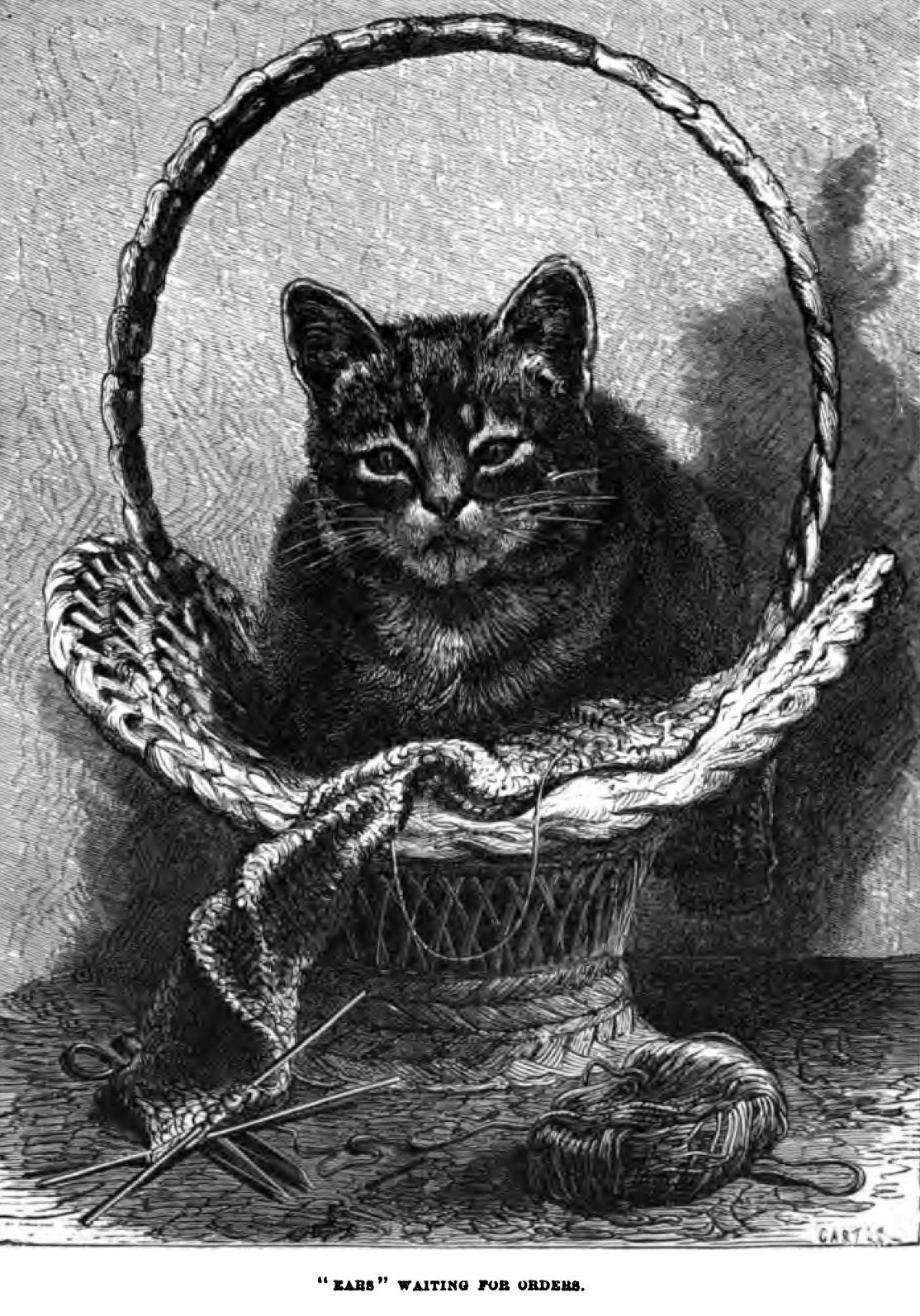

“'They never could get that cat to notice any one of the family or to come into the house again. Was this instinct?Was it reason? Was it a type of chivalry and grandeur in the animal not yet recognized by man?”
“Some time ago,” said Mr. Webb, “The New York World published a story about a cat that lived in Eighteenth Street, in that city, and was called 'Ears.' The World said of her:
“'She can fetch and carry like a retriever, and when her mistress throws a paper out of a third-floor window, Ears climbs into a basket fixed outside on a pulley, shuts the lid, and quietly lets herself down to the ground. Then she gets the paper, hides away in the basket and mews as a signal to be drawn up. She will play dead and alive and allow the wickedest boy alive to whirl her around his head by the tail. She takes a bath every day of her own accord and rocks herself to sleep on the back of a rocking-chair. The canary that lives in the same house uses her as a riding-horse, and every morning Ears gallops round and round the room with the bird on her back.'”
“I thought cats didn't like water,” said Charley, “and never took a bath except by accident.”
“They dislike water very much,” replied Mr. Webb, “as their fur has very little oil in it to resist the effect of moisture. I knew a cat at the Wawayanda Club, on Great South Bay, Long Island, that used to go into the water to catch small fishes; she didn't seem to mind the wetting, or rather she cared less for it than for a fish dinner. I read recently of a mill on a stream in South Carolina, belonging to a man named Pruitt. Pruitt owns a large cat that, as soon as the mill is stopped, by shutting down the gate, will immediately run down behind the mill and get on a log just over the sheeting over which the water is flowing. She will then look intently into the water, which is from eighteen inches to two feet deep, until she spies a fish; she then plunges into the water, frequently burying herself under it, but almost always coming out with a fish. She then sits quietly down on a rock near by and enjoys her meal.
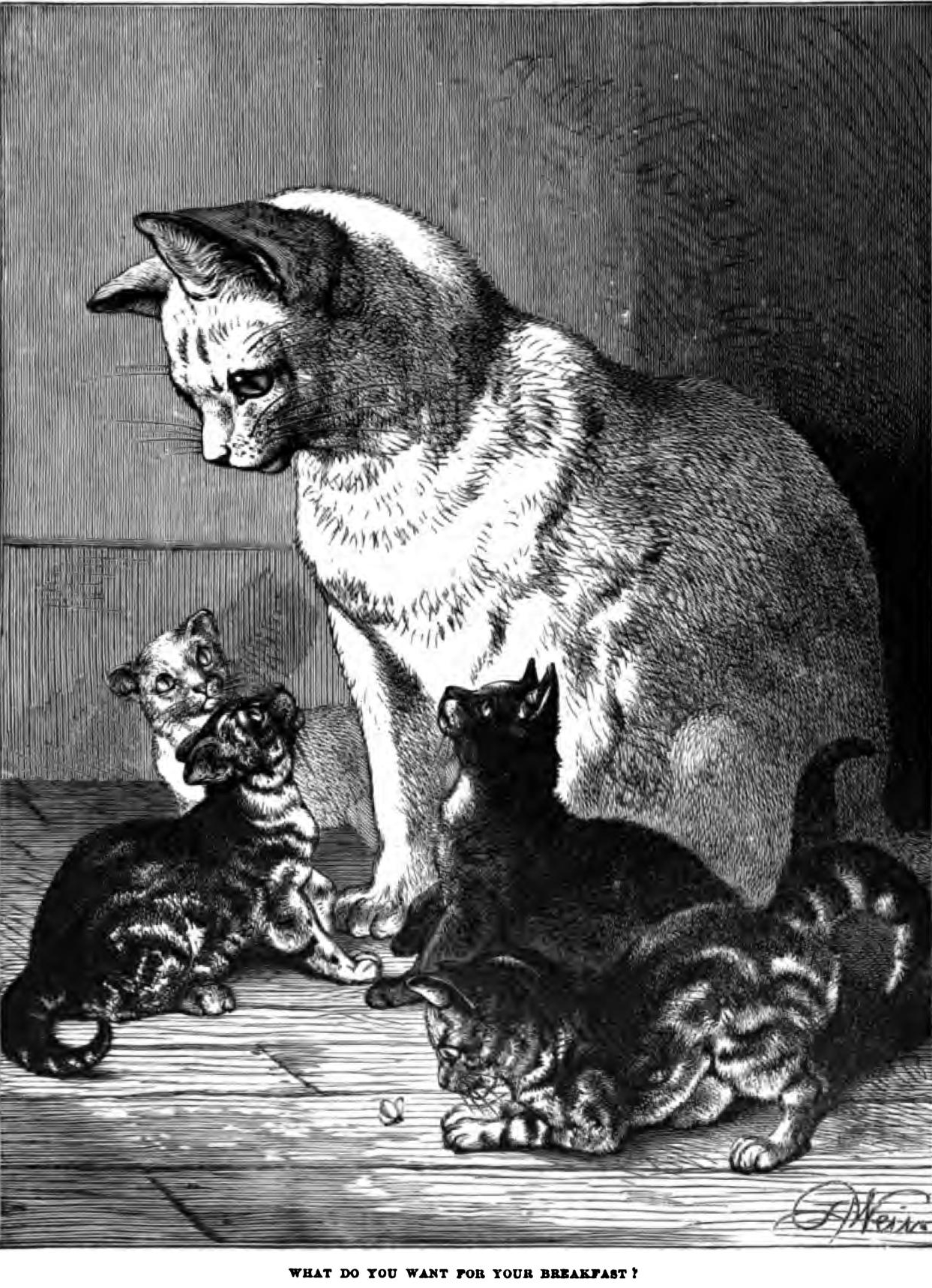

“A newspaper of Portland, Maine,” said Mr. Graham, “published a story some years ago about a cat that used to catch fish with a hook and line.”
“Of course every one laughed at the absurdity of the idea, all except Mr. Graham, who didn't relax the muscles of his face, but declared that he believed the story to be true. “And so will you,” he continued, “when you hear the details.”
“By all means give us the details, then,” said Mr. Webb.
“Well, this is the story as I remember it. The cat belonged in a counting house or office that was on one of the piers in the harbor and had a trap-door in the floor through which dust was swept. Fishes swam under the pier and the clerks in the office used to bait a hook and lower the line through the trap-door to catch a fish for the cat's dinner. She sat and looked on at the proceeding and very soon learned that the trembling of the line was the signal that a fish had been secured on the hook.
“One day the clerk who had baited the hook and set the line was busy at his desk when the line trembled and puss knew that the time to haul in had arrived. The clerk did not come promptly enough to suit her; so she seized the line and drew it up 'hand over hand,' or rather 'paw over paw.' The clerk looked on in surprise as she hauled up the line and secured the fish, and ever after that she was allowed to do her own fishing. She never got up to the ability of baiting the hook and setting the line, but she certainly did all the rest of the work. The newspaper that I read it in said hundreds of citizens of Portland had seen that cat take her own fish, and the story is so well vouched for that I have no doubt of its truth.”
“Cats are more skillful in the use of their paws than many people believe,” said Mr. Graham. “For instance, listen to the following:
“A clergyman, the Rev. R. Lane, at Claverack, Columbia County, that was once asked at a school examination; 'How many toes has a cat?' Can you tell?”
Charley shook his head and admitted that he didn't know. George and Henry were equally unlearned on that point, and the former asked how the question was answered at the school.
“Not one of the pupils in the school could tell,” said Mr. Webb, “and then the principal was applied to for a solution. He also, with a good-natured smile, gave it up, when one of the teachers, determined not to be beaten by so simple a question, hit on the idea of sending out a delegation of boys to scour the neighborhood for a cat.
“That brings up the question,” said Mr. Webb turning to the boys: the idea was announced, the whole class wanted to join in the hunt. Several boys went out and soon returned successful. A returning board was at once appointed, and the toes counted, when to the relief of all it was learned that a cat possesses eighteen toes, ten on the front feet and eight on the hind feet.”
“The Kingston Freeman writes as follows: 'There is a young lady in the town of Claverack who has a pet cat which she has taught to sit at the table, and with a napkin about its neck it takes meat from a plate with its paws as dexterously as an epicure. When given a piece of meat on a fork it will hold the fork in its fore-paws and take the meat from the tines, and when given a cup of milk it will hold up the cup and drink. The cat has a well-developed 'thumb' on each fore-paw.'”


“Cats are inquisitive,” Mr. Graham remarked, “and examine new things with a great deal of care. They are not altogether free from superstition and sometimes display great alarm at things they do not understand. Théophile Gautier tells of a cat he had which was a great pet and used to sit for hours and watch him at his work.
“One day Gautier brought home a parrot; the cat surveyed the bird carefully and evidently came to the conclusion that it was a green chicken. It showed no alarm whatever until the parrot spoke. Then a great fear came over the cat; it arched its back, enlarged its tail and fled in terror, and not for days could it again be persuaded to enter the room where the parrot was.
“It is not uncommon for cats to play with a soap bubble without appearing to be astonished or mystified by its sudden disappearance. In one case, however, puss was so demoralized at the mystery as to grow big-tailed, and spit at any soap bubble which might happen to fall to the floor and drift across it. Another, which up to that time had never seen a colored person, fled so precipitately from a good-looking negro girl, that it tumbled into a grating, from which it could not be coaxed until hunger overcame its terror; and the oddity of it was that puss herself was as black as a coal.”
“There is fashion in everything,” said Mr. “Webb, “and a New York newspaper says that cat-parties are the latest sensation. Recently a young girl, the happy possessor of a fine maltese cat, invited a number of her friends to bring their pet cats to five o'clock tea, each cat to have a ribbon about its neck, corresponding to that worn by its mistress. At the appointed hour the cats made their appearance, in charge of their respective owners. After the feline introductions had taken place, some of which were the reverse of friendly, games were introduced, and soft balls, toy mice and other objects dear to pussy's heart were provided. These pastimes, however, were sometimes marred by a vigorous slap, when two strangers came in collision, and once the belligerent pussies had to be separated by friends. When tea was announced, a table furnished with saucers of milk and small cakes, with cushioned stools, was disclosed.
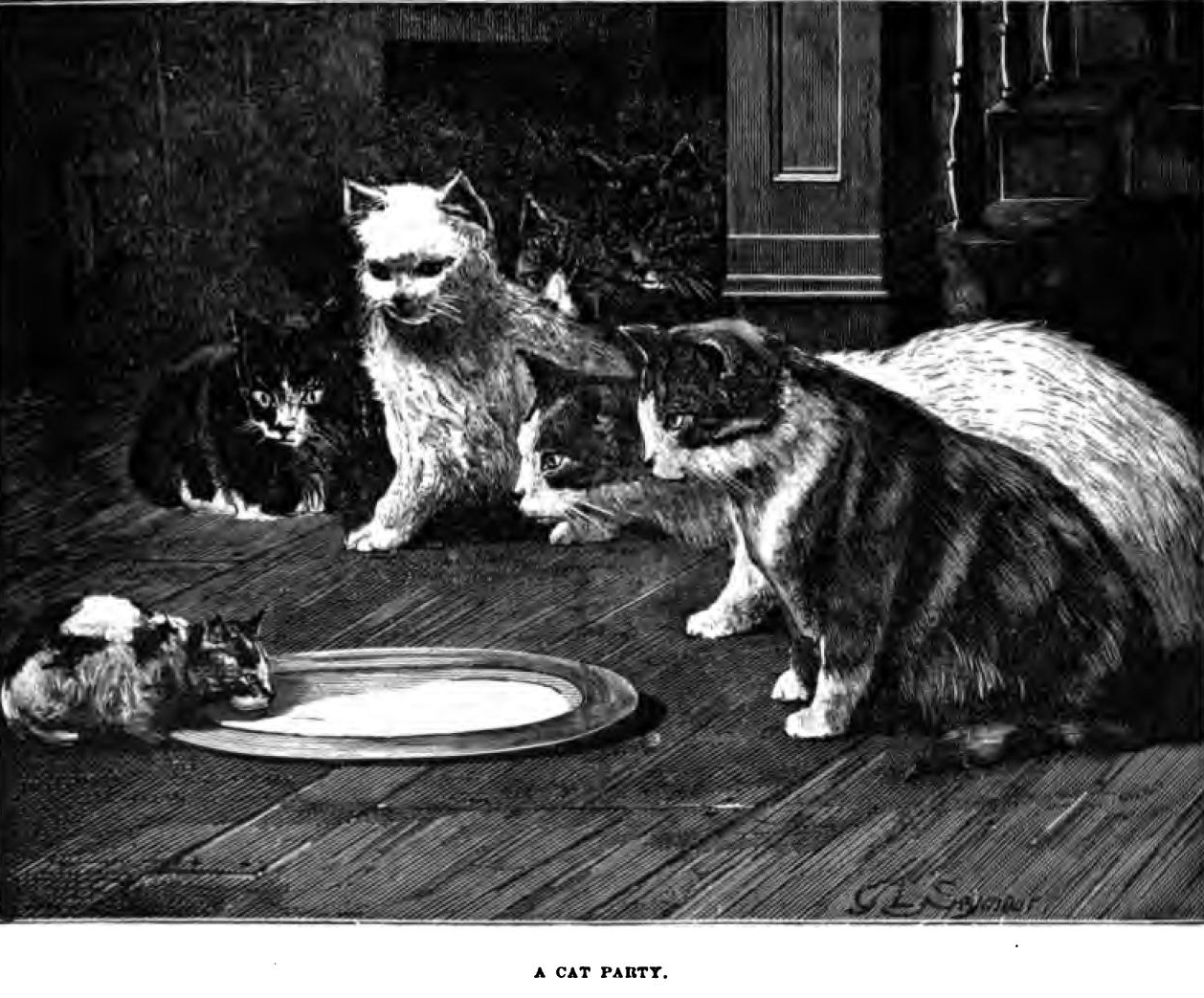

The floral decorations consisted of catnip, lavender, grasses, and bright flowers. The cats, placed on their respective stools, and attended by their mistresses, partook of the good cheer set before them. Their behavior was quite correct. With their fore-paws on the table, they lapped the milk with becoming propriety. When all were satisfied, there was a comical sight. Each pussy began making her toilet, and the face-washing was decorous in the extreme. After leaving the table a spray of catnip was given each kitty, and the feline happiness was complete. These sprigs were tossed in the air, caught, and lovingly caressed. As each kitty departed, it was presented with its ball or toy mouse as a memento of the party.”
“Before we separate,” said Mr. Graham, glancing at the clock as a hint that it was time to bring the conference upon felines to an end, “let me tell you of a cat that saved a house from being burned. His name was Dan, and he was the property of a little boy who was very kind to his furry pet.
The time came at last when Dan could repay this kindness; and he did so. One cold winter night all had gone upstairs to bed, and were sleeping soundly. Dan was cosily rolled up on his nice warm mat behind the kitchen stove, when all at once the room became very light. Dan awoke; and what should he see but the broom, which had been left standing a little too near the stove, all on fire. In a few moments the house would have been ablaze, but Dan thought of his master; so away he trotted upstairs to his room.
“Dan called with a very loud voice, 'Mew, mew, mew'; but his master did not hear him. Then he said, 'Mew, mew, mew,' still louder; but that did not awake him. Then he jumped upon the bed, pulling back the bed-clothes with his paw, and gently struck his master in the face. This aroused the sleepy boy, and he very soon learned the meaning of Dan's strange actions. He jumped out of bed, ran downstairs, and put out the fire before it had got under very great headway. The story was told afterward in the local newspaper and Dan became a hero in the place where he lived.”
A few more cat stories were told in spite of the lateness of the hour, and it was agreed in conclusion that cats greatly resemble dogs, horses and children, too, in being influenced by their surroundings, training and teaching. A child taught to be cruel, or to lie and steal in early life, is not likely to be a good or useful member of society. Horses and dogs are made vicious by bad treatment or gentle by kindness, and a cat's conduct will depend very largely upon its surroundings and education.


A writer in Harper's Young People gives the following interesting account of a wonderful troupe of performing cats at the Winter Circus in Paris:
“M. Bonnetty, the owner and trainer of these performing cats, believed, in spite of all opinions to the contrary, that puss belonged among animals of the highest intelligence. He collected cats of all kinds, and set patiently to work to educate them. The result has been wonderful, and puss has shown that when treated kindly she is capable of great things, and is a most willing slave, affectionate and gentle, and always ready to do her master's bidding.
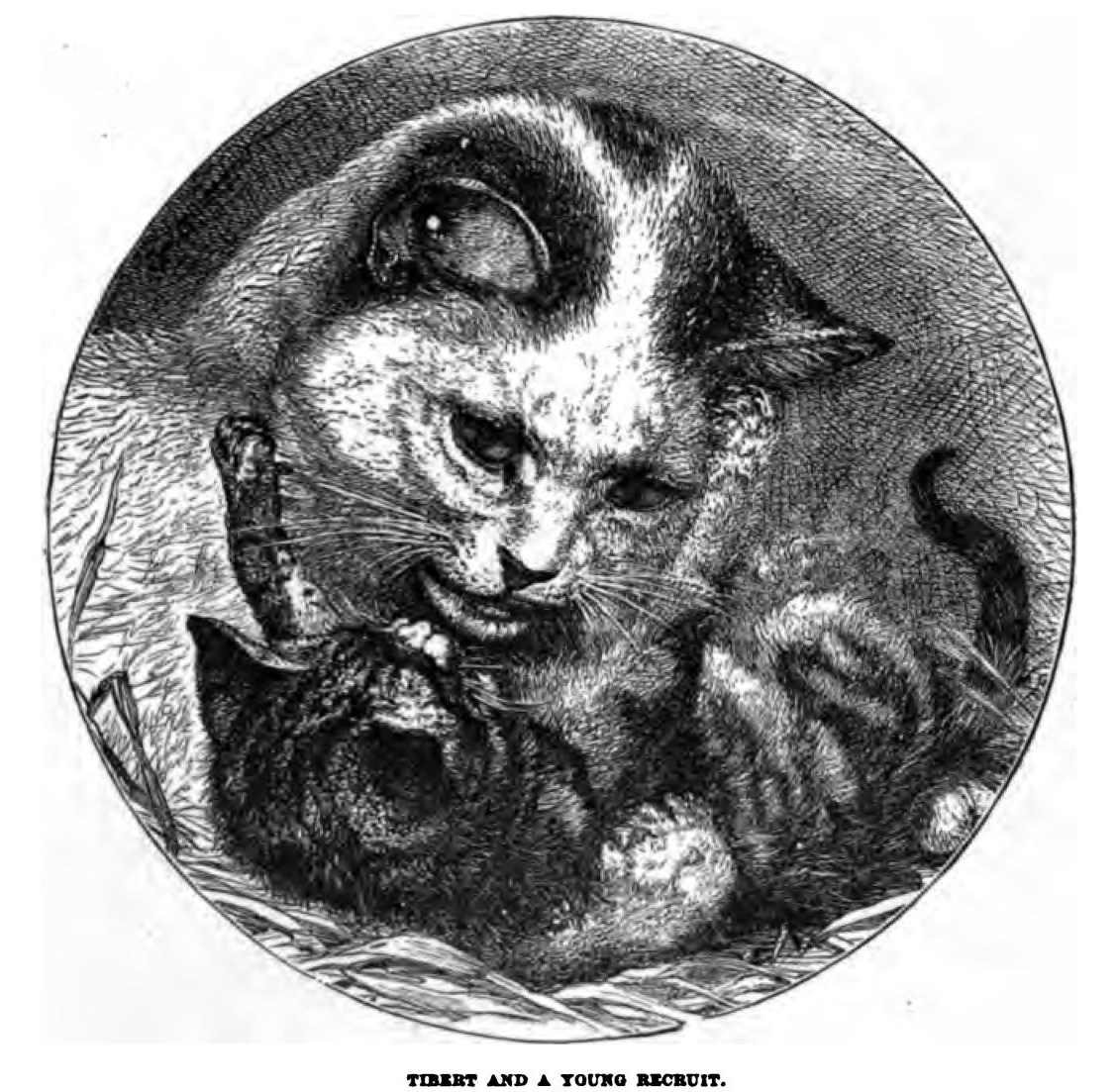

“M. Bonnetty never gives puss a harsh word or a blow, for those arouse her hatred, and she never forgets them. His work has been accomplished by coaxing and caressing. He usually begins the training with kittens, but he has had almost as great success with cats which have been several years old when they reached his hands. At first he keeps them in a large apartment for several months, feeding them and petting them until he has won their entire confidence and affection. Then pussy's education begins. The first exercises are very simple, such as jumping through a hoop and climbing a pole, until by degrees puss, obedient to her master's voice, will do every trick that a beast of her size is capable of.
“After a year's training the graceful creatures make their first appearance in public. This is the time of trial, for it sometimes happens that the little feline artist will perform beautifully when alone with her master, but will be frightened and confused by the music, the glare of lights, and the crowd of people at the circus.
“There are fourteen beautiful pussies in the troupe, and the tricks they do are wonderful. They play with mice and birds, holding them in their paws and even in their teeth without doing them the slightest injury; they jump through a blazing hoop held up by the trainer, perform graceful gymnastic exercises on the backs of thirty-two chairs placed in a row, march around in time to music like little soldiers, and group themselves in many graceful and comical attitudes. And the best part of it is that the pussies seem to take as much delight in their amusing capers as do the crowds of children who watch them; and when a thousand little clapping hands applaud them, they form in a row and look as pleased and proud as if they understood what it was all about. Perhaps they do.
“A gentleman who went with M. Bonnetty to visit the cats in the room where they live found them all sleeping in graceful groups around a glowing stove, for an educated cat loves heat as well as her more humble sisters, and cannot be kept in good condition without it. As the trainer and his friend entered the room fourteen pair of little eyes opened, little ears were pricked up on the alert, and the pussies arose, stretching themselves and purring, and at once crowded around their master, rubbing against him, and reaching up to be caressed, while one little white cat named Gora climbed up to his shoulder and nestled in his neck. 'Yes, they all have names,' said their master, 'and they know them. There are Juno and Brutus and Caesar and Mayor and Lucette and Boulanger—he's that large cat. He's as gentle and loving and playful as a kitten. You know every word I am saying, don't you, old fellow?' he added, as a beautiful, glossy tiger cat, with large liquid eyes, came forward purring and showing every sign of feline delight and satisfaction.
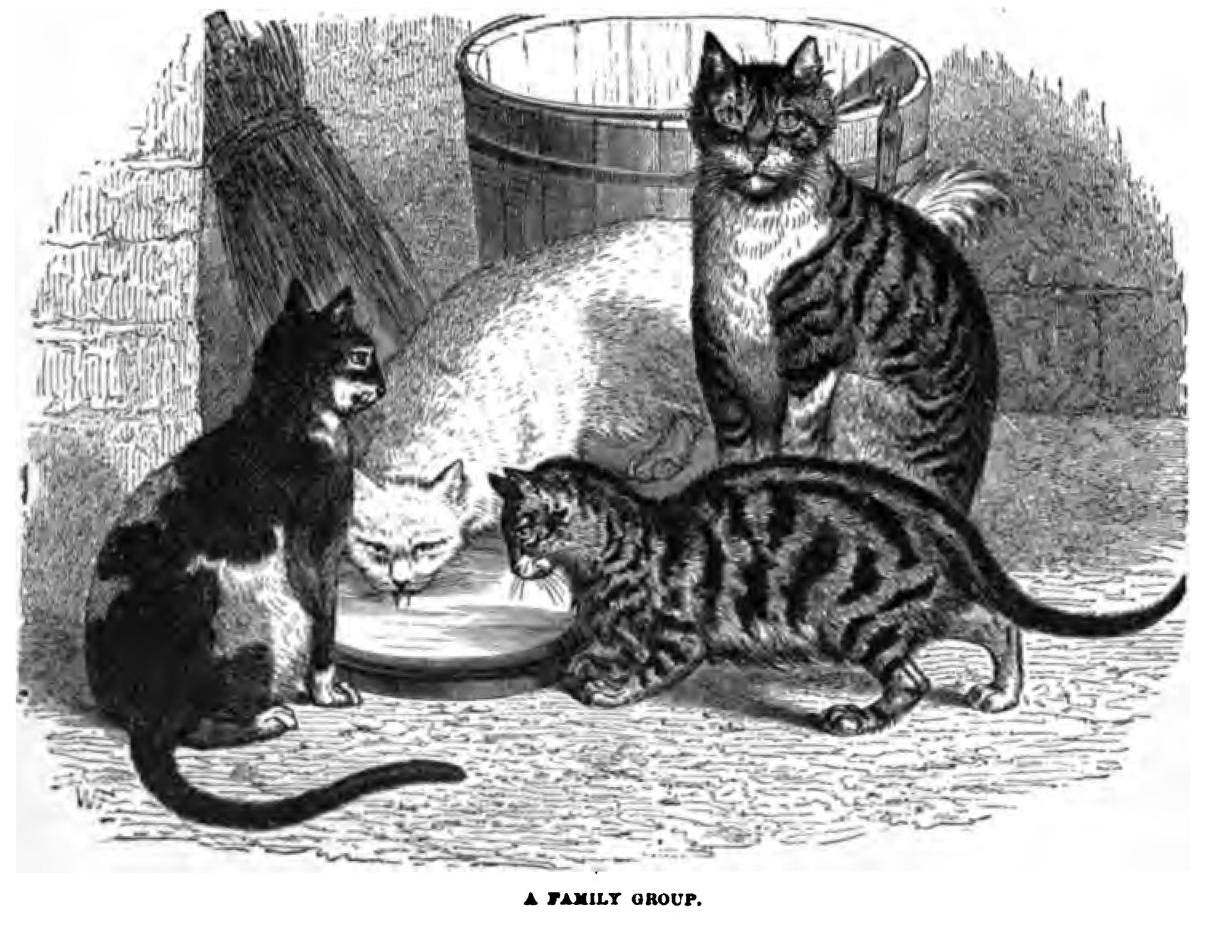

“The star of the troupe is named Tibert, after the famous cat in the ancient romance of 'Reynard and the Fox.' Tibert is two years old. He is very agile and skillful. He leads the company in the jump through blazing hoops, and his greatest delight is to turn somersaults over the backs of chairs.
“The performing cats lead very temperate and regular lives. They are given an airing every day, and the large room where they live is lighted and sunny and well supplied with soft cushions for beds. They are fed at regular hours on bread and milk, and once a day they have all the liver they can eat, as that has been found to be the most healthy meat for them. They always have a pan of water, for water is something of which every full-grown cat needs an abundant supply.
“The cats in this troupe are all of the common varieties, black and white cats, tigers, Maltese, and tortoise-shell. The trainer has tried in vain to teach the Persian and Angora cats. They are beautiful for pets, but they are not agile, nor capable of much affection, and they have very little brains and a short memory. When M. Bonnetty needs recruits for his troupe, he seeks them among the cats that climb roofs at night and prowl over back-yard fences, as among these despised and persecuted creatures he has discovered the highest degrees of docility, sagacity, and intelligence.”
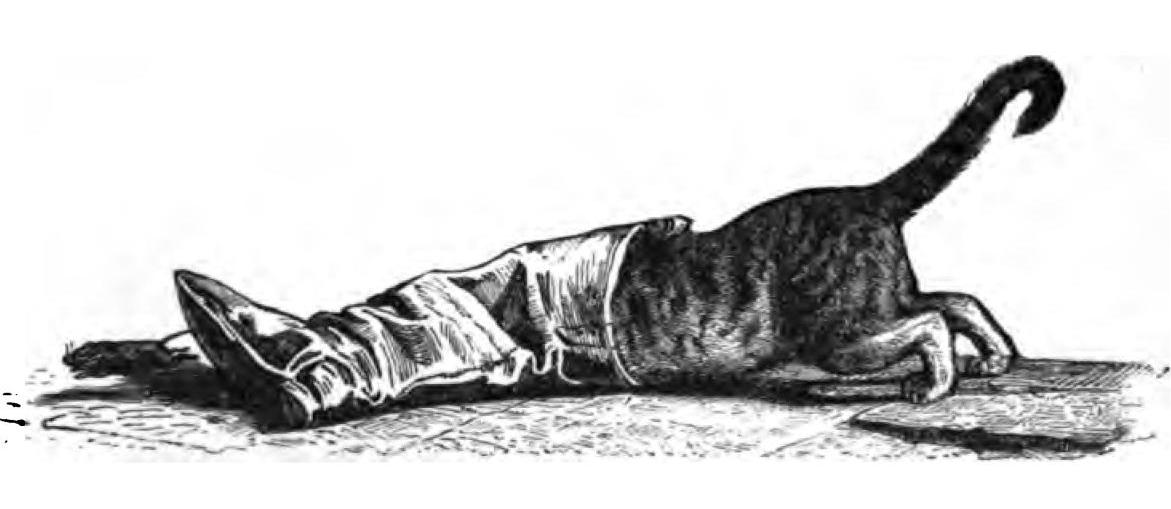

The Elephant—Differences between Indian and African Elephants—The Begging Elephant of Willenoor—Recognition of a Friend—What the Elephant Enjoys—Elephant Working a Pump—One that Served as a Nursemaid to Children—Madame Duphot's Pet, Nirjara—The Elephant who Remembered an Injury—How Wild Elephants are Caught—Tame Elephants used for Hunting Wild Ones—Manjari and what he did—Securing the Captives—Driving a Herd into a Keddali—Laws against Killing Elephants—The Sagacity of a Young Elephant in Robbing a Garden.
We will go at once from a small animal to a large one,” said Mr. Graham at their next conversation about the intelligence of quadrupeds. “And not only to a large one but to the largest four-footed animal in existence.”
“That must be the elephant,” said Charley, “as he is conceded to be the largest land animal in the world.”
“Yes,” replied the gentleman, “and what can you tell me about him?”
“He belongs to the order of Pachydermata and the section Proboscidean,” the youth answered, “and his ordinary height at the shoulder is about eight feet, though there are many elephants that exceed ten feet. He is very bulky in proportion to his height and length, the weight of a large elephant being about five tons. He can sleep standing and often does so, but it is incorrect to suppose, as some people do, that he cannot lie down on account of the shortness and stiffness of his legs. He is very sure-footed and can go up and down steep hills and mountains with very little trouble.”
“Quite correctly stated,” said Mr. Graham as Charley paused. Then turning to George he asked how many kinds of elephants there are in the world.


“There are only two distinct species now living,” said George, “and they are known as the Indian and the African elephants. Some differences have been found between the Sumatran elephant and the Indian one but the naturalists are not agreed as to whether the Sumatran should be classed as a distinct species.”
“Evidently you have been reading up the subject of elephants,” said Mr. Graham with a smile, “as I did not expect to find you so well informed. But I have brought you something which probably you have not seen, and it may combine instruction with amusement as it has much to do with elephants.”
Thereupon Mr. Graham took from the table a book which he explained was written by Louis Jacolliott, a French gentleman who lived many years in India and devoted much time and observation to the elephant. “I have marked several passages in the volume,” said lie, “and you may read them aloud in English, partly for practice in translating from French but mainly for the edification of Mr. Webb and Henry as well as of yourselves.”
Charley was first called upon to translate from the marked passages, which he did as follows:
“The most curious and interesting animal which I have met,” says M. Jacolliott, “is the elephant. Not the elephant of the menageries, broken in spirit and submissive, but the elephant as he is found in his native country. Some instances of his aptitude and intelligence are marvellous.
“A few leagues from Pondichery stands a pagoda called Willenoor, which, at the grand feasts of May, receives a multitude of five or six hundred thousand pilgrims, coming from all parts of India. A number of sacred elephants are attached to this pagoda, and among them is a mendicant, or begging elephant. Twice each week this elephant, accompanied by his driver, goes to the villages and to Pondichery to beg alms for the priests of Willenoor.
“Many times, working beneath the veranda, closed in by curtains on the first story of my house, I have seen him lift the movable curtain with his great trunk and balance himself to ask me for a piece of small coin, which he sucked from my hand to his trunk, a distance of more than three inches. I never failed to give him a small piece of money for the pagoda, and for himself a loaf of bread which my servant dipped in molasses, of which the elephant was very fond. In a short time we became very friendly. He had seen me only in undress, that is, in the light silk garments of the country, and then, only across the little pillars of the balcony of my cottage.
“One day I had occasion to go to Willenoor on business. I arrived at noon; the sun was burning the earth; no one was seen in the streets or on the verandas; every one was resting.
“My carriage had stopped under a mango-tree in the principal square, and I was about to start for the house of the thasildar, or governor of the village, when all at once a monstrous black elephant came running out of the pagoda which was opposite. He arrived in front of us and, before I had time to collect my senses, he lifted me up, placed me on his neck and started at full speed for the pagoda; he carried me across the first enclosure, in which was the great well for bathing, and brought me direct to the elephant quarters.
“Once there, he placed me on the ground in the center of all his companions; it was the begging elephant; he had recognized me. He uttered short cries, lifting his trunk and waving his ears, which his friends doubtless interpreted to my advantage, for when the thasildar, followed by the priests of the temple, came out to seek the cause of this strange demonstration, they found me calm, and recovered from my surprise, in the midst of these enormous beasts who were tendering an ovation in my behalf.
“'This is most remarkable,' said one of the priests, 'I have never seen them act so friendly toward any one.'
“I related to him the circumstances of my gifts to the begging elephant.
“'I am no longer surprised,' he answered, 'he has already recounted it to the whole band and the gourmands are paying you these attentions in hope of attaining the same reward.'
“'Is it possible?' I said with amazement.
“'I am perfectly sure of it. Do you wish to see the proof? Pass your arm around the trunk of your elephant friend and make him understand by signs that you wish him to go out with you; they will all follow you. Allow yourself to be led and you will see where they will bring you.'
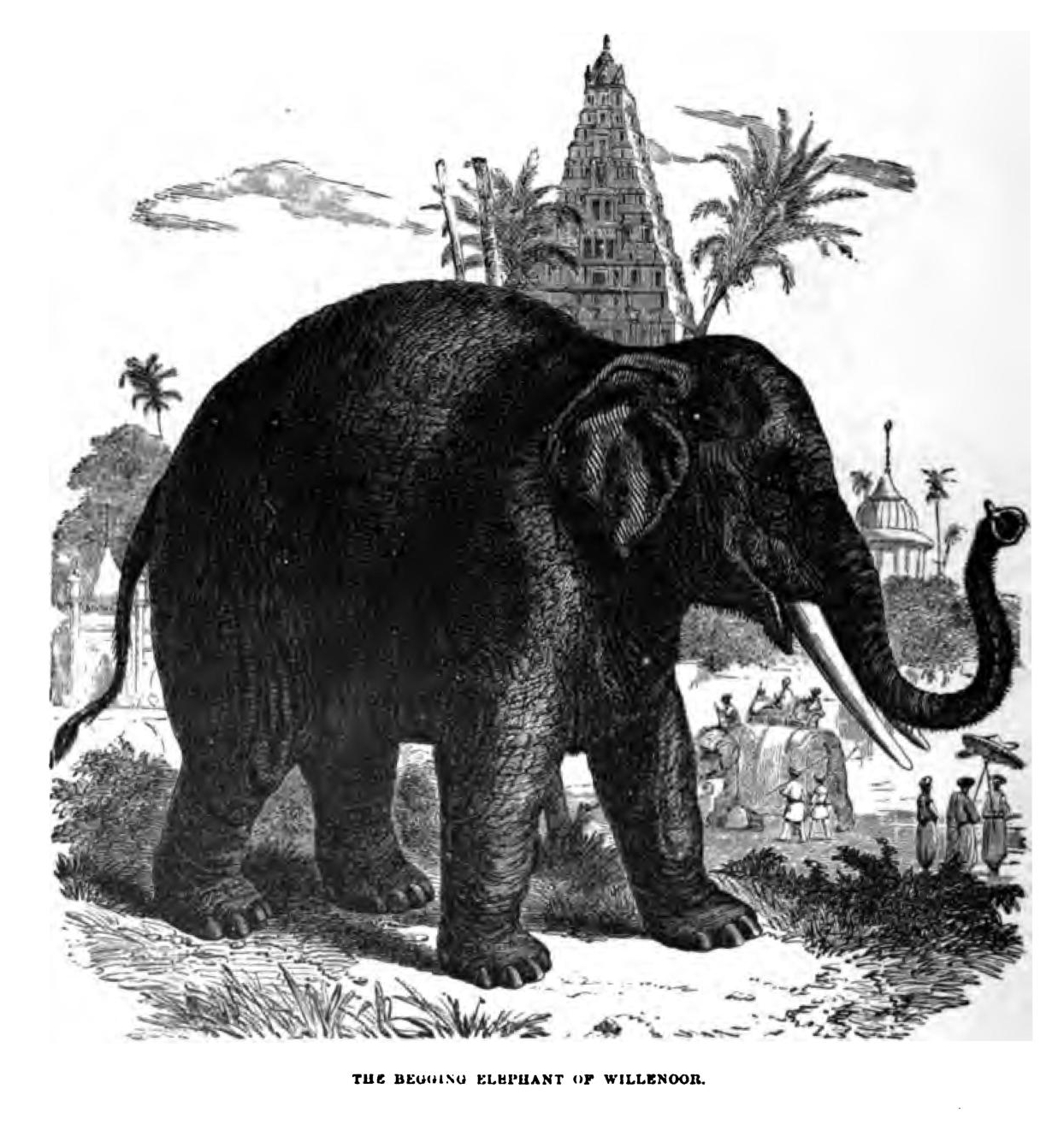

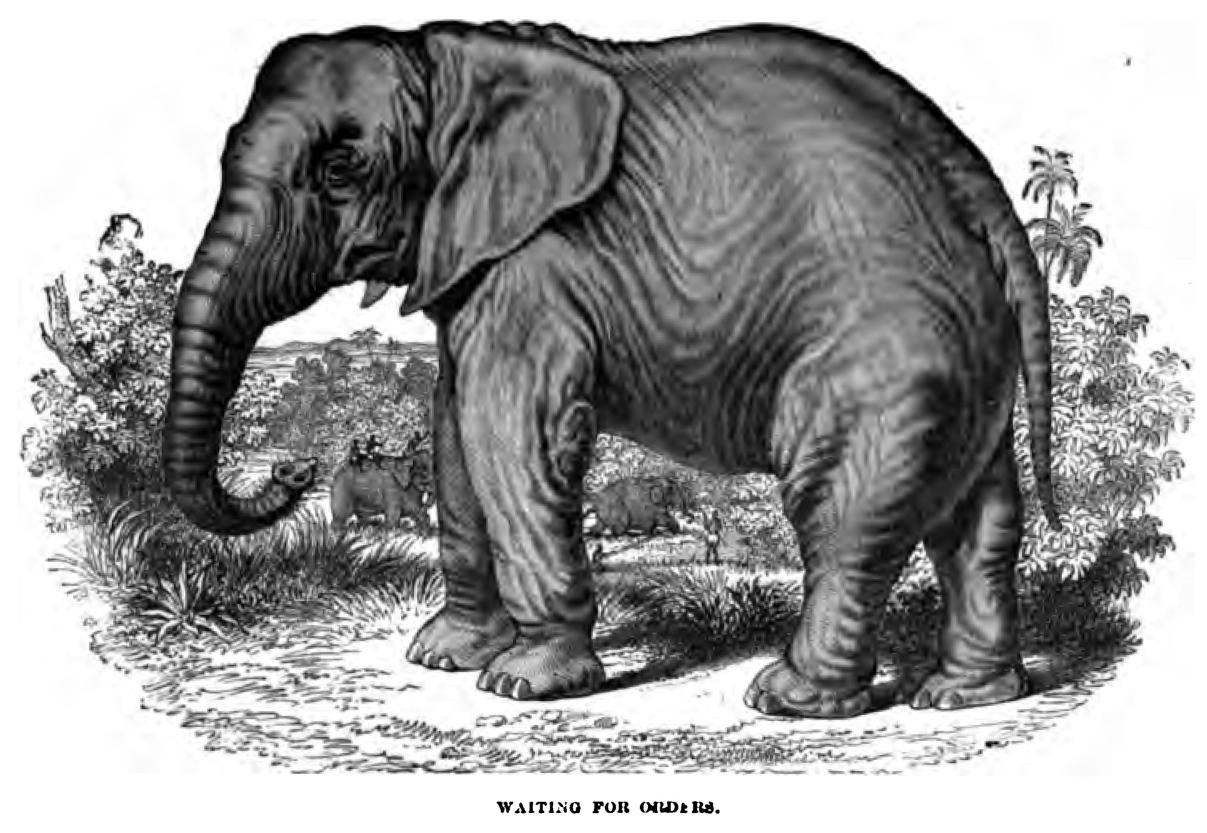

“The priest with whom I had already spoken, and who was a professor of philosophy at the temple of Willenoor, told me that from time to time the begging elephant managed to escape from them, and wandered as far as Pondichéry to beg on his own account. Knowing perfectly the market where he obtained the provisions on his expeditions, he would go there, place the money he had collected upon the table of a fruit merchant, and eat as many pineapples, bananas, mangoes and as much sugar-cane and arrack as the Hindoo would allow him for the money.
“'I followed his instructions; the begging elephant and I took up the lead, the nine others joined in the pace, uttering cries of contentment among themselves. We passed through the gate of the pagoda and they led me directly to the shop of a native baker. I would have been utterly astounded had I not already known the wonderful intelligence of these animals. At the shop my duty was readily understood and I presented to each one a loaf of bread, covered with the precious molasses syrup, which is their greatest delicacy.
“The following instance occurred before my own eyes:
“Every one knows that the elephant can be trained to do all kinds of work. While I have no hesitation about relating instances bearing on this statement, I prefer to tell of occurrences which indicate an actual reasoning power in the animal.
“It is customary in the settlements to water the cattle from large wooden buckets filled with water pumped from a well. This is done that they may not drink the water of the reservoirs, which is stagnant and unwholesome. Ordinarily the pumping is done at early morning by one of the elephants, the work taking nearly an hour. Accustomed to the task, he does not wait to be ordered, and every morning, an hour before sunrise he is at his labor with the precision of a living alarm-clock.
“I was staying once at Trichinopoly, at the house of a friend of mine, a merchant, who owned a grand villa a few leagues outside the city. The sun was rising and my servant had just awakened me for my bath. Passing through the yard I saw a large white elephant working at the pump. He closed his eyes sadly and was apparently trying to turn his thoughts from his wearisome labor. He saluted my presence with a joyful flapping of his ears, for during the two days since my arrival I had given him many dainties, but he did not cease from his work, which had to be finished.
“I was stroking him with my hand in passing, when I noticed that one of the two planks which supported the bucket on either side had fallen away. It thus happened that the bucket, being upheld on one side only, spilled its contents without a possibility of being filled.
“The elephant did not think that his work was ended because one side of the bucket was filled: nor did he attempt the impossible feat of trying to fill the other side until both sides were even. In a few minutes the water commenced to run from the lower side of the bucket, and the animal began to show signs of uneasiness; nevertheless he continued to pump. Soon, however, he dropped the handle and drew nearer to observe the cause of the trouble. He returned to the pump three times, each time coming back to examine the bucket. I awaited the end of this strange scene with unflagging interest. All at once a waving of the ears seemed to indicate that an idea had occurred to him.
“He came over to lift up the plank that had fallen away, and for a moment I thought that he intended to put it back in its place under the lower side of the bucket. But he was not troubled about the lower side, which was already tilled with water; it was the other side which annoyed him. Lifting the bucket carefully, he supported it for a moment with one of his great feet, while with his trunk he pulled out the second plank, and placed the bucket on solid earth, thus making it even on all sides. This done, the labor of filling it was easy.
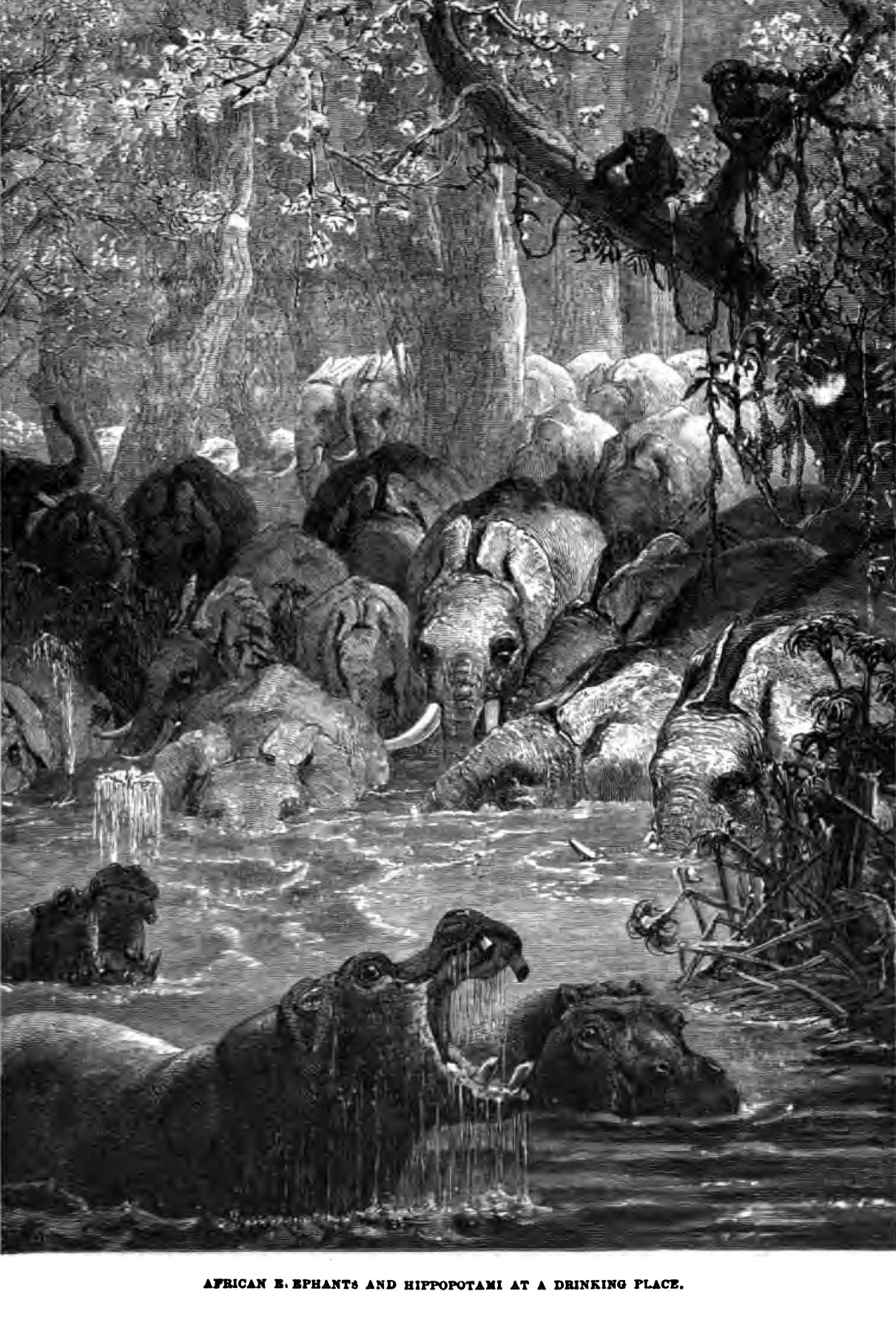

“The elephant is much attached to the women and children in the villages, and it would be dangerous for a stranger to make even an unfriendly gesture in the presence of this animal.
“It is a remarkable sight to see him guard his master's children in their promenades; he watches everything; beasts, serpents, turf-pits and swamps, in fact, any danger which may be imagined, is overcome by his presence. His pace is regulated by that of the children, and he attends them, gathering flowers, fruit from the trees, and sugar-canes; at a motion from one of them he will break a tree-branch if one desires to make a whip or cane. At the slightest noise which he does not understand, if he sees a jackall or a hyena in the distant thicket, he instantly gathers his brood under his trunk, commences to roar with rage, and anything, lion, tiger or man which threatens harm to his charges, is in danger of being dashed to the ground.
“In the lowlands of the Ganges, a swampy country covered with jungles and rice-fields, the royal Bengal tiger is found of great size and ferocity. The combats between this terrible beast and the elephant, guarding the cattle, servants or children of his master, are of almost daily occurrence. The royal Bengal tiger is so fierce that he never refuses to fight his adversary, although the end of the combat generally finds him crushed to death under the feet of his terrible enemy. In spite of the fact that the elephant is an unpitying foe in his battles with the tiger, bear or rhinoceros, he never molests the smaller, inoffensive animals. No matter what power a keeper may have over him, it is impossible to make him crush an insect.
“There is a little insect which children in Prance call 'les betes a bon Dieu'; the same insect is found in India, but growing to a size twice as large as in France. I have often seen one of these little creatures placed on a level surface, in the troughs of a yard, for instance; I have seen the elephant ordered to crush the insect, but never, for master or driver, would he lift his foot above it in passing by, evidently avoiding any opportunity to do harm. If, on the contrary, he is commanded to bring it to you, he will pick it up delicately with his trunk, and place it in your hands without bruising its wings.
“Nirjara, Madame Duphot's favorite elephant, was an admirable animal. He was a white elephant, which is the most intelligent of all the elephant race. About twenty-five years old, he possessed all the power of youth and infancy, for, in the elephant, the full strength is not reached until they have passed fifty years. Nirjara was not born in the settlements. He was captured in a wild state by the elephants employed for the purpose, and was presented as a gift to his mistress. As soon as he had accustomed himself to his new surroundings, without a hope of returning to the free life of the mountains, he had been made the guardian of Madame Duphot's two young children, and the companion of all their sports and journeys. Even in the ordinary walks and rides she made use of the 'howdah' carried by Nirjara, in preference to her own carriage.
“This fine animal, having no other task, was entirely free to go and come as he desired, but he seldom strayed beyond the sound of Madame's whistle. He was devoted to her, and always hastened to answer the slightest call. I have often seen him standing a few paces from the veranda, following with his eye the movements of his mistress for hours at a time. I believe he would have slain the entire household at a word from her. Every day as a part of his food of fresh grass, she used to prepare for him an eight-pound loaf of bread, made of rice and maize-flour dipped in the juice of sugar-cane. This she gave to him with her own hands. His drink was composed of water in which sugarcane had been crushed, and in warm weather she frequently added to this a measure of wine flavored with plenty of cinnamon and cloves. Her feeling of security in the journeys made under his protection is easily understood.”
Here Charley paused at a signal from Mr. Graham and the book was handed to George. The latter remarked that he had never before heard of an elephant being regularly employed as a nursemaid, though he had read of the great fondness which he has for children.
“Many anecdotes are told of this peculiarity of the elephant,” said Mr. Graham, “and he seems to remember kindness quite as much as the dog or any other quadruped. He can also remember injuries or insults, even though years may have passed since they occurred.”


“I have read,” said Charley, “of a tailor at Acheen who was in front of his shop one day when an elephant put his trunk in and begged for something. Instead of giving him anything the man pricked the creature's trunk with a needle and the elephant turned and went away. A long time afterward the same elephant was in the neighborhood, and as he approached the shop he filled his trunk with water from a trough, and then watched his chance to eject it upon the man who had offended him.”


“That story is in one of the books on the sagacity of animals,” Mr. Graham answered. Then, turning to George, he said they would now listen to something from M. Jacolliott about the mode of catching wild elephants in India and Ceylon.
Thereupon George read as follows:
“Mounted on well trained elephants, the ordinary dangers of hunting are readily comprehended and foreseen; the intelligence of these splendid animals is sufficient to inspire confidence. Nevertheless, grave accidents may arise. When the elephant becomes enraged in his pursuit of a tiger, it sometimes happens that he listens to no voice whatever, dashing madly onward until the 'howdah,' in which the hunter is enclosed, is broken in pieces against a huge tree, branch, or other obstacle.
“It is extraordinary, in hunting wild elephants, that the trained beasts, once on the field, have no other guide than their own instincts. At the first sight of a human form the hunted animal retreats immediately to the thicket, where pursuit is very likely to end in a catastrophe to the pursuers; or, the wild elephants, sometimes being assembled in force, will turn courageously to give battle to the trained animals, of which battle the result can never be foreseen.
“In these expeditions, the slightest carelessness will sometimes reveal the lurking-place of the hunters; the chase is only undertaken with twice as many trained elephants as there are wild ones to be captured, and then only when it has been ascertained by trustworthy scouts that there are no large troops of elephants within a circle of forty or fifty miles. The utmost care is used in this respect. When there is no other way, the Hindoos who make a profession of elephant-hunting sometimes attack with an inferior force, but the European, who follows the chase for pleasure, does not fail to take all necessary precautions.”
“The following is an account of one of these hunts:
“The last commands had hardly been given to Manjari, the chief elephant, by his master, when he started, at the head of his little troop, to descend the hill on the opposite side to that by which we had ascended; he marched slowly, giving no evidence of his intention to rejoin the party which he was leaving behind. The intelligent animal played his part to perfection; he moved slowly, with his companions, toward the stream which wound through the depth of the ravine, as if he intended to slake his thirst at the water. On his way down he stopped here and there to break a tree branch or to pick up a bunch of grass, which he lazily deposited in his mouth.
“The wild elephants, resting in the valley, gazed on Manjari and his troop with curiosity but without, alarm; every movement proved that they had no suspicion of the intentions of the new-comers.
“Suddenly we witnessed a remarkable sight. A young elephant, which was in the wild herd with its mother, seeing Manjari and his companions advancing slowly, bounded toward them to make acquaintance with the strangers.
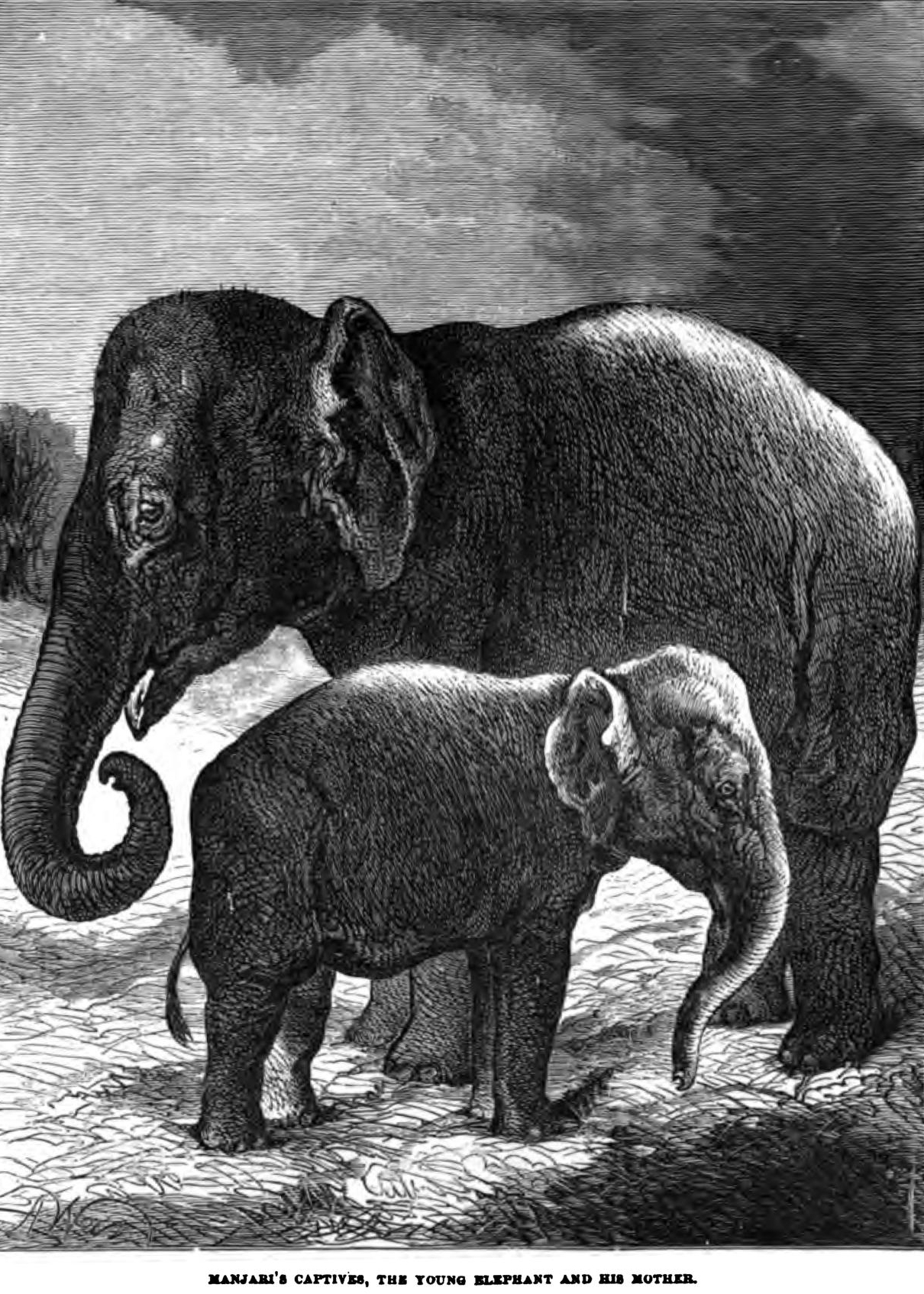

The young animal was recalled two or three times by its mother, but she, seeing that no attention was paid to her calls, continued her watching from a distance wondering, without doubt, at the welcome extended to her little one. The old elephant Manjari received the little wanderer with cries of joy and marks of tenderness which were too well feigned to arouse suspicion. When, however, the first reception was over, Manjari gave a signal and two elephants placed themselves, one on each side of the young one, and he was a captive.
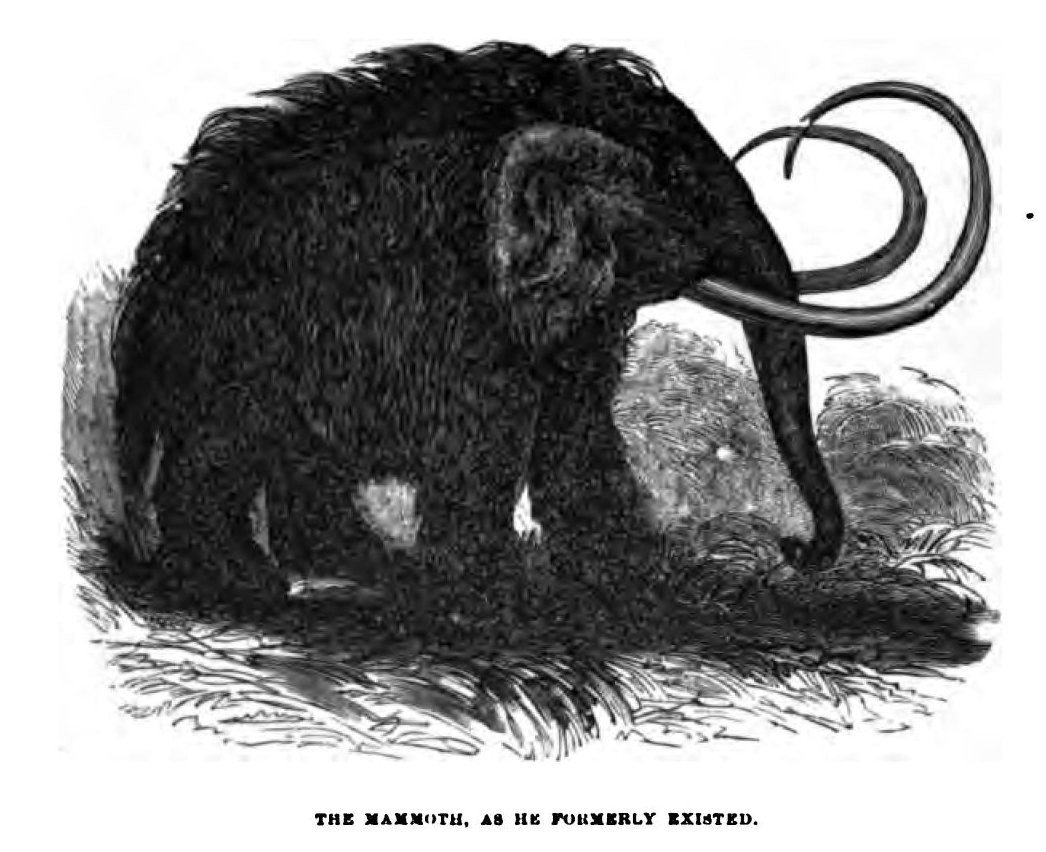

“They marched to the banks of the stream and drank eagerly; then, without the slightest hesitation, they directed their way toward the two wild elephants who were to be brought back as prisoners. The young elephant seemed overjoyed to see its new friends going toward the place where its mother was lying. She answered its cries, without an idea of the danger which was impending. Her companion was gathering here and there tufts of grass, and devouring the young buds of the trees.
“They were surrounded in a very short time, and when they realized that they had to deal with enemies, it was too late to fly; each one had been caught by its trunk by two of the animals under Manjari and opposition and resistance were alike vain. After a few struggles they seemed to understand their position and they commenced to fill the forest with roars and cries of despair.
“Four more trained elephants were now turned loose and they immediately joined their troop; they were not needed, however, as two of the trained elephants could easily lead a wild one, but their presence served to remove the last faint hope of escape for the captured animals. All this was accomplished easily, without any visible resistance. In a moment their trunks were seized, all power of defence was taken away, and the captives were pressed on each side with such terrible force by their captors, that they seemed to understand instinctively the futility of resistance.
“When the first attempt was made to force them to walk, they made a supreme effort to remain, but a shower of blows from the trunk of Manjari decided their movements in a short space of time. When the poor brutes saw our party, they were terror-stricken and trembled violently; our weak appearance evidently produced a greater effect on their imagination, than did that of their captors.
“In a little time, a hunter crept behind each of them, and having given orders to have them held firmly, bound their hind feet with chains of special strength. From this moment a single elephant easily guarded them; they could only march slowly, and a child could have escaped them. Nothing now remained but to train them, and to make them forget, by kind and gentle treatment, their early life and the great forests in which they were born.
“Ordinarily it is possible to approach a captured elephant at the end of three days; on the eighth day the chains are taken off, and when a month has passed by the animal will go about quietly with the trained ones, imitating their actions, and offering to take part in their work. Indeed, it sometimes happens that, a few hours after the hunt is over, captors and captives are on the best of terms with each other, and the latter are set free by the Hindoo banters on the third or fourth day.
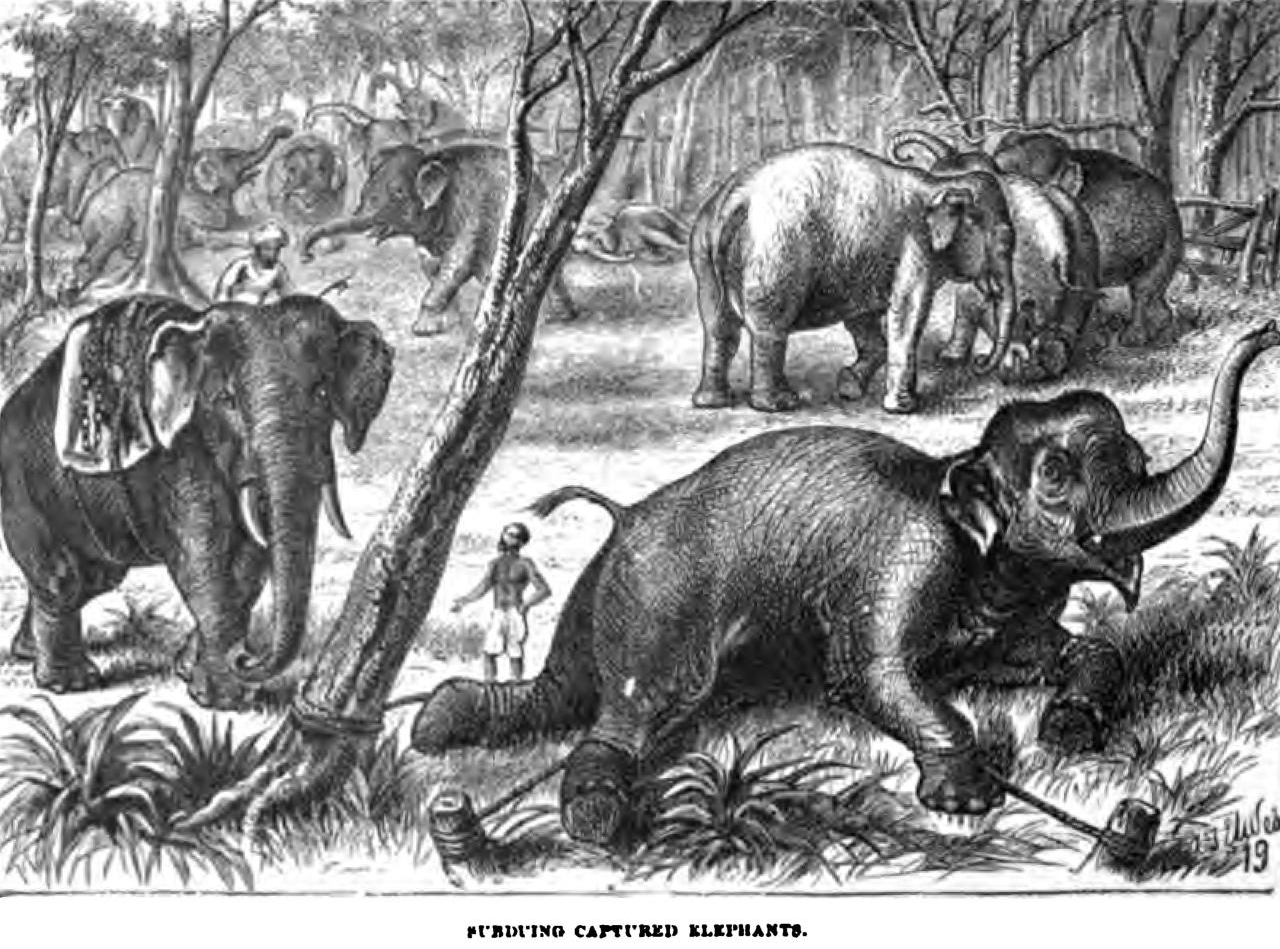

“When the elephant has tasted the delights of civilized life, he never returns to the jungle except to hunt, in his turn, his own fellows, and in this pursuit he displays as much cunning as the older ones did in capturing him.”
“Another mode of hunting elephants,” said Mr. Webb, “is by driving them into a keddah or corral. A strong yard is built with trunks of trees set in the ground like posts about two feet apart so that men can easily go in and out but elephants cannot pass.
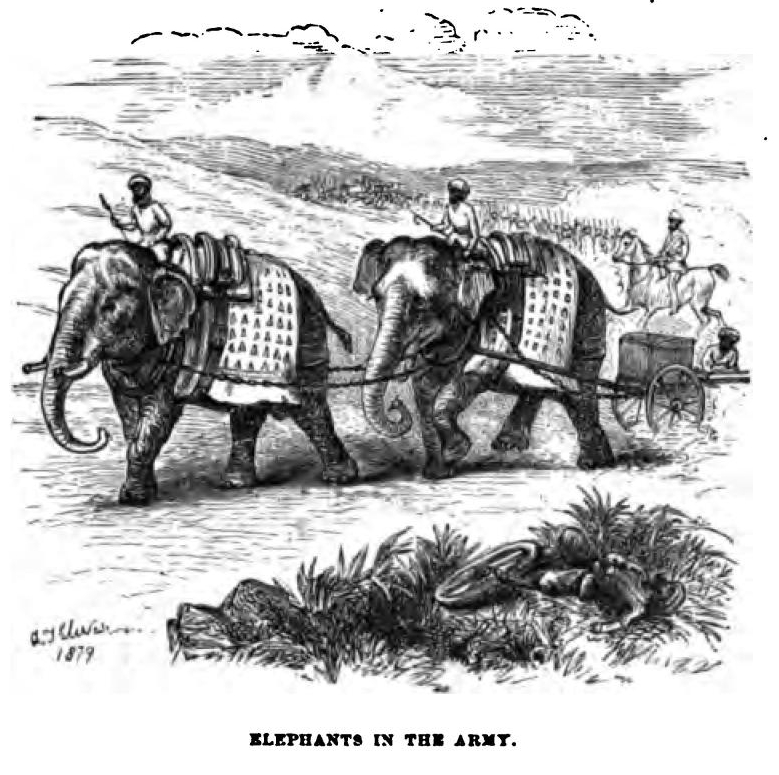

From the entrance of the yard two fences enclosing a space shaped like a 'V' are extended several miles and the herd of wild elephants is driven so that it will come into the space enclosed by the 'V' Until they are within the jaws of the fences the driving is done very quietly so as not to alarm the animals and put them to flight, but when they are once inside of it, all silence comes to an end, and the hunters make as much noise as possible with guns, drums and other instruments. This frightens the elephants and they rush pell-mell into the keddah, where they are made prisoners.”
George asked if the elephants were killed when caught or were simply made prisoners.
“No elephants are wantonly killed nowadays in India and Ceylon,” said Mr. Webb, “with the exception of those that are actually dangerous on account of their vices. There are stringent laws against shooting an elephant, the animal being under government protection, and whenever a herd is driven into a keddah the officials select as many as are wanted for use and allow the rest to return to the forest. In the early part of this century the government gave a bounty in Ceylon for the slaughter of elephants and great numbers were killed by hunters. The mistake in the policy was not discovered until the animals became very scarce, when the laws were reversed. Instead of paying now to have elephants killed the government protects them by making it a serious offence to shoot one.”
“But the case is different in Africa,” said the gentleman. “The African elephant is not domesticated at present, or very rarely so, though he seems to have been in ancient times if we may judge by history. The famous Jumbo was an African elephant; you remember that his ears were about three times as large as those of an ordinary elephant, and this is the principal feature which distinguishes one kind from the other. The African is not as docile as the Asiatic elephant; he is hunted for his ivory and for his flesh, which is eagerly devoured by the natives. He is shot, speared, driven into pit-falls, and otherwise taken, and his numbers are said to be diminishing rapidly. By the end of the century, at the rate the destruction is going on, there will not be many African elephants remaining.”
George asked about, the mammoth which formerly lived in Siberia, and whose remains are occasionally found at the present time where they have lain for thousands of years imbedded in the frozen earth. Mr. Graham told him that the mammoth was a member of the elephant family, and his body was covered with thick fur or long hair to protect it from the cold. Of the few specimens that have been found the tusks were longer than those of the elephant and greatly curved; the skele were trimmed into the required shape for telegraph poles; a number of them being piled at intervals along the track.
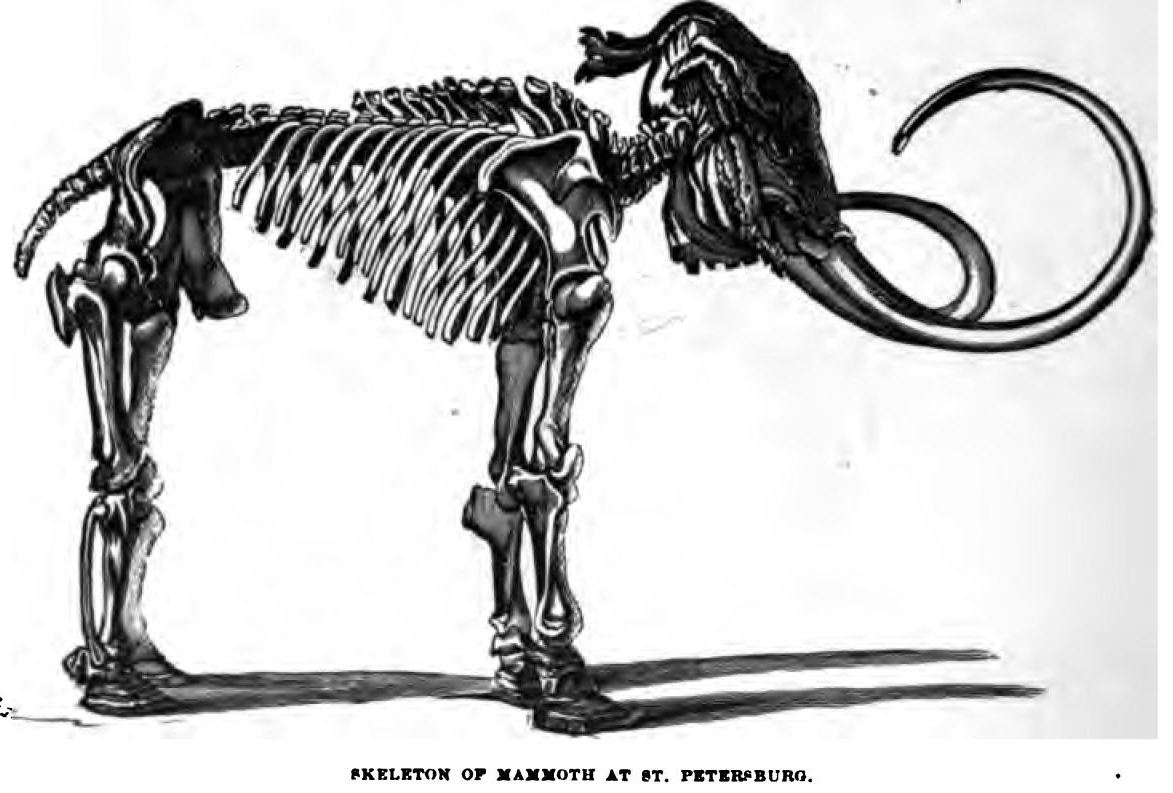

“Then the elephants were sent to carry the poles to the distances they were to be set apart. I saw one mahout conduct his elephant to-a pile of these heavy poles and tell the intelligent animal to pick one up. He then, with a long wand he had for the purpose, measured off the distance and accompanied the elephant, who carried the pole to the place the mahout indicated. Then I saw the mahout tell the elephant to go to the pile and place them in line along the track, at the ton of one is in the museum at St. Petersburg, and portions of the hair and skin are preserved with it.
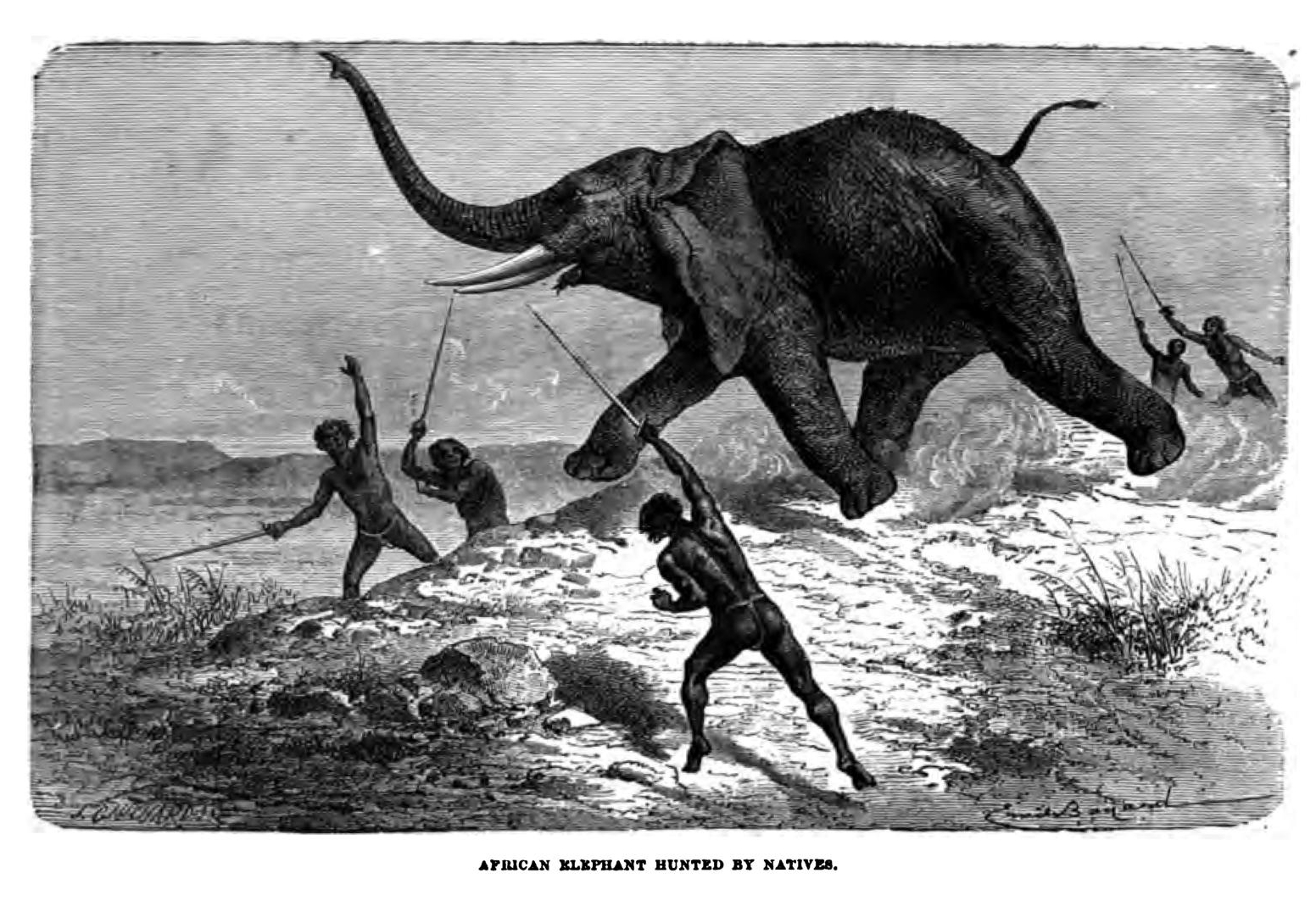

Returning to the subject of the intelligence of the elephant, Mr. Grahani read the following from the pen of an American traveler in Burmah, who tells how the elephant was employed in building a telegraph line:
“First a track was made by felling all timber and clearing off any undergrowth, etc., to about twenty feet in width, hundreds of men being employed. Such trees as were suitable in length and otherwise same distance apart as the one he had measured. The man then lay down under a tree and went to sleep. In the meantime the noble animal took up each piece of timber, and carried it to its proper place in the line. I felt so interested that I stayed to witness the whole proceeding. I measured the distance by pacing and found them all to be equal in length and correctly placed like the first one. The beast then went to his mahout and gently touched him with the tip of his trunk and awoke him, as much as to say, 'All is finished, master, according to your orders.' The mahout awoke, mounted the elephant, and went forward to continue the line in the same easy and agreeable manner.”
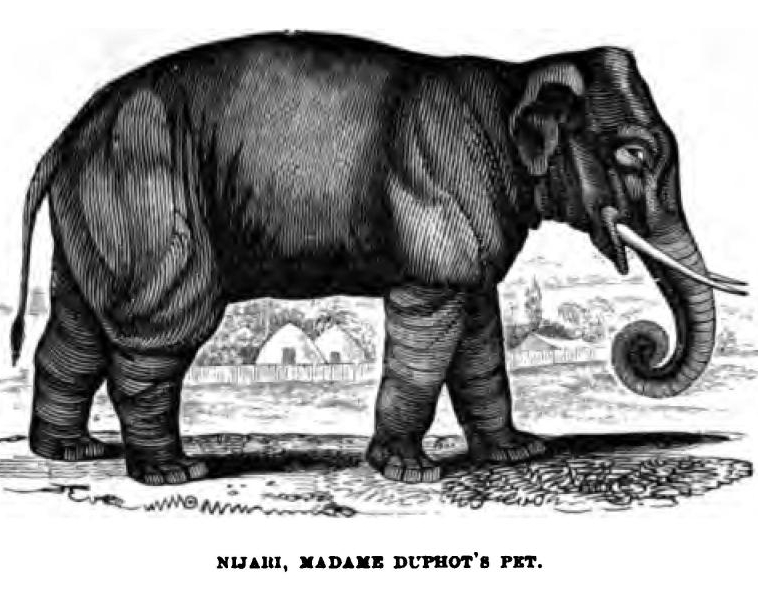

The same writer says:—
“The young elephants are made pets of and not allowed to work until fully grown. That they are not deficient in understanding, even at an early age, the following anecdote will prove:—The commissioner at Shweygheen had a young elephant, quite a baby, given him by a Burmese gentleman, and the lively intelligent beast afforded much amusement to his owner and all who knew him.
“The youngster could do everything but speak. He was kept in a stable in the garden, specially made for him, the sides being composed of stout planks instead of the usual wattled split bamboo. The heavy teak door was fastened on the outside by a sliding bar of the same wood, running in iron staples. The paths and walks through the garden were made of ground rolled and pressed to the hardness of a macadamized road.
“Shortly after the young elephant's arrival and installation in his stable, the garden was found one morning to have been robbed during' the night, the mangoes especially suffering, a quantity of the best fruit having been taken. No traces were left by the thief or thieves, there were no footprints on the soft ground outside, nothing to indicate how an entrance had been made into the garden. This went on for several nights, and at last it was discovered that the young elephant was the thief. He used to raise the edge of the roof so as to put out his trank and slide the bolt; then there was no obstacle to prevent opening the door, and he opened it and went into the garden. After regaling himself on the fruit he returned to the stable, closed the door, slid the bolt into its place, let the edge of the roof fall to its proper position, and thus made it impossible for any one to know he had been out.”
Apes, Baboons and Monkeys—The Apes at Gibraltar—How they Saved the Fort from Surprise—A Monkey Fishing Party—The Monkey's Resemblance to Man—Illustrations of his Intelligence—A Monkey Theater—Dressing the Performers—The Four-handed Actors and What they Did—Interview with their Trainer—Mandrills and their Peculiarities—The Chacma and his Uses as a Watch-Dog—How Monkeys find Water—Differences between Old-World and New-World Monkeys—Monkeys with Prehensile Tails—The South American Howler—Sapajous and Spider Monkeys—Simian Intelligence—Organizing to Rob Gardens—A Bridge of Monkeys.
WHAT animal shall we consider now?” queried Mr. Graham at their next conversation.
“We've just had the elephant,” said George, “who belongs in Africa and Asia.
Suppose we talk about another animal of those countries, the monkey.”
“If you mean that the monkey belongs exclusively in Africa and Asia as the elephant does,” said Harry, “you're wrong. The monkey is found there, it is true, but he is also found in America and Europe.”
“I know he's found in America,” replied George, “but didn't know that he lived in Europe in a wild state. The only European monkeys I ever heard of were in captivity.”
“You're not far wrong, though,” Harry answered with a slight, laugh, “as there's only one place in Europe where monkeys run wild and that is on the Rock of Gibraltar.”
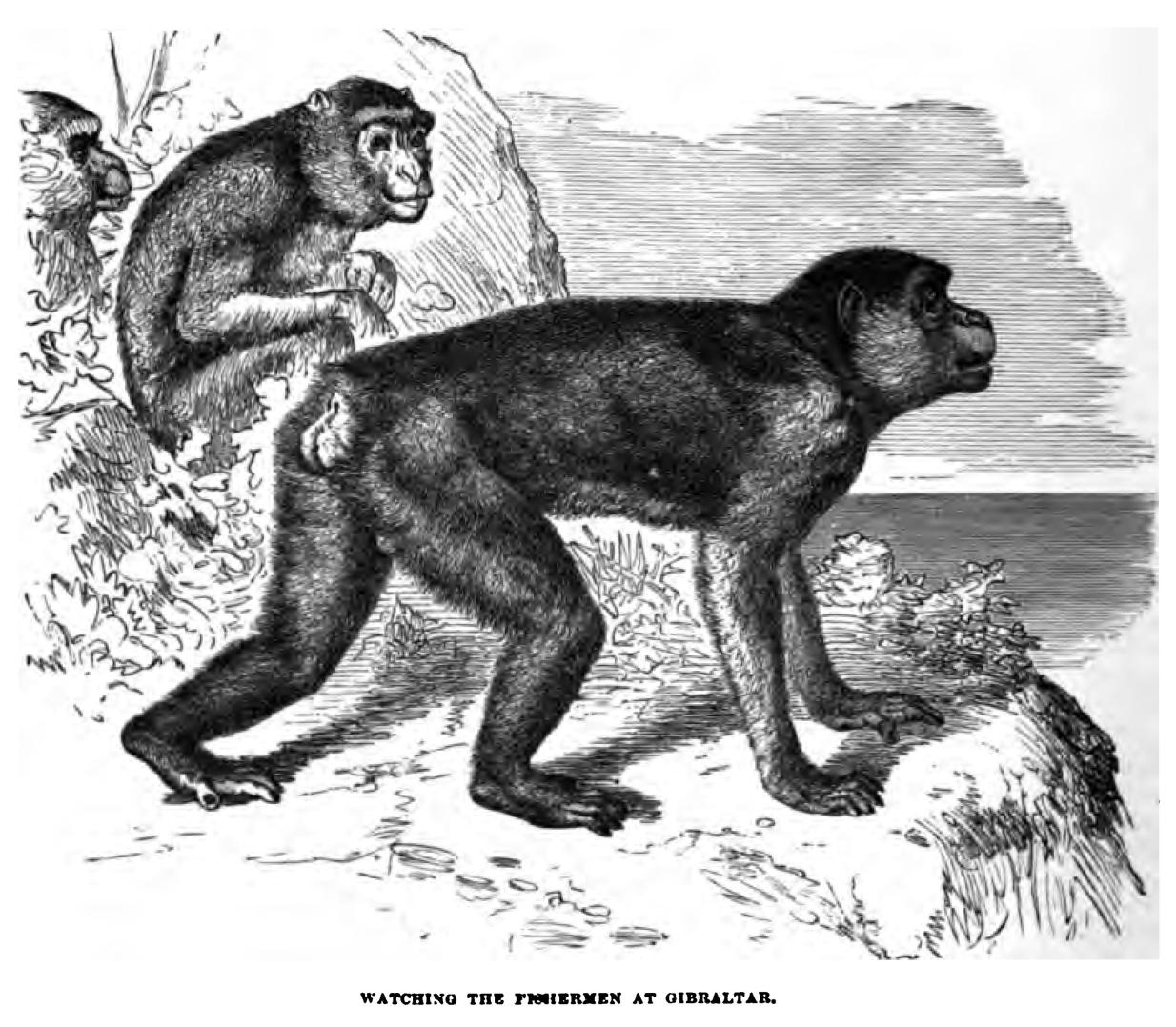

“Are there many of them?”
“No, not a great number, and they are supposed to be descended from some that were brought there from Africa and escaped from captivity. The naturalists class them as Magots or Barbary Apes, and say they are identical with the monkeys or apes of Northern Africa. Before we go further let me explain that an ape is a monkey without a tail, a baboon is a monkey with a short tail, and a monkey is an animal of the same great family with a long tail.”
“We thank you for the explanation,” said Harry, and his words were, echoed by George.
“Some interesting stories are told about these Gibraltar monkeys,” said Mr. Graham, resuming the topic of conversation.
“What are they, please?” exclaimed the youths in a breath.
“It is said,” remarked Mr. Graham, “that a few weeks before the famous siege of Gibraltar, the Spaniards attempted to surprise one of the British outposts, and they would have succeeded if it had not been for the monkeys. The party which was attempting the surprise had to pass a group of monkeys; the animals set up such a chattering as to alarm the outpost and put it on its guard. As a reward for their services in saving Gibraltar, the English garrison has ever since allowed the monkeys to live unmolested.
“Another story,” the gentleman continued, “relates to the imitative powers of the monkey. When Lord Howe went to the relief of the garrison during the siege, he had among the reinforcements the Twenty-fifth Regiment of infantry. After peace had been declared, several officers of this regiment went to a spot at the back of the rock to amuse themselves by catching fish. They found a good place for their purpose, and were busily engaged in catching whiting, when they were pelted by some one concealed on the steep rock above them. They shifted their ground two or three times, and finally found a place where they were no longer disturbed.
“The fish were biting at a goodly rate when suddenly the drums sounded to arms. The officers rowed their boat ashore, left it high and dry on the beach, and then hurried away to report for duty.
“When they came back they were greatly surprised to find that the position of the boat had been changed, and some of the hooks which had been left bare were baited. The lines were a good deal tangled, and it was evident that whoever used the boat had not been at all particular about other people's property.
“In a day or two the mystery was explained. An officer of Hanoverian Grenadiers had taken a solitary walk on that very afternoon, and found a party of young monkeys pelting the fishermen from behind the rocks. The officer was a good deal of a naturalist, and so he concealed himself carefully and watched the performance.
“While the youngsters were pelting the fishermen, several old monkeys arrived and drove the mischievous youths away. Then they sat down and watched very attentively the business of fish-taking, and when the officers beached their boat and went away, the monkeys determined to improve their lesson. They launched the boat, baited the hooks, and went to fishing. They caught a few fish, and then came back to shore, left the boat and retired up the rock before the officers came in sight again.”
“Did they carry off the fish they had caught?” George asked.
“Yes,” was the reply, “not only what they caught themselves but those that the officers had left in the boat.”
“What a human action!” exclaimed Harry.
“The men who argue that we are descended from monkeys ought to know of the performance of the Gibralter apes.”
“Not only in actions but in structure,” said Mr. Graham, “does the monkey bear a resemblance to man. Several naturalists have regarded the monkey as only an inferior form of the human race and have so classified him. The celebrated naturalist Linnæus placed man with monkeys in his order of Primates or first animals. He made his genus Homo consist of human beings (Homo sapiens), of chimpanzees (Homo Troglodytes), of orang outangs (Homo satyrus), and the Gibbons Homo lar.”
“Was his classification accepted by the other naturalists?” one of the youths asked.
“By some, but by no means by all,” was the reply.
“There was aloud protest against it, not by the monkeys, who didn't trouble their heads on the subject, but learned men and others who felt that the dignity of the human race had been affronted. As time went on the opinions of Linnæus fell more and more into disfavor, and the present classification places man in a distinct genus, that of Bimana (two-handed) while the whole tribe of monkeys, apes and the like, are classed as Quadrumana (four-handed.)
“It must be admitted,” continued Mr. Graham, “that from a purely anatomical point of view, the monkey has a close resemblance to man. He can stand upright, has a nude face, his eyes are directed forward, his internal organs are very much the same, and he is subject to many diseases of which man is the victim. But although he can walk upright he does so with difficulty; his forelegs or arms are much longer than the human arm, in proportion to the rest of the body, and although he has the same organs in his throat he has not the power of speech. Though his hand is shaped like the human one in a general way, it is far from being as perfect; the fingers do not act separately like those of man and the thumb is short and unwieldy and does not oppose each of the fingers, or only very imperfectly so.”
“I have read somewhere,” said Harry, “that the highest intellect shown by the monkey is lower than that of the most degraded savage. Monkeys are not afraid of fire, but no monkey ever rose to the intelligence of producing it by rubbing two sticks together as is done by the lowest of savages.”
“You are right,” said Mr. Graham. “The observation you refer to was made by a French philosopher, Joseph de Maistre. There are other points in which we can show a wide gulf between man and the quadrumana, but we will drop them for the present.”
At this moment an exclamation from George turned attention in his direction.
“Here's something for us to see,” said George, as he held up a newspaper on which he had rested his eye for a moment, while listening to the remarks of Mr. Graham.
“What is it?” Harry asked.
“A monkey show,” was the reply, “a theatrical performance by trained monkeys, or rather a pantomime, as the animals cannot be expected to talk as human actors do.”
It was agreed at once that the monkey performance was something to be seen, and accordingly arrangements were made for attending it. Mr. Graham explained to the youths that while these performances were comparatively rare in America they were an old established institution in Europe. “Germany and Italy,” said he, “are famous for them, and in some of the German and Italian cities there are monkey theaters where performances are given by quadrumana throughout the entire year. They are assisted by dogs and ponies, and altogether the show is very funny and interesting.”
The exhibition which our friends attended was managed by Mr. Brockmann, a famous monkey-trainer of Vienna, who thought it would be a good speculation to bring his troupe to America. Among the members of his four-handed company were Kullman, the elegant circus rider; the fat and lovesick Lottie; Anthony, a gentleman not to be joked with with impunity; Jack, a little dandy; and George, the clown of the company, who was said to create any amount of fun by his queer antics.
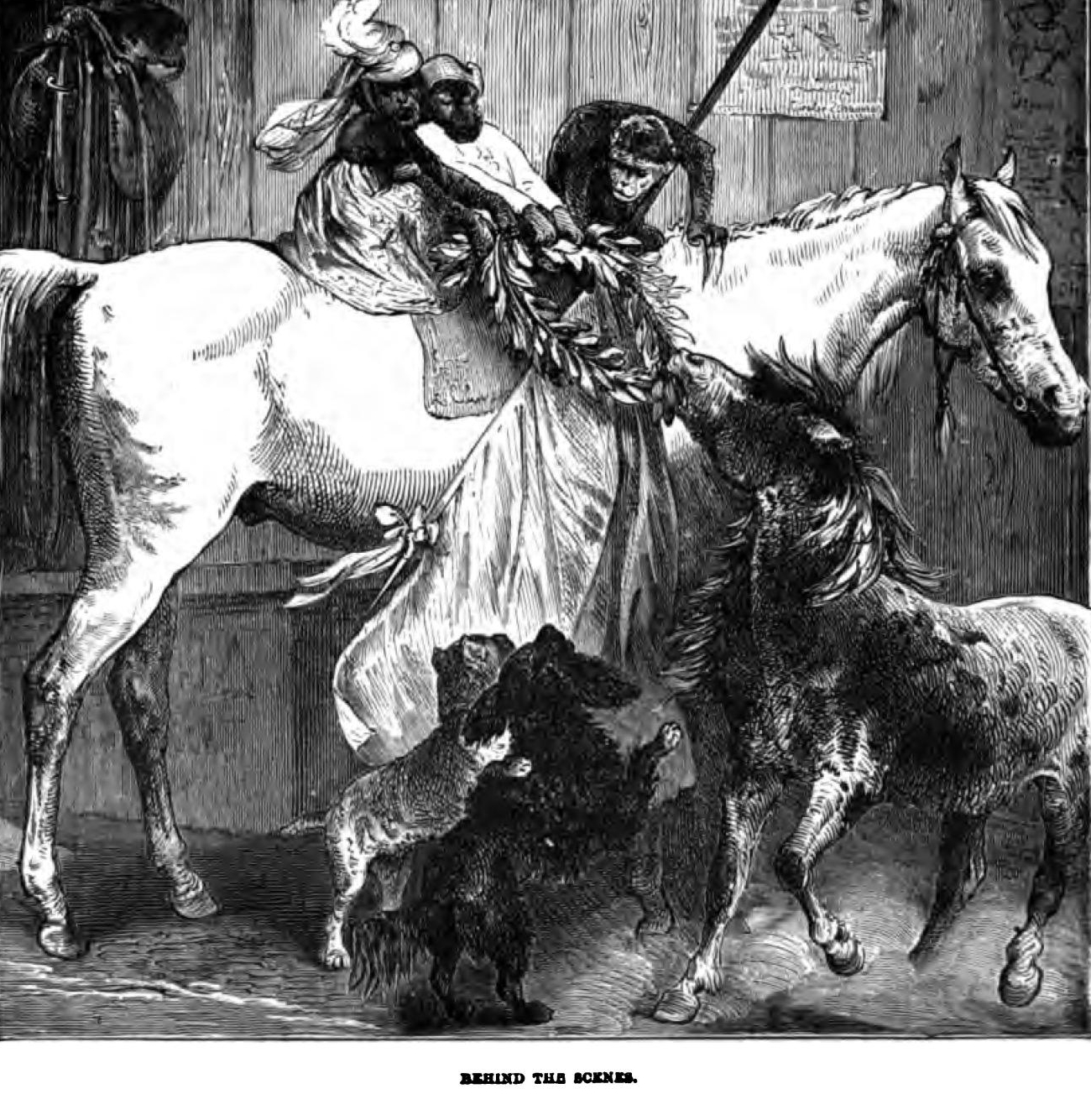

Our young friends read with interest an account from a German paper of the preparations for their nightly appearance on the stage. “As soon as the operation of dressing begins,” says the writer, “the cunning little animals begin to be restless. They shuffle to and fro on their high stools; they sneeze and blow and sniffle, and make faces at the keepers and each other. But woe to him who would dare laugh at their grimaces and their fooling. He would soon make acquaintance with their teeth and nails. The comical little fellows love to carry on all sorts of fun, but they wont allow anybody to laugh at them. For this reason they are attached with little chains to their stools as long as their dressing lasts.
They like to play all sorts of tricks with the keepers who are dressing them. One of them amuses himself by tearing his brand new trousers into shreds, and when he has fully succeeded in doing so, he gives vent to his delight by loud screams. Another takes pleasure in pulling off the vest which the keeper has had the greatest difficulty in buttoning on him, and grins at the unfortunate man with truly fiendish delight. A third absolutely refuses to put his tiny little hand into the sleeves, although the keeper holds the armhole in the most inviting manner before him. The little rascal pretends not to be able to find it, pushing his hands in every direction but the right one. If the keeper at last loses his patience and pushes the arm by force into the sleeve, the indignant artist feels insulted, and replies with a ringing slap in the keeper's face.
“At last the operation of dressing has been performed. The little artists sit quietly on their stools, not a little proud of their gay costumes. They grin and wink at each other, and munch with great delight nuts and almonds and other delicacies with which they are rewarded. Lottie is particularly vain and proud of her pretty costume. With great complacency she pulls her dress, arranges her coiffure, pushes her hat from one side to the other to see which is most becoming, and keeps on a continual flirtation with the gentlemen of the company. Dainty little Jack, for whom these demonstrations of love are intended, seems to trouble himself very little about his coquetish mistress. He sits quietly in a corner enjoying the draughts from a small bottle of mild beer, of which he is particularly fond, taking very great care that not a drop of the precious liquor is spilled on his snowy white jacket and apron, which as cook is his professional costume. Jack is possessed of a most versatile talent. With equal skill and elegance he appears now as a cook, then as a coachman, or a circus rider and athlete. Besides this, he has assumed for his own pleasure the function of picking up the various articles that lie scattered on the stage after the performance and conveying them swiftly behind the scenes.”
While waiting for the performance to begin, Harry read the following account of a reporter's interview with Mr. Brockmann, the manager of the monkey troupe. The reporter asked about the system of training, and in reply to the question the manager said: “I cannot tell everything, as I have certain methods which I do not want to make generally known. For forty years my father and I have given exhibitions of trained animals, and in that time we have naturally learned much of their habits and dispositions. The great thing, however, is to gain command of an animal's entire attention. Once this is obtained, all the rest is comparatively easy. When a monkey's training begins he is restless, his eyes wander all over the room, and his attention is never for more than a minute concentrated on any one thing. I have to teach him to forget everything else and watch me. He must learn to keep his eyes on mine. If any one in the audience will watch the monkeys when they are doing important acts, he will see that they never take their eyes off me. It is a singular thing that, while dogs and ponies look larger on the stage than they really are, monkeys appear very much smaller when dressed up. I have a little monkey who is an even better tightrope performer than the one now exhibited, but he would look so small that the audience would scarcely be able to see his feats. My animals are very fond of me. The rewards you see me give them on the stage are almonds and raisins.”
The reporter had an opportunity of witnessing a display of the monkeys' affection for Mr. Brockman, when he made his first appearance for the day in their dressing-room. He went the rounds and spoke a word or two to each. Some kissed him, others climbed up and put their arms around his neck, and each exhibited the utmost impatience till his turn for recognition came.
“What monkeys are the easiest to train?” inquired the reporter.
“Mandrills and baboons, though they are perhaps a little more delicate than the other kinds.
Still my father had one for thirty years. The oldest performer in the present troupe is a blue-faced mandrill, whom I have had for twelve years. He is very good-tempered and will not reject any attentions you may feel inclined to show him. As a general rule, when a monkey holds out his hand encouragingly it is safest to give him a wide berth, and one who is chattering to himself is nearly always in a bad temper.”
“How often do you feed them, and what, is their favorite food?”
“When they are performing twice they get four light meals a day, milk, fruit, and potatoes being their principal diet. We keep their cages very clean, but they look after their own toilets and we do not wash them.”
“What animals do you find possess the most intelligence, monkeys, dogs or horses?”
“There are clever and stupid specimens of each, but I don't think there is any great difference in general intelligence. The great difficulty with all of them is to get undivided attention.”


“What is the difference between a mandrill and an ordinary monkey?” queried Harry as he paused at the end of his reading.
“The mandrill,” said Mr. Graham, “is one of the many members of the monkey family, and belongs among the apes or the baboons. He is a native of the coast of Guinea in Africa, and has a very short tail or no tail at all; his face is furrowed, and so much resembles that of a dog, that he is often spoken of as a dog-faced monkey. A full grown mandrill is about, five feet high when standing erect, and his head is very large in proportion to his body. He is not the best looking of his race, and would never be chosen as a contestant for a prize for beauty.
“There are monkeys with tails,” continued Mr. Graham, “and monkeys without tails, and the list of each kind is so long that you couldn't remember a quarter of it if it were repeated. Generally speaking the apes, or the tailless monkeys, are more quiet in disposition than the others, and hence they are the easiest to teach and control. At best the monkey is a restless animal, and his attention cannot be kept at any one thing for more than a few moments. Mr. Brockmann justly says that the work of securing the monkey's attention is the most difficult part of his education.”
“I have read about a variety of monkey that the settlers at the Cape of Good Hope train to serve as watch-dogs,” said Harry. “Are they of the same kind as the mandrills?”
“Not exactly.” was the reply, “but they are closely related to them. They are known as chaemas, and when full grown are as large as an English mastiff and excel him in strength and agility. The chaema has a tail about half as long as his body and with a tuft of hair at the end. Like most other monkeys he is a great thief, and cannot be trusted in the presence of provisions of which he is fond. He has such a keen scent that it is very difficult to poison him, and he can find water when the most experienced traveler or bushman is unable to discover it. The Hottentots in traveling carry a tame chaema with them, and when unable to find water they turn him loose and follow him. After carefully surveying the ground, he selects a spot and begins to dig; the Hottentots dig where he directs, and almost invariably succeed in finding the water that they want.”
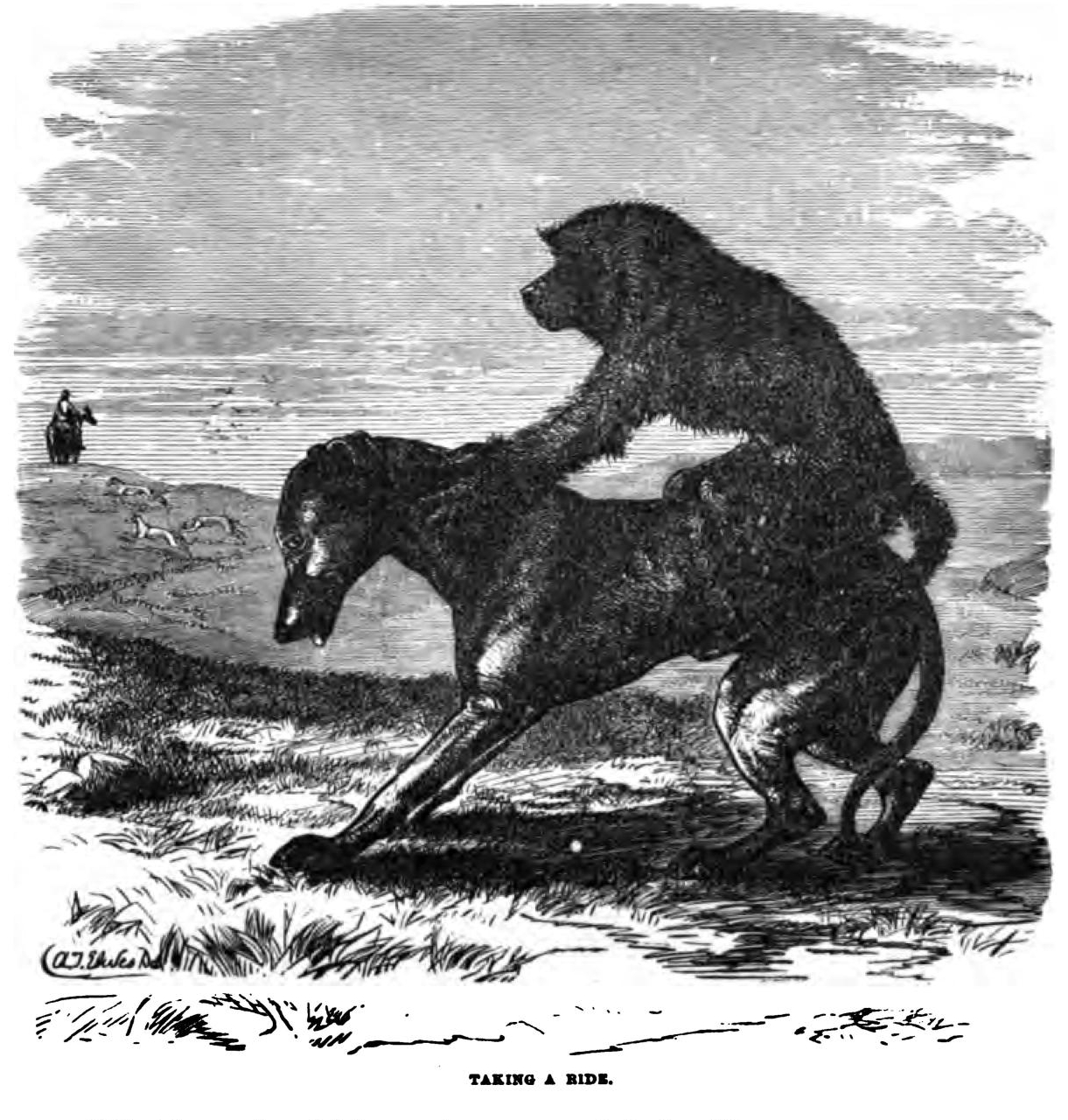

“But how about his serving as a watch-dog?”
“He can hear sounds that are inaudible even to the dogs; in a camp he will always give the alarm when danger approaches, and so much do the dogs rely on him, that they go to sleep in the fullest confidence that he will call them in case their services are wanted. When he gives the alarm, they are on the alert and rush in the direction he indicates.
“He generally lives on good terms with the dogs, and one traveler who carried a chaema tells how the beast used to jump on the backs of the dogs when he was tired. Some of them used to carry him without objection, but others did not like to be employed as pack animals. One in particular always stopped when the chaema mounted his shoulders, and allowed the caravan to pass on out of sight. The monkey did not like to be separated from the caravan, and as it disappeared over the plain or among the hills he would dismount and follow it. The cunning dog then joined him in running to overtake the caravan, but always managed to keep the chaema a little in advance, so that he would not be likely to jump again on the dog's shoulders.”
“Which shows that the intellect of the dog was superior to that of the chaema,” George remarked.
“The dog's reasoning powers are superior to those of the monkey.” said Mr. Graham, “but the latter has the greater faculty for pure imitation.—Ah! there goes the curtain and the performance is about to commence.”
Here is the account which Harry wrote after his return from the theater:
“The opening scene is entitled 'African Friends Meet—A dinner at Delmonico's.' Seated at a table on the stage when the curtain rises, are three monkeys, dressed in the height of fashion. They are Mr. Blackberry, a dude: Colonel Axletree, a retired army officer, and Miss Terrini, from the Darwinian Theater. Mr. Blackberry rings a bell which summons a waitress. The waitress hands the diners a bill of fare and each gives an order. Presently. M. Pouillon, the cook, comes in to consult the feasters, who explain just how they want everything served. The monkey cook bows in inimitable French style and departs. In a moment or two the dinner is served, the only unusual thing in the act being the fact that each monkey steals a portion of his neighbor's food. While his master's back is turned the cook takes a sly drink from a bottle, and also helps himself to the contents of a basket which he has been ordered to place on the table. The monkeys at the table appear to be in conversation, and the by-play among them is very amusing. The pantomine is excellent and the apes do almost everything but speak.
“The adventures of Robert Macaire are illustrated by two monkeys known as Cadieux and Ravennes, while another called Robinson does several clever acts as a circus rider. He rides upright upon a pony's back, jumps through rings and over hurdles.
Other monkeys stand on their heads, walk tight-ropes with balancing rods, turn somersaults, and do acts on the flying trapeze.”
On the way home from the theater the conversation about monkeys was continued, and the youths made mental note of several matters on which they desired information. Harry expressed his disappointment at the absence of tails on the performing monkeys, a circumstance which has already been explained. The youth said he had expected to see the creatures suspending themselves by the tail from the ropes where they were to walk or balance themselves; he thought it would have added materially to the interest of the performance, and wondered if the monkey trainers of Asia or Africa could not do better in this line than did Mr. Brockmann.
“As to that,” replied Mr. Graham, “I am in very great doubt or rather in no doubt at all. No Asiatic or African monkey can suspend himself by the tail, no matter how long that appendage may be.”
“Do you mean,” said Harry, “that none of the old world monkeys have prehensile tails?”
“Exactly so,” was the reply. “The only monkeys that can use the tail as a fifth hand, or for clinging to branches of trees, are found in America, and never in the old world unless they have been carried there from this country. But do not understand that all the American monkeys have prehensile tails; some of them have the tail wonderfully developed and useful, while others cannot hold on with it, and several varieties have almost no tails at all. A naturalist who lived four years in South America says that in that time he saw twenty-one varieties of monkey, seven of them having prehensile and fourteen of them non-prehensile tails. The Asiatic monkey does not seem to be aware that the tail can be made of any use, but the liveliest of the American monkeys employ it for picking up objects and for support while swinging among the trees. And we may further say that the monkeys of the old world are unlike those of the new, none of the varieties that exist on one side of the Atlantic being found on the other.
“The largest of the American monkeys is far below the largest of his Asiatic or African cousins in the matter of size. While several members of the baboon family are five feet in height, and a large gorilla is said to be six feet or very nearly when standing erect, the largest of the American monkeys, if we leave his long tail out of calculation, does not exceed three feet. He belongs in South America, and is known as the Howler, and he can howl louder than twenty men if the stories of travelers are to be believed. The noise he makes is so terrific, that many a traveler has been frightened by it and has thought that all the wild beasts of the woods had assembled close at hand, and were about to devour everybody and everything within their neighborhood. One monkey gives a howl, and when he is tired he signals to the rest tried to ascertain accurately how far the sound could be heard. Judging the distance by the time it took him to reach the tree where the monkeys were, he thought two miles not an over estimate; when the sound came across a lake unimpeded by trees it was easily audible a good three miles.”
George asked if these animals kept up their howling when in captivity?
“They all shout in chorus. After a while they stop, and then the solitary one starts up again. And in this way the unearthly chorus is kept up from midnight till sunrise; sometimes they begin at the close of day and keep it up all night, making it quite impossible for a traveler to sleep within a mile of them.”
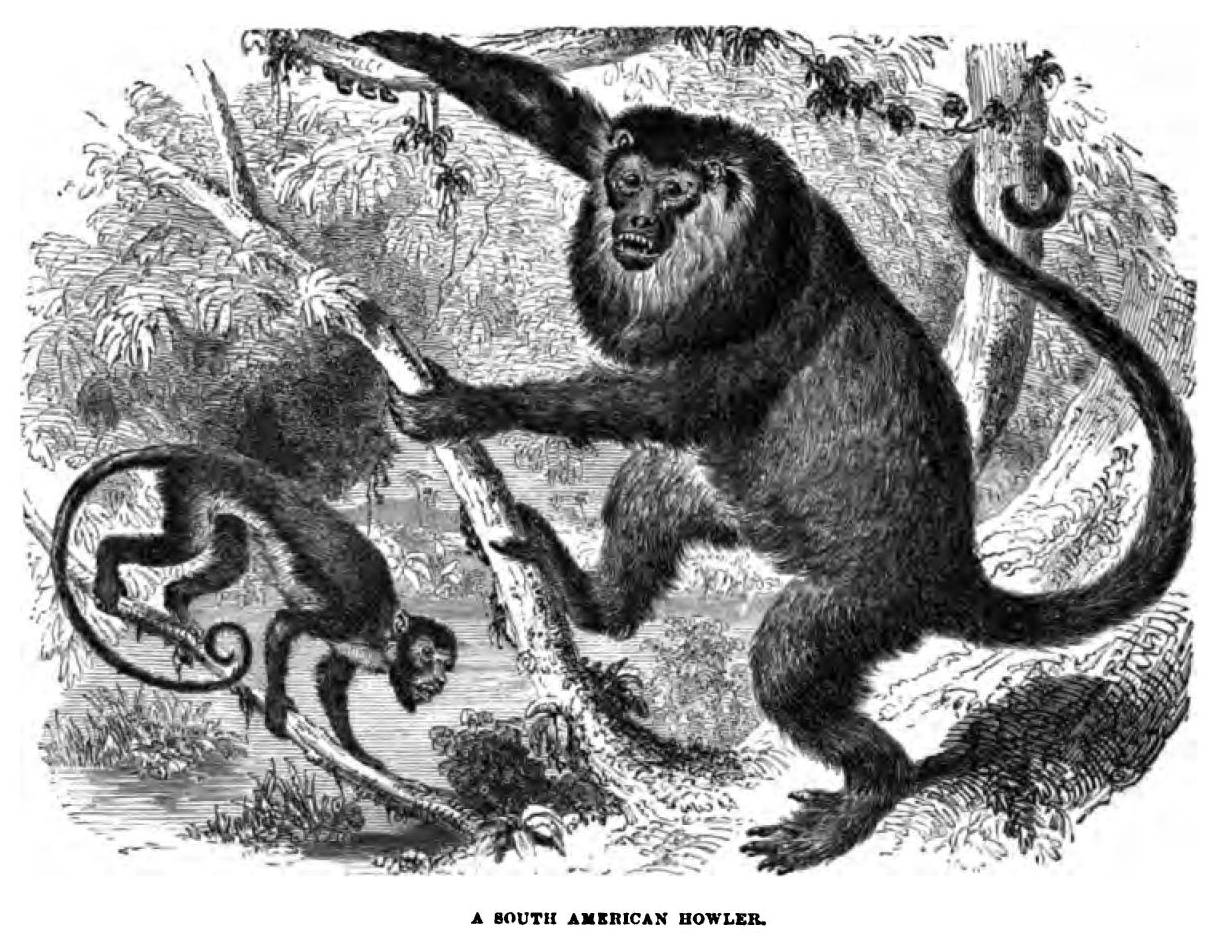

“Can they really be heard at the distance of a mile?” one of the boys asked.
“Yes, and farther still,” was the reply.
Mr Graham explained that they were active enough in the woods, but as soon as they became prisoners they lost all their spirit, displayed surly dispositions, refused to make friends with anybody, and soon died of grief.
Other varieties of South American monkeys were more tractable, Mr Graham further explained, and he specially mentioned the little spider monkey and a sapajou as amusing and affectionate.
“Some of these American monkeys,” Mr Graham continued, “show a great deal of intelligence, bordering upon reason. A naturalist who studied them in Brazil says that when one of them received an egg for the first time he broke it clumsily and lost half the contents, but so, he handled it with the greatest care. Lumps of sugar were occasionally given to him wrapped in paper; one day a live wasp was put in the paper with the sugar, so that when the monkey tore it open he was stung. After that he always held the paper to his ear and listened intently to detect any movement within.”
“Haven't I read,” said Harry, “about monkeys organizing raids upon orchards and gardens in a very systematic manner, just as boys or men might do?”
“Quite likely you have,” was the reply, “for such things are by no means uncommon. Monkeys are gregarious animals and hunt in the second time he only broke the top and lost nothing. Ever after that when he received an egg he gently broke the top by hitting it against a hard substance, and then picked off the fragments of the shell with his fingers. After cutting himself once with a sharp tool he would not for some time touch it again, and when he finally did troops; these troops generally have their chiefs, whom they obey implicity, and there would seem to be some mode of communication among them by which orders are issued and understood.
“The monkeys of Northern Africa come down from their places of concealment in the forest and rob the gardens of the people, carrying off the fruit by wholesale. Sentinels are posted to give warning in case of danger, then one of the troop climbs over the fence followed by another and another. They form a line from the wall to the tree which is to be robbed, and as fast as the fruit is plucked it is passed from one to another with the greatest rapidity. Those at the farther end of the line and outside of the garden wall, load themselves with all they can carry and then move away; as soon as the fruit has been stripped from the tree, or at the slightest note of alarm, the whole line scrambles off and is out of reach in a moment.”
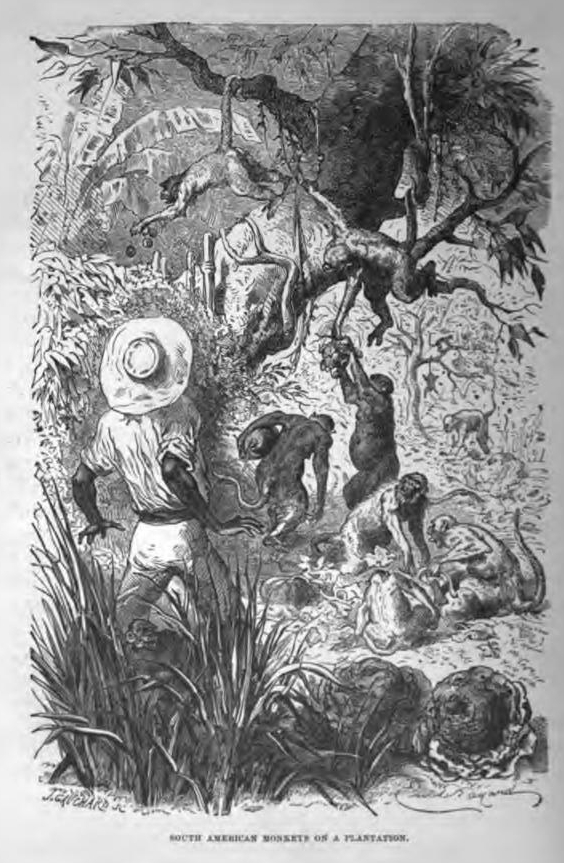

“How do they divide their spoil?” one of the youths asked.
“We don't know that,” was the reply, “but it is certain they have some form of division or they would not pass the fruit from one to another as they do. It is quite possible that the chief takes the best for himself and either assigns the others their shares or lets them quarrel over what he does not want.”
“Another instance of their close imitation of human customs,” said George with a laugh.
“Captain Mayne Reid gives an interesting account,” said Mr. Graham, “of how monkeys in the tropical forest of America cross a stream. It is an excellent illustration of the subject we have under consideration.”
When they reached home Mr. Graham found the book containing the story and handed it to Harry, who read aloud as follows:
“The half-human voices now sounded nearer, and we could perceive that the animals were approaching the spot where we lay. Presently they appeared upon the opposite bank, headed by an old gray chieftain, and officered like so many soldiers. They were of the comadreja or ring-tailed tribe.
“One—an aide-de-camp, or chief pioneer, perhaps—ran out upon a projecting rock, and after looking across the stream, as if calculating the distance, scampered back, and appeared to communicate with the leader. This produced a movement in the troops. Commands were issued, and fatigue parties were detailed and marched to the front.
Meanwhile several of the comadrejas—engineers, no doubt—ran along the bank, examining the trees on both sides.
“At length they all collected around a tall cotton-wood tree that grew over the narrowest part of the stream, and twenty or thirty of them scampered up its trunk.
“On reaching a high point, the foremost, a strong fellow, ran out upon a limb, and taking several turns of his tail around it, slipped off and hung head downwards. The next on the limb, also a stout one, climbed down the body of the first, and whipping his tail tightly round the neck and forearm of the latter, dropped off in his turn, and hung, head down. The third repeated the maneuver upon the second, and the fourth upon the third, and so on, until the last one upon the string rested his forepaws upon the ground.
“The living chain now commenced swinging backward and forward, like the pendulum of a clock. The motion was slight at first, but gradually increased, the lowermost monkey striking his hands violently on the earth as he passed the tangent of the oscillating curve. Several others upon the limbs above aided the movement.
“This continued until the monkey at the end of the chain was thrown among the branches of a tree on the opposite bank. Here, after two or three vibrations, he clutched a limb and held fast. This movement was executed adroitly, just at the culminating point of the oscillation, in order to save the intermediate links from the violence of a too sudden jerk.
“The chain was fast at both ends, forming a complete suspension bridge, over which the whole troop, to the number of four or five hundred, passed with the rapidity of thought.
“The troop was now on the other side, but how were the animals forming the bridge to get themselves over? This was the question which suggested itself. Manifestly by number one letting go his tail. But then the point d'appui on the other side was much lower down, and number one, with half a dozen of his neighbors, would be dashed against the opposite bank, or soused into the water.
“Here, then, was a problem, and we waited with some curiosity for its solution. It was soon solved. A monkey was now seen attaching his tail to the lowest on the bridge, another girded him in a similar manner, and another and so on until a dozen more were added to the string. These last were all powerful fellows, and running up a high limb, they lifted the bridge into a position almost horizontal.
“Then a scream from the last monkey of the new formation warned the tail-end that all was ready, and the next moment the whole chain was swung over, and landed safely on the opposite bank. The lowermost links now dropped off like a melting candle, while the higher ones leaped on the branches and came down by the trunk. The whole troop then scampered off into the chapparal and disappeared.”
A Famous Chimpanzee—Mr. Crowley of Central Park—His Origin and History—Details of his Early Life—His Training and Accomplishments—Elating at Table with Knife, Fork, and Spoon—Furniture of his Apartment—Drinking from a Cup—What he Eats and Drinks—His appreciation of Music—Refusal to wear Clothes—Ill of Pneumonia and Recovery—A bad Temper—The Gorilla and his near Relatives—The Gorilla at Home—Du Chaillu's Experiences—Friendship between a Dog and a Gorilla—The Orang-outang—His Home and Habits—Performances of a Baby Orang—The Gibbon—Gentlest of the Monkey Family—Mr. Newmian's Pet—Long-nosed Monkeys—Monkeys catching Crabs with their Tails—How the Traveler Lost and Recovered his Red Caps—The Monkey and the Mirror—The Orang that Saved the Child.
The afternoon of the day following the visit to the monkey theater was devoted to a visit to the collection of wild animals in Central Park. The special object of the visit was a famous chimpanzee known as Mr. Crowley, who was the wonder and admiration of many children and grown people on account of his intelligence and accomplishments.
Unfortunately for the interest of science and the amusement of the public, Mr. Crowley met the fate that befalls most monkeys who are brought from their tropical homes to colder climates; he died of pneumonia and pleurisy after having been several times dangerously ill.
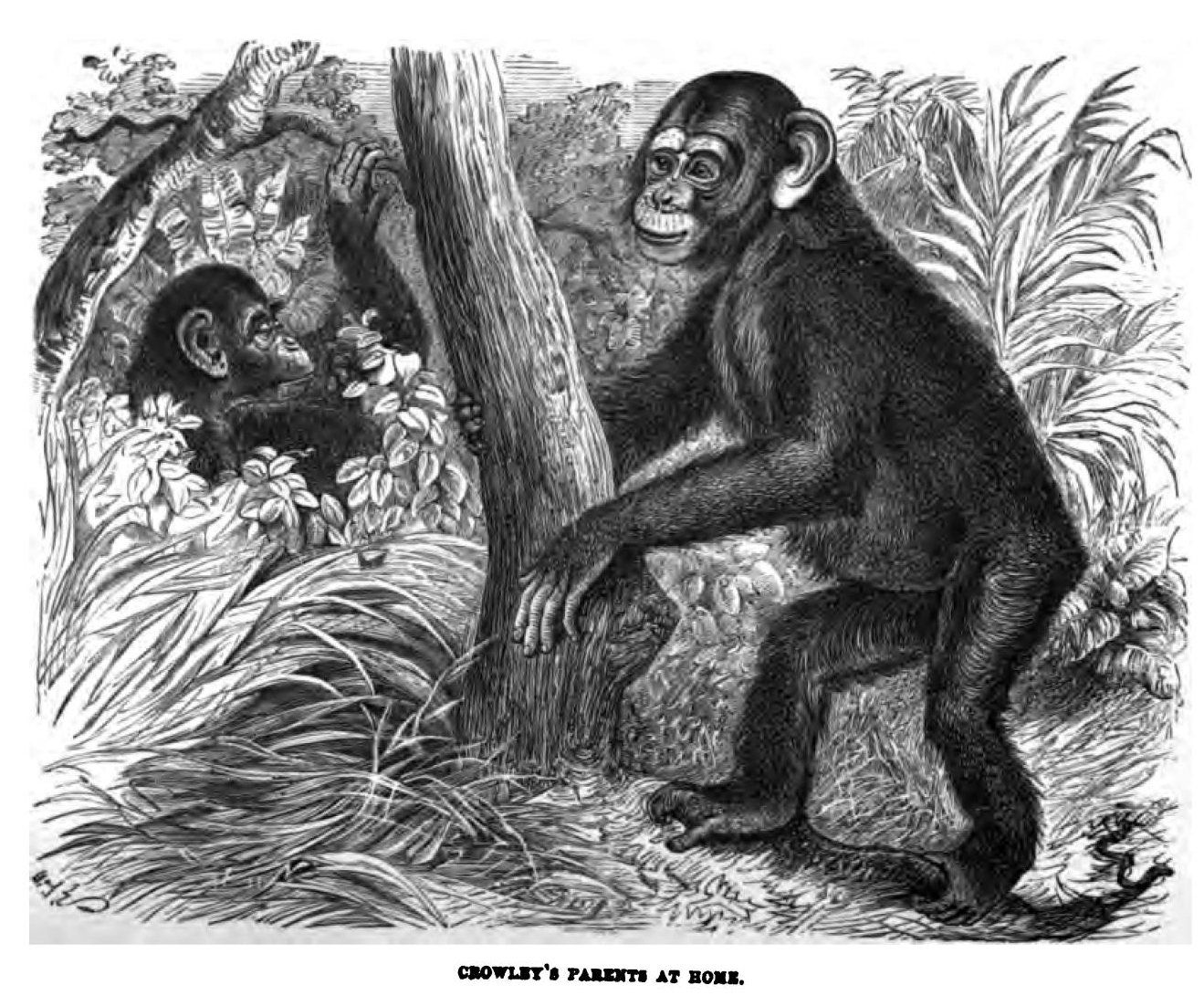

Monkeys rarely live long in northern countries; they die of pneumonia or consumption, generally in a few months, in spite of the greatest care in shielding them from the effects of draughts or chills. The tailless monkeys are more hardy than the tailed ones, but even they are not proof against the rigors of the north.
From his own observations, aided by free quotations from a little book entitled “Mr. Crowley of Central Park,” by Henry S. Fuller, George prepared the following description of this remarkable animal:
“Crowley was captured when very young in the forests of Africa, not far from Monrovia, Liberia. He was presented to the Central Park Museum by the Hon. Mr. Smythe, U. S. Minister to Liberia, and became a resident of New York in May 1884. He was then thought to be about six months old and weighed not far from twenty-five pounds; he was very active, and soon after his arrival a trapeze was fitted up for him on which he took great pleasure in swinging.
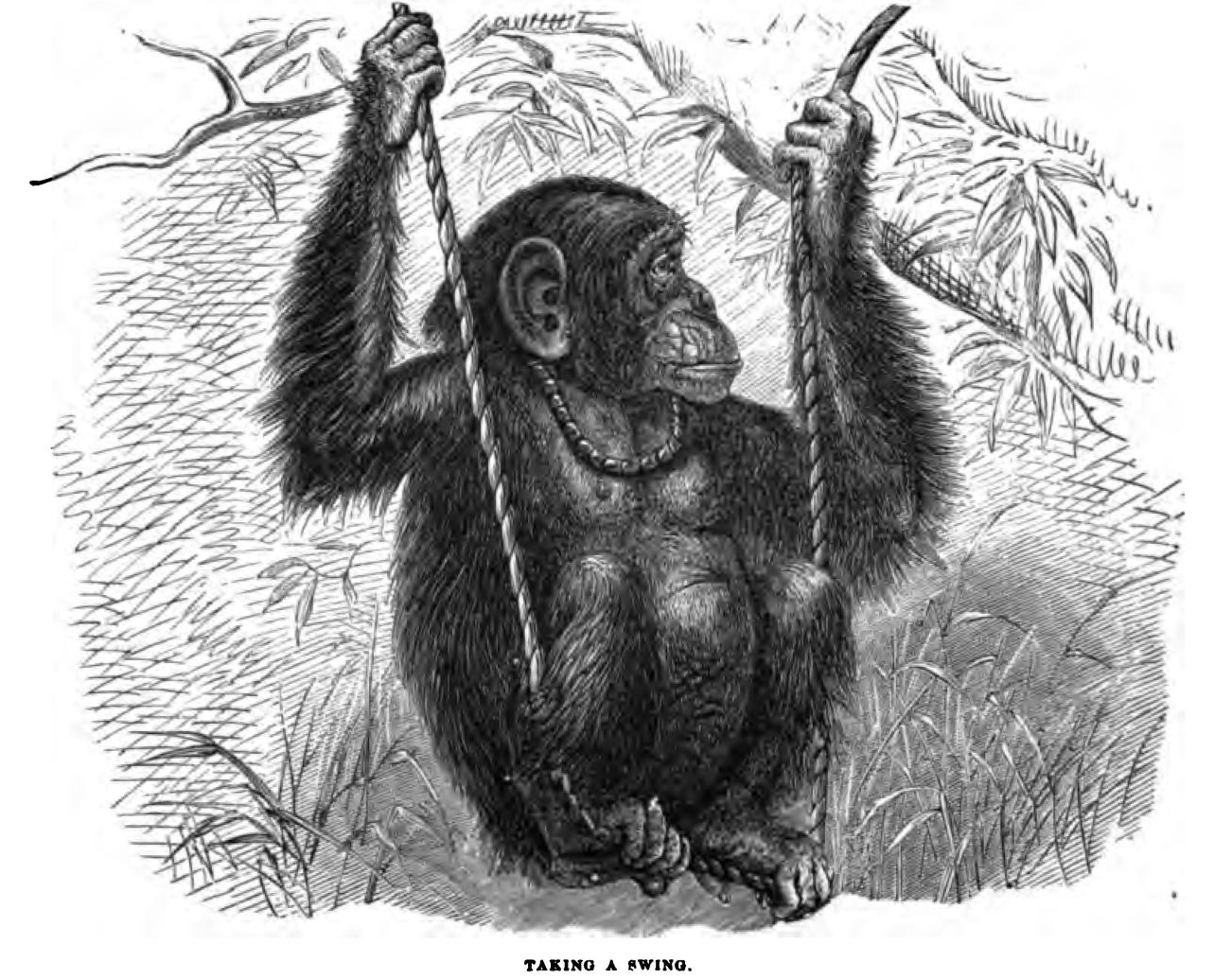

A pair of ninepins were obtained for him, in shape like small Indian clubs, and several wooden balls sufficiently large not to be slipped through the grating. He took great pleasure in making targets of the pins, and would hurl the balls at them with all his strength and chatter with delight when the targets were struck. Tiring of this, he would seize the pins, one in each hand, and exercise with these, not entirely according to the written rules of club exercise, but with a zest that was of equal benefit to the muscles; although, when he abandoned this practice and used them as drumsticks to batter the sides of his apartment, the uproar sometimes became too great to be endured.
“His meals were usually taken outside of his apartment. Seated in one of the office chairs about six o'clock, after his morning toilet had been made, he was handed a plate of boiled rice, sweetened with a little sugar, which he ate in genteel fashion with a spoon, and with apparent relish, often looking up at his benefactor with one eye in apparent gratitude, and only pausing an instant to wipe his spacious chin of little rivulets of rice that would trickle at times from the convex corners of his mouth.
A cup of milk would then be given him to aid the digestion of more solid food.”
“These meals were prepared punctually four times a day, a custom which has become of a second nature to the chimpanzee and continues to the present time. The first meal was in the morning, and a lunch followed about ten o'clock; between one and two he was given his dinner, and his supper hour was at five, after which he invariably indicated a desire to retire to his blanket and dispose of himself for the night. The lunch in the morning and the supper were often varied with fruit, an orange or a banana, which was first carefully prepared by peeling. Otherwise his diet was quite plain; all sweetmeats, candies and dainties being positively prohibited.
“During the fall of 1884, his weight, increasing at more than a pound a month, reached forty pounds. His height and strength developed proportionately. The coat of hair that had begun to appear upon his body was black and glossy. It was brushed daily, an operation which he seemed to enjoy; about the head, where it grew longer, a natural inclination was discovered to part in the center, and for better effect the hair was brushed down over his forehead and kept trimmed and banged, imparting a more civilized appearance when he was presented to visitors.
“On being permitted to view himself in a glass, Crowley expressed his entire approbation of this fashion. He displayed much vanity and did not soon tire of admiring himself. When he grasped a policeman's club that was in the room and paraded up and down with it for a cane, his appearance was striking. The natural stoop of his shoulders became profoundly English, and taken in conjunction with the cane, so thick and heavy in proportion to Crowley's figure, the resemblance was most perfect.
“He was quite conscious of his increasing importance, and took great pleasure in receiving visitors. He submitted to the cleaning of his nails and the scrubbing of his teeth, but the washing of his hands and face was always extremely distasteful to him. He never became entirely reconciled to that practice, and after he became older he discarded it almost entirely.
“A small chair and a table of solid oak were made for him, both articles being sufficiently heavy to withstand an outburst of animal spirits that he sometimes indulged in after a meal. For the same reason his dishes were of the heavy ware used in down-town restaurants. He had previously learned to drink from a cup and sip his milk with a spoon. Now he was instructed in the use of knife and fork, and in the absence of meat or other solid food, he carved into slices the bananas and other fruits given him, and conveyed these slices to his mouth on the fork.
“One admirer sent him a napkin enclosed in a plated silver ring. The ring was engraved, 'Remus Crowley, Esq.,' and a corner of the napkin had also the name embroidered on it. After inspecting both with grave deliberation, he grunted his appreciation, and proceeded to thrust the napkin into his mouth. Much patient persevering was required to impress upon him the importance of laying the napkin on one knee, or of folding it over his chest while eating, and that its function was to keep his mouth and chin clean, but repeated instructions at last instilled these precepts on his mind.
“The chimpanzees are keen, observant animals, and Crowley inherited the full gifts of his race. Little that transpired around him escaped his attention, while his understanding was not less ready and intelligent. In a few days he learned to lock and unlock the doors of the room in which he lived, and to hide the key which was used to lock him in the apartment. More care was needed with him than for a child of live years. If he could not express himself intelligently in speech. He was neither deaf nor dumb, and he had a vocabulary of his own made up of gutteral monosyllables, which his attendant professes to understand quite well, though to the uninitiated it is more than Greek or Sanscrit.”
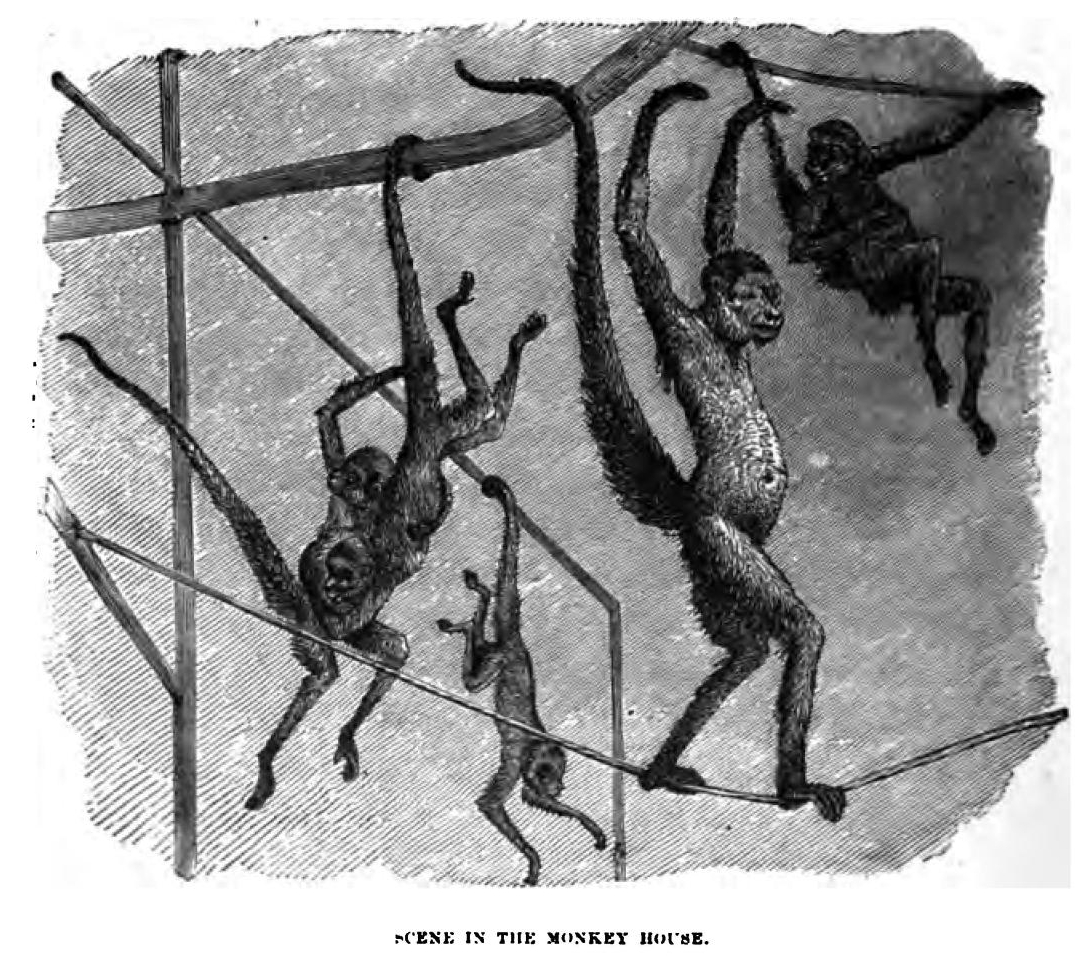

“'Shall I wash your face, Crowley?' asked his keeper.
“'Ooh! ooh! ooh!' exclaimed Crowley, moving away disgusted. 'That means no,' explains the attendant.
“'Here's an orange, baby.'
“'Ut, oot, oot, oot!' and Crowley thrust out a fist eagerly. His other expressions are more complex, except with regard to pain or pleasure. With the first he utters a yell that would startle a Sioux Indian; when pleased, the ends of his mouth stretch to each ear, while he dances and mumbles with enjoyment.
“By the summer of 1885 Crowley weighed fifty pounds and was very vigorous. A new cage was made for him in the west end of the monkey house; it was about ten feet long, six feet high, and of the same width, open on all sides, and protected by a grating of iron wire, the thickness of a lady's little finger. One of the new features introduced in it was a swing or trapeze; a wooden bar suspended at one end of the cage by two stout ropes from the ceiling. At the other end of the cage was a spring board, to enable him to indulge to his full bent in his propensity for leaping. When placed in his new quarters he made a dignified circuit of his room, walking as erect as possible, only resting on the knuckles of his hands, or supporting himself by holding to the grating, He inspected the spring-board as if accustomed to spring-boards of various patterns, and passed on without testing its elasticity. The trapeze he eyed with some curiosity, but did not deign to try it.
“At the close of his second summer, it was decided that many changes would be needed another year, to fit that place for his growth. When standing erect, and flat on his feet, Crowley was now nearly four feet in height. He had outgrown the baby chair provided for him the first year, and it was succeeded by one better suited to a person of his size and importance. A bedstead of oak was procured, so that instead of stretching himself on the hard floor, he could sleep like other people. The bedstead was five feet long and three feet wide, giving him ample room to turn around without rolling out; but for greater security it was attached to the floor with iron braces, which defied, for the time, Mr. Crowley's ingenuity to unscrew, and his strength to remove from their places.
“Crowley had a fondness for music. Whenever his attendant produced a mouth organ and played on it “Sweet Violets,” or “Yankee Doodle,” the chimpanzee's whole attention was at once arrested. He would listen for a few moments intently, and as the air proceeded, a state of great nervous excitement would come upon him. His body would begin to sway in unison with the attendant's foot as it beat upon the floor, until at last, no longer able to contain himself, he would spring up and down in a chimpanzee jig, which appears to be a kind of cross between a Virginia reel and an Irish break-down, keeping this up until he became exhausted or the music ceased. When the instrument was given to him and held for him, he would blow upon it and try to reproduce the sounds which caused him pleasure, and when he succeeded, an expression of delight would brighten his flexible features. But his performances were never such as to warrant his applying for a situation in Theodore Thomas's orchestra or even in an ordinary street band.
“With the winter of 1887-88 Crowley entered upon his fifth year. He had attained the weight of nearly one hundred pounds, and when erect he stood quite four feet two inches in his bare feet. His hands were as big and knotted as those of a negro laborer inured to toil, and his muscles were thoroughly developed. His temper did not improve, and it became necessary to apply a whip to him occasionally to keep him under discipline. During the winter he had an attack of pneumonia, and when the fever came on all his bluster and bad temper disappeared. His strength left him and he became quite helpless, lying all day on the floor in the center of his cage, his head resting on one arm for a pillow, with a piece of heavy bagging beneath him for a mattress. When strangers entered his cage he was too weak to raise his head. Many physicians called to see him and tender their services. He recognized their kindness and their purpose with a low grunt, which often ended in a fit of coughing.
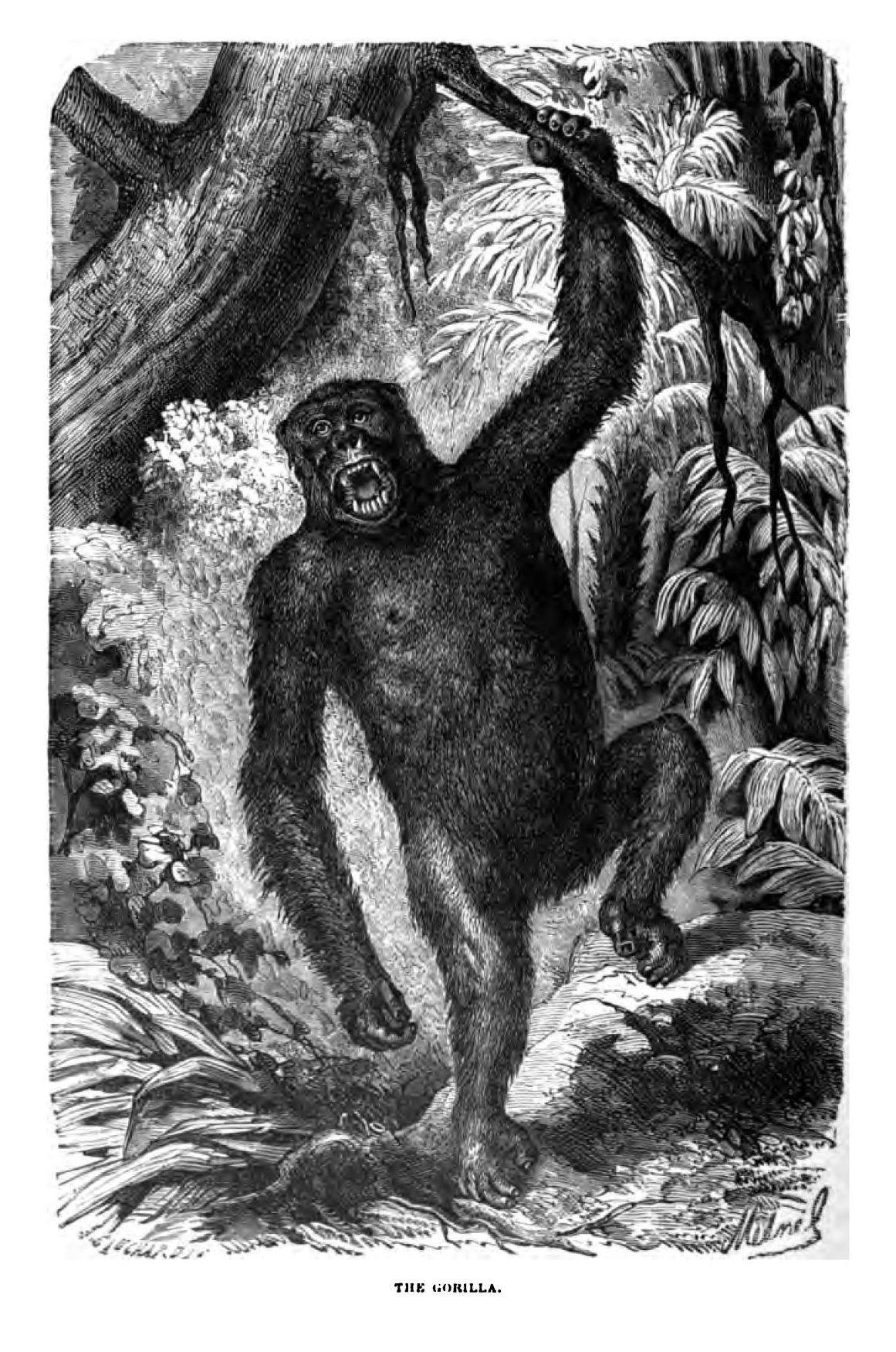

“When requested, he would proffer his arm for the physicians to feel his pulse, turn over that the breathing in his chest might be listened to, and show his tongue for examination. For a long time he regarded the thermometer used to secure his temperature with suspicion. It could not be placed beneath his tongue for fear of the consequences, but, as he became weaker, and unable to repel the liberties, he was persuaded to hold the instrument under an arm.
“All that could be done for Crowley seemed of little avail, and for two weeks he remained in this hopeless state.. His temperature at times rose to one hundred and five degrees, and pulse beat nearly a hundred. In the absence of hot applications, only hot teas and liquors could be given him. A concoction of rum and molasses was prepared and he was prevailed on, at a critical point of his illness, to swallow a large dose of this, to which a quantity of brandy was added. Soon after swallowing it he fell into a heavy stupor which continued for several hours. About midnight he startled his attendant by suddenly leaping into his trapeze with all his old nimbleness. He bounded upon his spring-board and for an hour danced and shouted in his cage, and then staggered and sank down in a profound perspiration. He was covered with a blanket and slept soundly until morning.
“When he awoke, there was something like the old grin on his face as he looked up at his keeper.
“'Comin' around, old man?' asked the keeper tenderly.
“'Oogh, oogh!' muttered Crowley, faintly, and closed his eyes.
“Sure enough he was on the way to recovery. His strength and flesh returned, and with them his occasional displays of bad temper that required the use of the whip.”
“What is the difference between the chimpanzee and the gorilla?” Harry asked, when George had finished reading his description of Mr. Crowley and his curious ways.
“The name has sometimes been given to all the great apes, including the gorilla and the orang-outang,” said Mr. Graham, “but it properly belongs to the lowest of the man-shaped apes of equatorial Africa. The gorilla stands at the head of the list; then comes the kooloo-kamba, then the nachiego-mbouve, then the soko, and after these the chimpanzee. They are all so closely allied that any one but a close student may mistake one for the other, and this circumstance has led to confusion in the stories of explorers.
“In size and shape the gorilla approaches more nearly to man than any other of the monkey family, but he is still a long way from being able to claim one of us as his brother. The arms are so long that they almost touch the ground when the animal stands erect, which he does not do easily.
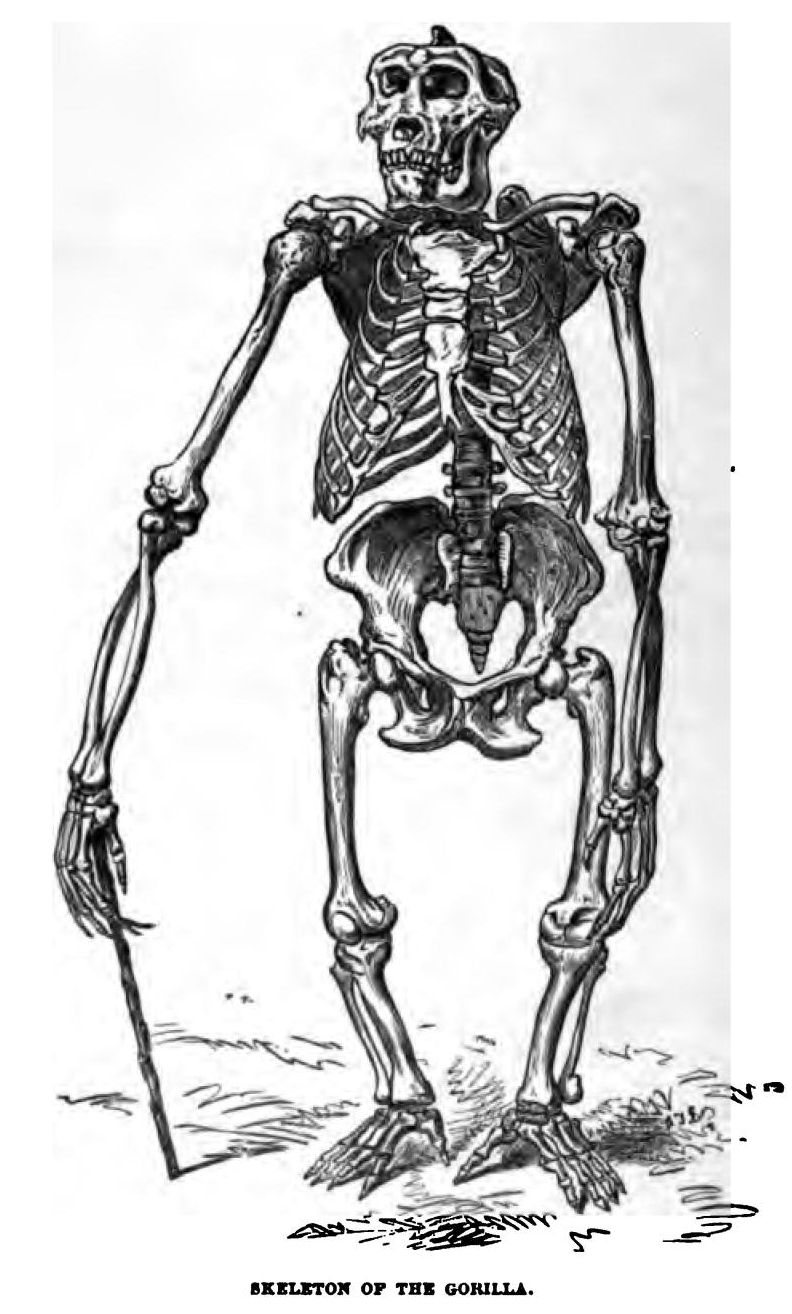

“Mr. du Chaillu was the first explorer to see the gorilla at home; he killed several specimens of this remarkable creature and sent their skins to England, but though he tried very hard to bring away a living sample he was unable to do so. Later travelers have been more fortunate, and I have read to-day in a newspaper that Boston has just received from Africa the largest gorilla ever landed in this country. His name is Jack, and he is five feet in height when standing erect, and measures seven feet from the end of one outstretched hand to the other. He weighs about one hundred and twenty-five pounds and exhibits enormous strength, compared with which that of man seems like a child's. He arrived in a large box made of planking two and a half inches thick, and when being removed from the ship he tore large splinters from the hard wood planks with as much ease as a child would break a twig. The hair, which is very coarse, and from two to four inches in length, is of a greenish-gray color, and on the back, legs and arms inclines to a black. His shoulders are immense. The expression of his face, which is black, is scowling. The eyes are small, sunken in the head, and the lips large and thin.”
“I suppose the gorilla does not make as good-natured a captive as Mr. Crowley, for example,” one of the boys remarked.
“Not by any means,” answered Mr. Graham. “He is of an ugly disposition and generally refuses to be tamed, though occasionally one is found that is comparatively submissive. Some years ago a gentleman bought a gorilla that was thought to be about two years old and shipped it to England. It was not spiteful or obstinate in its ways, but seemed to be very shy; its owner thought the best plan was to allow it to run about the ship, and after it was given its freedom it got along very well. It would take food from the hands of passengers and sailors, but permitted no familiarity; it formed a great friendship for a bull terrier, and the two used to play together by the hour, the dog occasionally giving a very sharp nip which was not resented by the larger animal. But, unfortunately, the gorilla was missed one morning, and was supposed to have fallen overboard during the night.”
“The gorilla is the largest monkey of Africa and in fact of the whole world. The largest Asiatic monkey is found, not on the continent of Asia, but on the islands of Sumatra and Borneo. He is know to foreigners as the orang-outang or wild man of the forest, and is generally called 'mias' by the natives. Many of the people believe that the creature is a human being who lives in a wild state, and hence the name by which he is described to strangers. In habits, size, and general appearance, the mias is much like the gorilla, but he is more easily tamed and kept in captivity. He lives in the forestand travels from tree to tree without descending to the ground; in fact he sleeps in the trees, making a bed of leaves among the branches. Mr. Wallace, a naturalist, describes how he shot at a mias and broke his arm. The animal was in the top of a tree at the time, and immediately proceeded to break off branches and make a nest for himself. Mr. Wallace fired at him several times, but he did not quit his work, and he finally laid down in the nest and died there from the effects of the shot. It was necessary to cut down the tree in order to obtain the body, which proved to be a very large one.
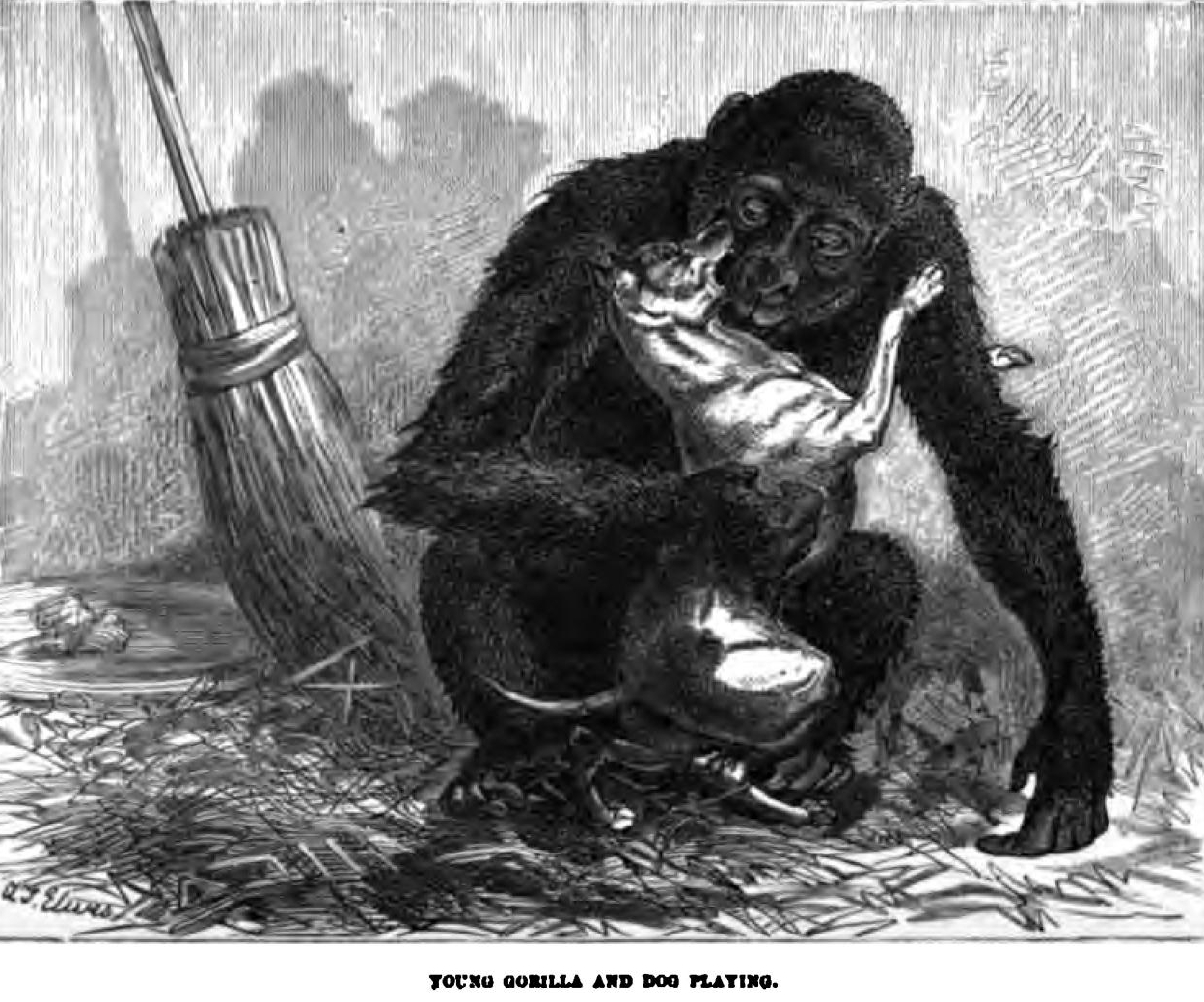

“Mr. Wallace caught a young mias and managed to keep it six or eight weeks; he hoped to be able to take it to England, but it died at the end of that time, probably from the impossibility of obtaining proper food. He said it would cry like a child when hungry or when its food did not suit its taste; if its keeper persisted in offering food that it disliked it would scream and kick violently, exactly like a baby in a passion. Altogether he thought it very human in its actions, and was very sorry when it died from intermittent fever.”
Harry asked if the gibbon monkey which comes from Siam and the neighboring countries was anything like the mias.
Mr. Graham explained that the gibbon was much smaller than the gorilla or the orang-outang, and more human in his general appearance. He is a delicate creature and cannot exist in a cold climate even with the greatest care. An adult gibbon rarely lives more than a few weeks in captivity, and when captured young the animal does not usually reach maturity. The gibbons are very gentle in their manners, devotedly attached to their masters when kindly treated, and not at all mischievous.
“On a steamer that carried me from Bangkok to Singapore,” said Mr. Graham, “one of the passengers, Mr. Newman, had a gibbon which he was undertaking to carry to England. The little fellow was very gentle and playful and easily made friends with all the passengers. Mr. Newman said he had kept the monkey at his house in Bangkok and allowed him the largest liberty.
“The house was full of bric-a-brac and curios of various kinds, but the monkey went about with the greatest care and never injured anything.
“One of his favorite amusements was to race around the verandah of the house with his master, the two starting from one point and going in opposite directions. Frequently he came in the morning and by signs indicated that he wished a race; Mr. Newman generally allowed the monkey to beat him, and the creature always seemed pleased at his triumph.
“He sat at the table and drank milk and coffee from a cup, and his manners in general were far better than those of most monkeys in captivity.
“Another gibbon that was being carried to England on a steamer would walk the entire length of the saloon table at dinner without breaking or even touching anything upon it, although the table might be covered with glasses and plates and the vessel was rolling heavily. He would start from the foot of the table, walk to the other end to take a glass of wine with the captain, and then return in the same careful manner. The wild gibbons drink by scooping up the water with a single paw, and it requires some patience to teach them to drink from a glass or cup in a human fashion.
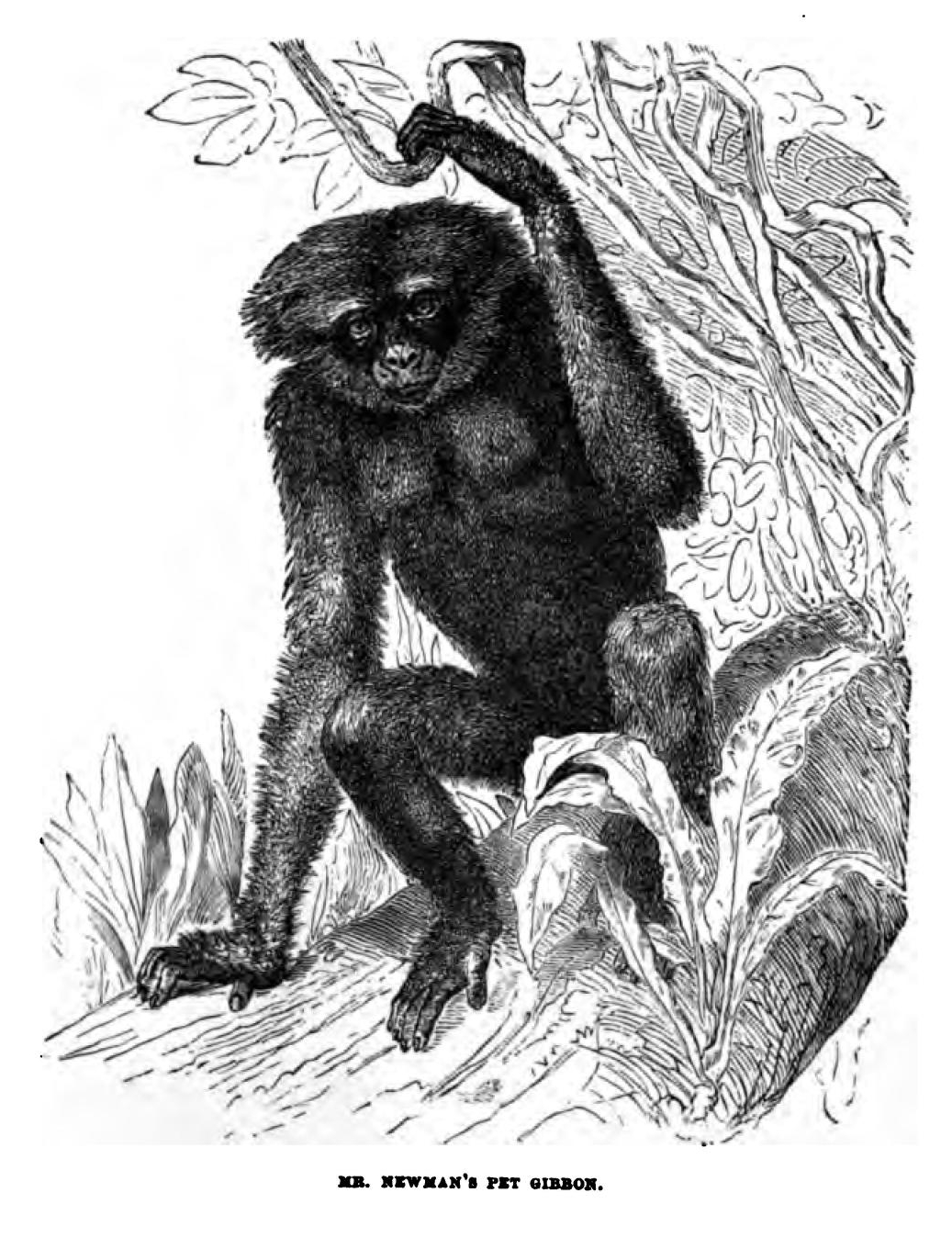

“But of all the monkeys in the world,” continued the gentleman, “the most comical is the long-nosed monkey of Borneo; as far as known it has been found nowhere else than in that island. He grows to the size of a large pointer dog, lives in the same forests with the orang-outang, and probably associates with him. He has a funny appearance at any age, but perhaps the funniest when young and the nose has just begun to develop. Its hair grows naturally down the sides of the head as though parted by a comb, it has whiskers but no mustaches, and it has a long tail which starts high enough up the back not to be in the way when the animal sits down.
“The Dyak natives believe that these monkeys are a race of men who have fled to the forest in order to avoid the payment of taxes!”
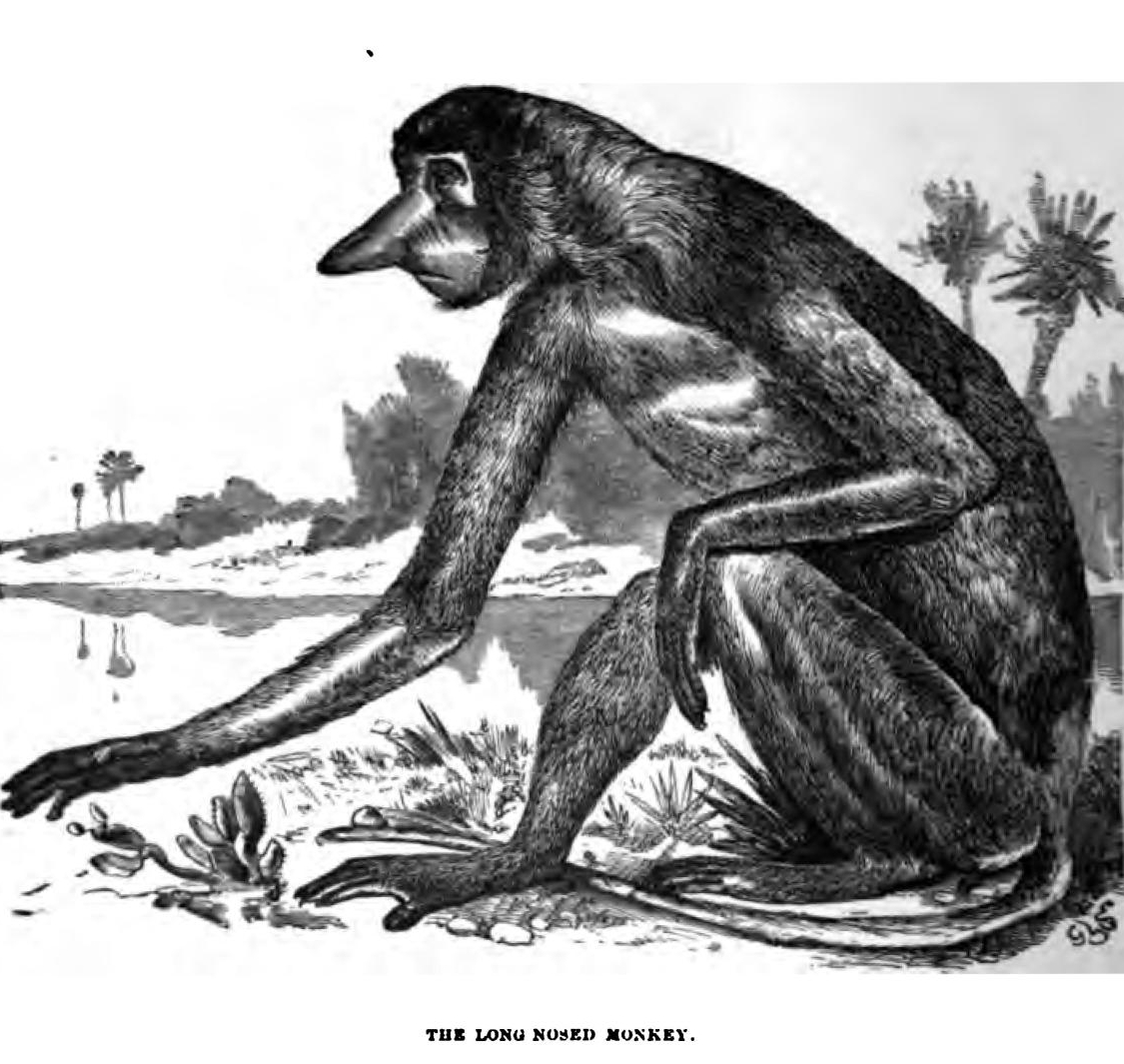

“And now,” said Mr. Graham, glancing at his watch, “we will drop the subject of apes and their kindred until to-morrow.”
The youths took the hint and no further questions were asked that evening about quadrumana and their strange ways. But the next day they were ready with several “monkey stories,” some of which are worth repeating.
Harry found the following, which certainly shows a reasoning power on the part of the monkey:
“There is on the coast of Java a peculiar long-tailed monkey, and a sand crab that grows to extraordinary size and possesses great strength in its claws.
The monkeys are particularly fond of these crabs, which live in deep holes in the sand, but spend much of their time on the outside of their holes, where they run and hop about. They range in size from that of a silver dollar to that of our edible crabs. Their claws are not large, but have a grip that is vise-like. The monkeys make daily raids on the haunts of these crabs, and occasionally succeed—by creeping stealthily to within a few feet of a group of them and then springing down upon them—in capturing one. Usually, however, the crabs are so wary that while the monkey is in the air during his spring toward them they have separated and disappeared into the ground. The monkey finding himself too slow to make a capture, then resorts to a bit of strategy to secure a dinner; he backs himself up to a hole into which a crab has disappeared, and sitting down, thrusts his long tail into the hole. The crab seizes the end of the tail the moment it approaches near enough. Any one who may have been fortunate enough to hide himself in the bushes unobserved by the monkey making a raid, will have a hard time to restrain his laughter when the critical moment of contact between the crab's claw and the monkey's tail is reached. There is a look of comical suspense on the monkey's face as he thrusts his tail in the hole. When the crab closes on the tail the look of suspense departs. The monkey gives an involuntary start, and then settles on his haunches while he closes his teeth together with a determined air, and eventually, springing forward, out comes the tail from the hole with the crab dangling to it, and the monkey is soon proceeding with his meal.”
“Here's another story,” said George, “which is old but good: 'A Spanish mule-driver once invested his scant earnings, purchasing a number of red woolen caps, which form the crown of the turban worn throughout Turkey and Africa, and set out to make his fortune in the interior.
He started before sunrise, and, when the heat of the day came on, lay down to sleep beneath a tree in a wood. Taking off his hat he opened his valise, and, putting on a red cap, was soon asleep.
“'When the sun was low in the horizon he awoke, and to his horror, saw the trees tilled with monkeys in red raps. They had seen the Spaniard put on the red cap before going to sleep, and followed his example. The poor Spaniard, with all the gesticulation peculiar to his country, stamped his foot in anger, and tearing off his red cap threw it on the ground, when—blessed and unexpected result—all the monkeys followed his example. He picked up his caps and moved on.'”
“Here's a story from a St Louis newspaper,” said Harry, “about an incident that must have been very funny:
“'Yesterday was a good day for the monkeys at the Fair grounds, and they liked it. They frisked about in the sunshine, and cut their antics with an abandon that showed them to be bubbling over with fun and mischief. There is one that by some amusing peculiarities becomes an immediate favorite with every spectator. A gentleman in the crowd yesterday happened to have a small pocket-mirror, and just for sport passed it to the favorite. The monkey's behavior, on seeing his face reflected in the glass, kept the crowd in a roar of laughter for nearly an hour. The monkey of course failed to recognize the reflection of himself, and took it for another monkey, and his anxiety to get hold of that monkey was what made the fun. He would look behind the glass, and feel for it in such a comical way while he was looking in the glass, that one could not help laughing. While the glass was close to his eye he gradually bent over, casually, and noticing that the evanescent monkey was on his back apparently he dropped the glass and made a sudden grab for him. When he didn't get him he looked surprised and commenced looking under the straw to see what had become of him. He was then seized with a luminous idea. He picked up the glass and ran to the topmost branch of the dead tree that is erected in the cage, and climbing to the extreme end, again looked in the glass. It seemed he reasoned that in such a position the monkey could not get away. He felt for it, grabbed at it, and tried all sorts of strategy to capture it, notwithstanding repeated failures.'”
That the monkey can be a hero is shown by a story which George found in Our Animal Friends, credited to The Children's Treasury.
“A nobleman had a favorite monkey, a large orang-outang.
This monkey was very much attached to his master and to the baby boy who was the pet of the whole family. One day, a fire suddenly broke out in the house, and everybody was running here and there to put it out, while the little boy in the nursery was almost forgotten; and, when they thought of him, the staircase was all in flames. What could be done?
“As they were looking up and wondering, a large hairy hand and arm opened the window: and presently the monkey appeared with the baby in his arms, and carefully climbed down over the porch, and brought the child safely to his nurse. Nobody else could have done it; for a man cannot climb like a monkey and is not nearly so strong.
“You may imagine how the faithful creature was praised and petted after that. This is a true story, and the child who was saved was the young Marquis of Kildare.”
A Calf saving a Child from Drowning—Another that Seasoned—Illustrations of the Intelligence of Horned Cattle—Oxen taking care of Sheep—The Cow that sought Help for Another—Natural History of the Ox—Peculiarities of the Bison—Encounter with a Bull-bison—How a Hunter Escaped being Trampled to Death—Stampeding a Herd—The Aurochs or European Bison—A bad Character—The Yak and the Musk-ox—Mr. Graham's Narrow Escape from an Egyptian Buffalo—The Cape Buffalo—How the Natives Hunt him, and are Hunted by him.
Here's a good story,” said Harry, “about the intelligence of a calf. It is copied from the Atlanta Constitution.”
Mr. Graham and George listened attentively while Harry read as follows:—“Little Dillie Welsh is the four-year-old daughter of Yard-master Welsh, of the Louisville and Nashville Railroad.
She is bright and a general favorite. Her father keeps a Jersey cow, which has a calf. The calf and little Dillie have formed a mutual affection.
“In the adjoining lot to Mr. Welsh is a mineral well, which has a low opening, and a child can stand and look over it. A few days ago Dillie and her calf were playing near the well when the little girl went too near. She crawled up and was looking over, when the calf came up and held onto her dress with his teeth. She lost her balance and fell over in the mouth of the well. The calf held on to the child's clothes while she was suspended in the air over the water. If the animal had let go the dress, the child would have been drowned. The child was rescued by a servant, and the calf was happy.”
“That's a very pretty story,” said George; “and I have a good one to go with it.” Thereupon he read something which he said was from The Greenville (N. C.) Reflector.
“An amusing incident occurred at the home of Mr. S. M. Jones, near Bethel, recently. Among his cattle was a calf that seemed to possess a very great dislike to being roped at milking time and always made quite an objection. One morning Mrs. Jones went out to attend the milking, and upon looking in the accustomed place for the rope failed to find it. While the search for it was going on the calf thought, perhaps, to get more than his share of the milk, but something seemed to interfere with the imbibing process, and his peculiar actions attracted attention to him, whereupon it was discovered that the calf had swallowed the rope, but failed to make a complete job of it, as the noose was hanging from one corner of his mouth. The noose was laid hold of and a steady pull brought the rope to light. The calf is sufficiently amused and doesn't swallow any more ropes to evade being tied.”
“Isn't it unusual for calves or any of their relatives to display as much intelligence as we have in these two stories?” one of the boys asked.
“Decidedly unusual,” was the reply, “and that's the reason why these performances have been placed on record. But the fact is,” the gentleman continued, “that the ox is not as stupid a creature as is generally supposed. He is patient and slow, and for this reason the conclusion has been arrived at that he is correspondingly dull. The naturalists tell us that some of the tribes of South Africa trust to oxen to care for their flocks, and that the sagacious animals perform their duties in a manner worthy of the highest praise. They are quick to discover the approach of danger, and if the flocks are attacked by wild animals the oxen show a great deal of bravery in defending their charges. But while brave, they are prudent, and will not take any needless risk. When night approaches they drive the flocks to the camp or village, and if any of the sheep are inclined to straggle. The watchful guardians prod them in no gentle manner with their horns and make them understand that they are liable to severe punishment.
“The South African oxen are not only used for teaming purposes like oxen in other parts of the world, but they are excellent for carrying burdens on their backs. African hunters tell how they have used oxen in this way. Andersson, a famous hunter in South Africa, had an ox that he rode more than two thousand miles, and for ordinary traveling preferred him to a horse. When it came to pursuing wild animals, and especially to escape from a furious elephant or lion, he found a great advantage in the superior speed of the horse. His plan was to ride the ox while traveling and reserve his horse for hunting expeditions.
“There are many varieties of bovidae,” said Mr. Graham, “as this family is called, and these varieties have certain subdivisions. The most remarkable are the American bison, commonly called the buffalo, the European bison or aurochs, the yak of Tartary, and the musk ox of the extreme parts of North America. The greatest intelligence of the bovine family is displayed by the wild animals, for the reason that they have been obliged to depend entirely on themselves, while the domestic species have the protection and care of their owners on whom they rely. A domestic ox or cow, when in trouble, will seek the aid of his master when it is possible to do so.
“I was reading not long ago,” said Harry, “of a cow that came from the pasture one afternoon, and called the attention of some of the men about the place in a way which told very plainly that help was wanted. She repeatedly tried to induce somebody to follow her; when she finally succeeded she trotted off and led the way to a clump of trees, where another cow had become entangled in such a manner that she could not free herself without assistance. When the prisoner was liberated both she and the cow that had gone for help fairly danced about the man, and showed in every way in their power how grateful they were to him. They licked his hands with their rough tongues, caressed him with their noses, and when he returned to the barn they trotted along, one on each side of him until he reached the gate. Then they went back to to pasture and resumed their grazing.”
“Many stories of the same kind have been told about domestic cattle, all of them showing the reliance that these good-natured animals place upon man.
The time when they were first domesticated is unknown; the Egyptians had their herds of oxen and cows, and some naturalists think the ox was a domestic animal while the dog and cat were still in a wild state, in other words it was the earliest animal which submitted to the control of man. Centuries of domestication have made him the patient and gentle animal that he is, but he retains enough of his original instincts to be made wild again without much difficulty. A herd of cattle turned loose and allowed to run free for a single season are half wild at the end of it, and very difficult to manage. A few seasons make them fully so, and the calves that grow to maturity without any association with man seem to have lost everything that came from centuries of domestic ancestors. The wild cattle of South America are descended from tame ones and the same may be said of wild cattle in most parts of the world.”
George asked if the buffalo of America was anything like that of the old world. He said he had read about the differences between them but couldn't remember what they were.
“The name of buffalo,” said Mr. Graham, “is improperly applied to the bison, whose scientific name is Bison Americanus. The American bison is rapidly becoming extinct, and it is quite probable that there will not be one of these animals alive at the end of the present century. Fifty years ago there were countless millions of these animals, and as recently as twenty-five years ago vast herds of them roamed the western prairies from Texas to the Saskatchewan.
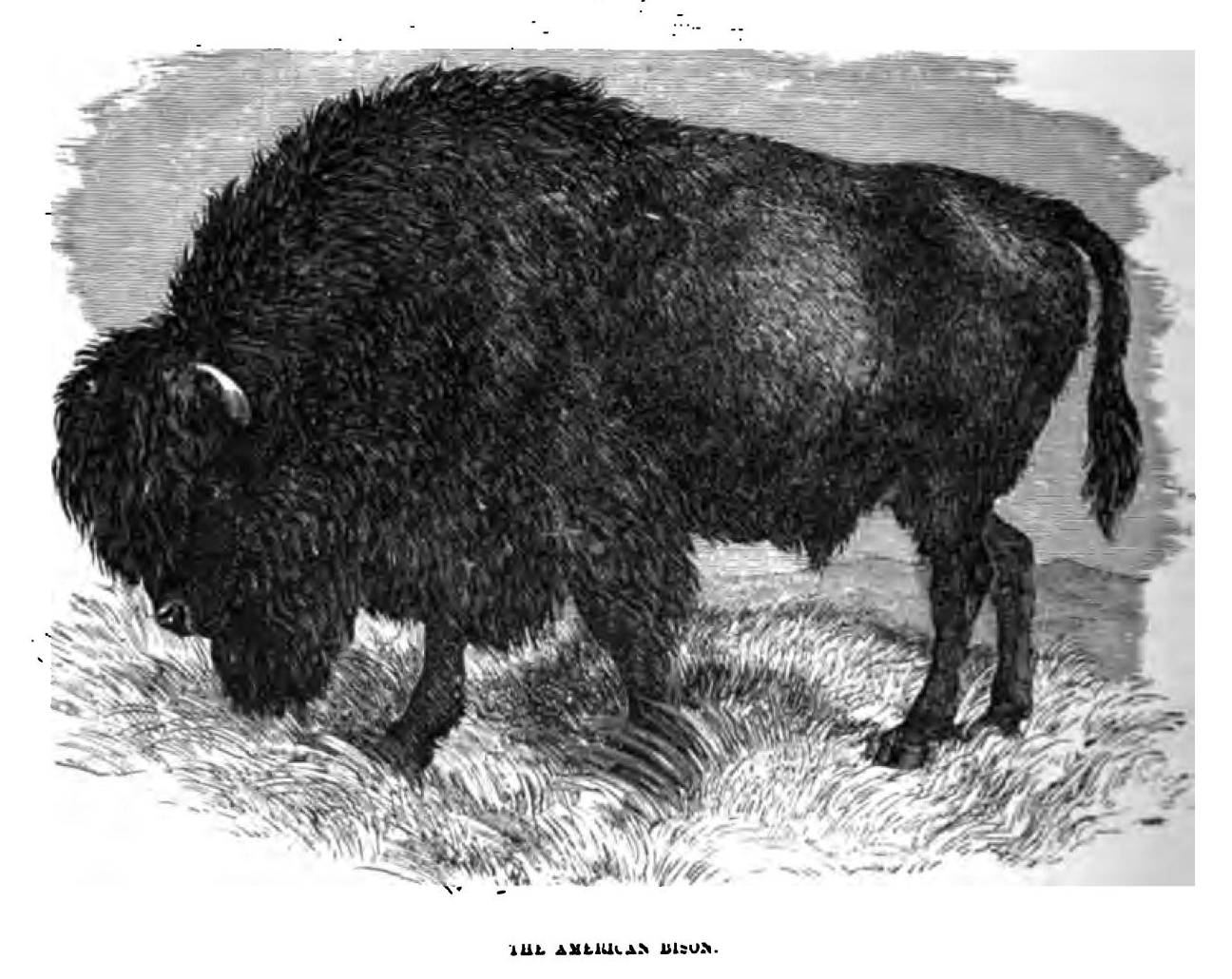

At this moment their numbers have diminished to a few dozens, or at most a few hundreds; if I have read correctly there are only two or three small herds known to exist, one of them being in the north of Texas and the other near the boundary between Canada and the United States. An effort is being made to capture the few remaining bison and keep them in reserve fields or pastures, but it is doubtful if the experiment succeeds. The bison does not thrive in captivity, and as for taking him alive that is a very difficult matter. The calves and cows may possibly be captured but as for the bulls I would rather not be the one to attempt to take them.”
“They are hard fighters; I suppose,” said George.
“When driven into a corner and forced to defend themselves,” Mr. Graham answered, “they do so with great vigor. Properly speaking, the bison is not a ferocious animal: he does not wantonly attack man but on the contrary will always flee from him if he has the opportunity. His fighting qualities come out when he is obliged to defend himself or when men get in the way of the herds in their movements across country. The fiercest and strongest bulls are always in advance: they turn aside if they can do so in time, but if men get in their way and attack them they dash on without regard to circumstances. A man who is thrown down in front of an advancing herd has very little chance of escape. The herd passes on and tramples him to death, even if he escapes the advance guard of bulls.”
“I have read,” said Harry, “of a man who was in front of a herd of buffalo when his horse stumbled and fell. The man had the presence of mind to draw his revolver and fire it several times, not at the herd or any animal in it, but straight up in the air. If he had wounded one of the bulls he and his horse would have been gored to death; the sound of the shots caused the advance to divide and leave him unharmed. The rest of the herd followed the example of the advance and for several hours the man and the horse lay there like a little islet in a vast river of buffaloes. When the last of the herd had passed, the man mounted his horse and rode away, very thankful to have escaped unharmed from so great a danger.”
“Incidents of the same kind have occurred in stampedes of cattle in the far west of our country and in Australia,” said Mr. Graham.
Harry asked what a stampede was.
“Cattle and horses are said to be stampeded,” Mr. Graham answered, “when they take fright at anything and run away. The word is of Spanish origin and seems at present to be regularly adopted into our language. When a large herd of half-wild cattle is stampeded it is very apt to run over anything that comes in its way. Sometimes the herdsmen are thrown from their horses right in the midst of a frightened herd and trampled to death; if it happens that the herd separates at the moment a man falls the rest of it will do likewise and nothing serious occurs.
“Returning to the bison,” continued Mr. Graham, “the animal looks much more fierce than he really is. His head is large and carried quite low, his eyes are small and piercing, and his head and shoulders are covered, with long shaggy hair that make the forward half of the animal look very heavy. He has a hump on his shoulders which consists partly of fat and partly of strong muscles, the amount of fat varying according to the season of the year and the condition of the animal. The flesh of the bulls is so tough and strong that only a very hungry man can eat it, but that of the young cows is rich and juicy like good beef. The choice parts of the buffalo are the hump and the tongue, the latter being the greatest delicacy of the buffalo country. You see I have fallen into the universal practice and speak of the animal as the buffalo, when he is really the bison, as I have before told you.
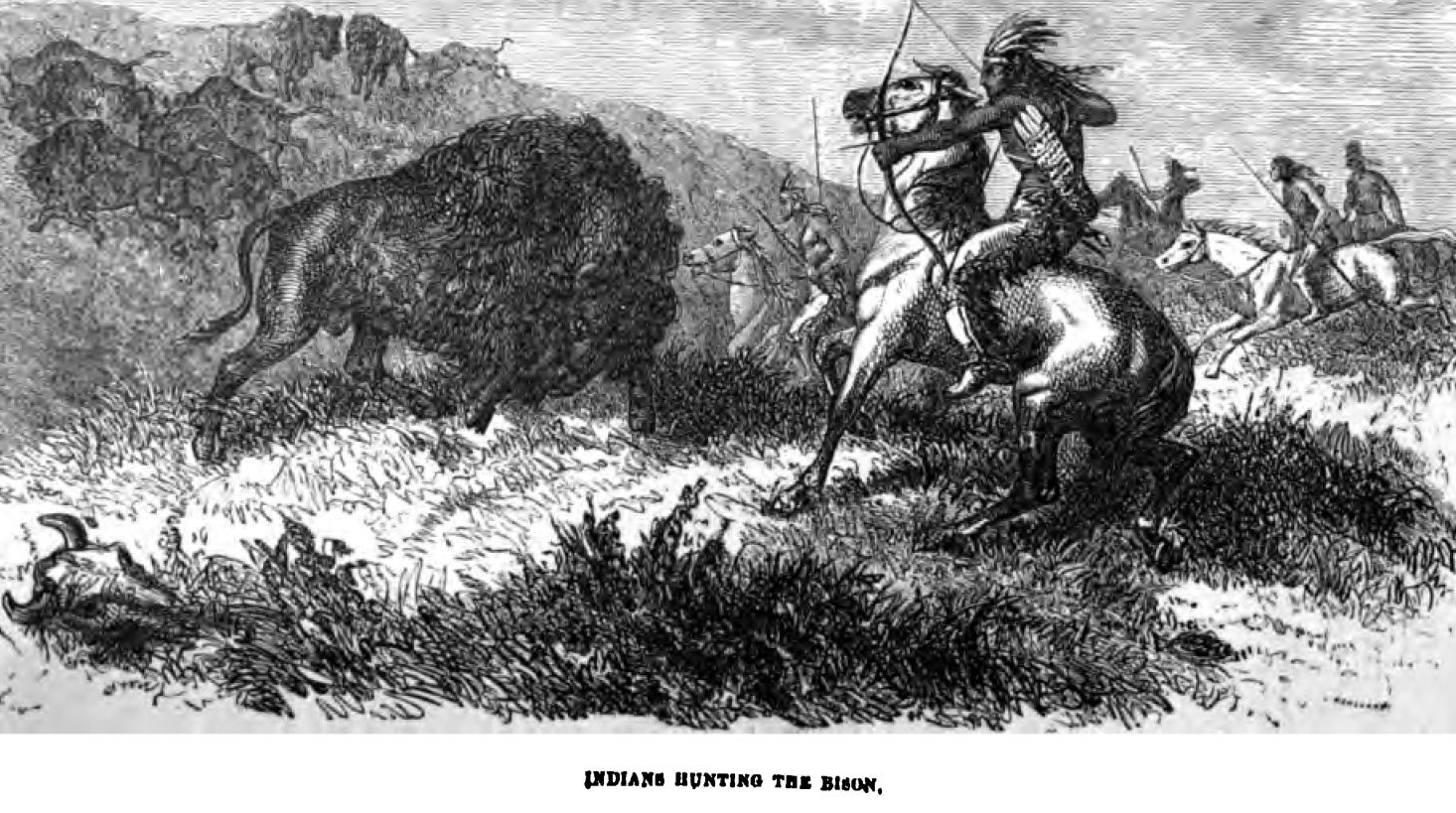

“But by whatever name he is known, it is a pity that he is rapidly becoming a creature of the past. Indians and white men have waged incessant war upon him: as long as only the Indians attacked him with their arrows and lances, the slaughter was not sufficiently great to make any impression upon the herds, but when the white men poured into the West bringing their improved weapons, which were speedily acquired by the Indians, the destruction of the buffalo became simply a question of time. When the buffalo became scarce on the plains they were followed to their winter haunts, and killed in the deep snow, where they were unable to make any resistance. Thousands, and we could almost say millions, of buffaloes have been shot for mere sport and left to rot on the ground, not even their hides being taken away. Of late years their hides have risen to high figures owing to their scarcity; 'buffalo robes' were common enough twenty or thirty years ago, but at the present time they are rarely seen.”


“Isn't there a bison in Europe as well as in America?” queried George.
“There is,” was the reply, “and he is known as the aurochs in books on natural history. He is thought to be the oldest of his race, and would have been extinct long ago were it not for the protection he has received. He is found only in a few localities in Russia, where he is protected by the Government, and no animal of the race can be killed under severe penalties except by permission of the Russian Emperor. It is needless to say that this permission is seldom or almost never given. These creatures have never been domesticated, but run wild in the forest, where they eat grass and brushwood, and the bark and twigs of young trees. The aurochs does not reach maturity until its sixth year, and next to the elephant, rhinoceros and giraffe it is the largest of land animals.”
One of the youths asked what was the size of a full-grown aurochs.
“Measured at its withers,” was the reply, “it is nearly six feet high, and it is immensely strong. Its horns are large, round and lateral, and its tail is long with a tuft of hair at the end. The shoulders and all the front part of the body are covered with long coarse hair very much like that of the American bison, and it has a long mane under its throat. The rest of the body has a thick coat of black hair, and altogether the aurochs is not an amiable looking beast.”
One of the listeners asked whether he was fierce or gentle in his ways.
“As to that,” Mr. Graham answered, “he bears a bad reputation. He is very shy, and like the American bison will keep out of the way man face to face, but rushes at him with great fierceness. If captured when young he becomes accustomed to his keepers, but will not tolerate the presence of any one else.
“The aurochs is the urus of the ancients,” continued the gentleman, “his name coming from Ure-ox. Fossil remains of the animal have been found all over Europe, and in the time of Julius Cæsar it lived in Germany. It was a contemporary of the mammoth and is the only existing land animal whose skeleton has been found side by side when he can. He also resembles his American cousin in having a keen scent, so that he can only be approached against the wind; the buffalo hunters will tell you that you cannot get anywhere near a herd if you approach it with the wind, as the animals will scent the danger miles away and start off at a rapid pace to avoid it.


The aurochs also resembles the bison in fighting fiercely when cornered; he is worse than the bison in one respect, as he will not try to escape when he meets a with that of the huge creature whose remains have astonished the scientific world.
“From the bison to the buffalo is a very natural step, and by buffalo I mean the animal to whom the name properly belongs. But before taking him up I will mention the yak of Tartary, which has a flowing tail like that of a horse, a hump on its shoulders, a tuft of hair on its forehead, a mane along its neck and shoulders, and long hair on the lower part of its body which varies in quantity according to the season of the year. He is used as a beast of burden and can carry a very heavy load, and he is as sure-footed as a goat. The Tartars keep large herds of these animals and move about from place to place to find pasturage; they make tents and ropes of the hair of the yak, and clothing out of his skin, and they occasionally eat the flesh of the beast, though they prefer that of the horse. They make butter from the milk, and by putting it in bladders tightly closed against the air they can preserve it a long time.”
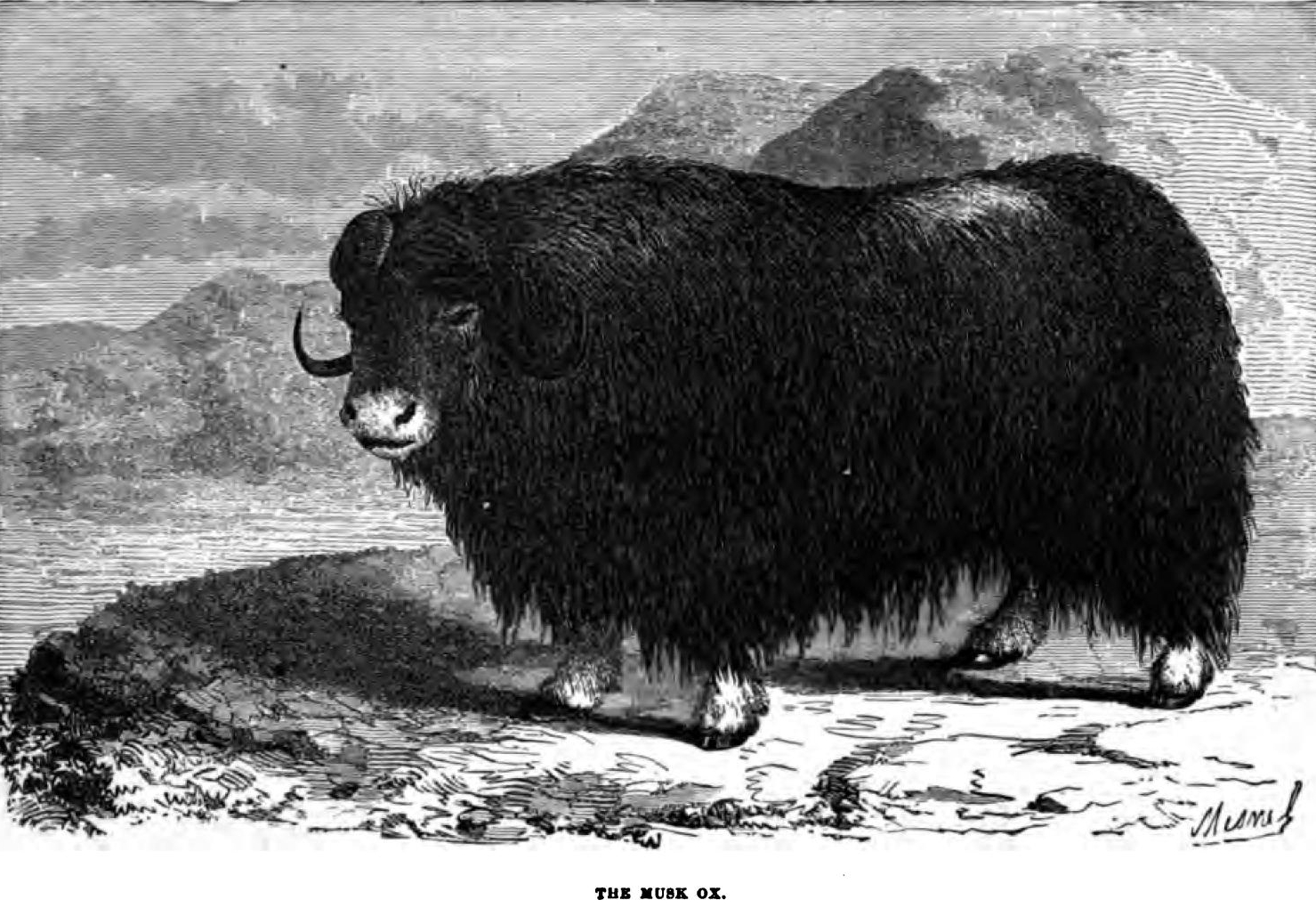

“I've been reading about another animal,” said Harry, “that must be a near relative of the yak.”
“What is that?”
“The musk ox of North America,” was the reply.
“Yes,” said Mr. Graham, “he is a relative of the yak, though somewhat smaller, in fact he is so small that he resembles a large sheep more than an ox. He belongs in the cold regions of North America, and is very useful to Arctic explorers, who feed upon his flesh. He has a covering of thick and long hair of a dark brown color, and his horns are thick and large, bending downwards over the sides of his head and then suddenly backwards and upwards at the tips.”
“He looks very clumsy.” said George, glancing at the picture of the animal, “and evidently can't, get over the ground very fast.”
“On the contrary.” was the reply, “he is as nimble as a goat and can make astonishingly rapid speed over the rough and rocky ground where lie lives. The hunter who thinks he can travel as fast as this apparently clumsy animal makes a great mistake.”
“He's not the only animal that deceives us that way,” said George. “Nobody would think the hog could run and yet what a lively chase it is to catch a wild one. But some hogs are swifter than others, and I have heard of parts of the country where hogs were prized not according to their fatness, but for their ability to out-run professional hogthieves.”
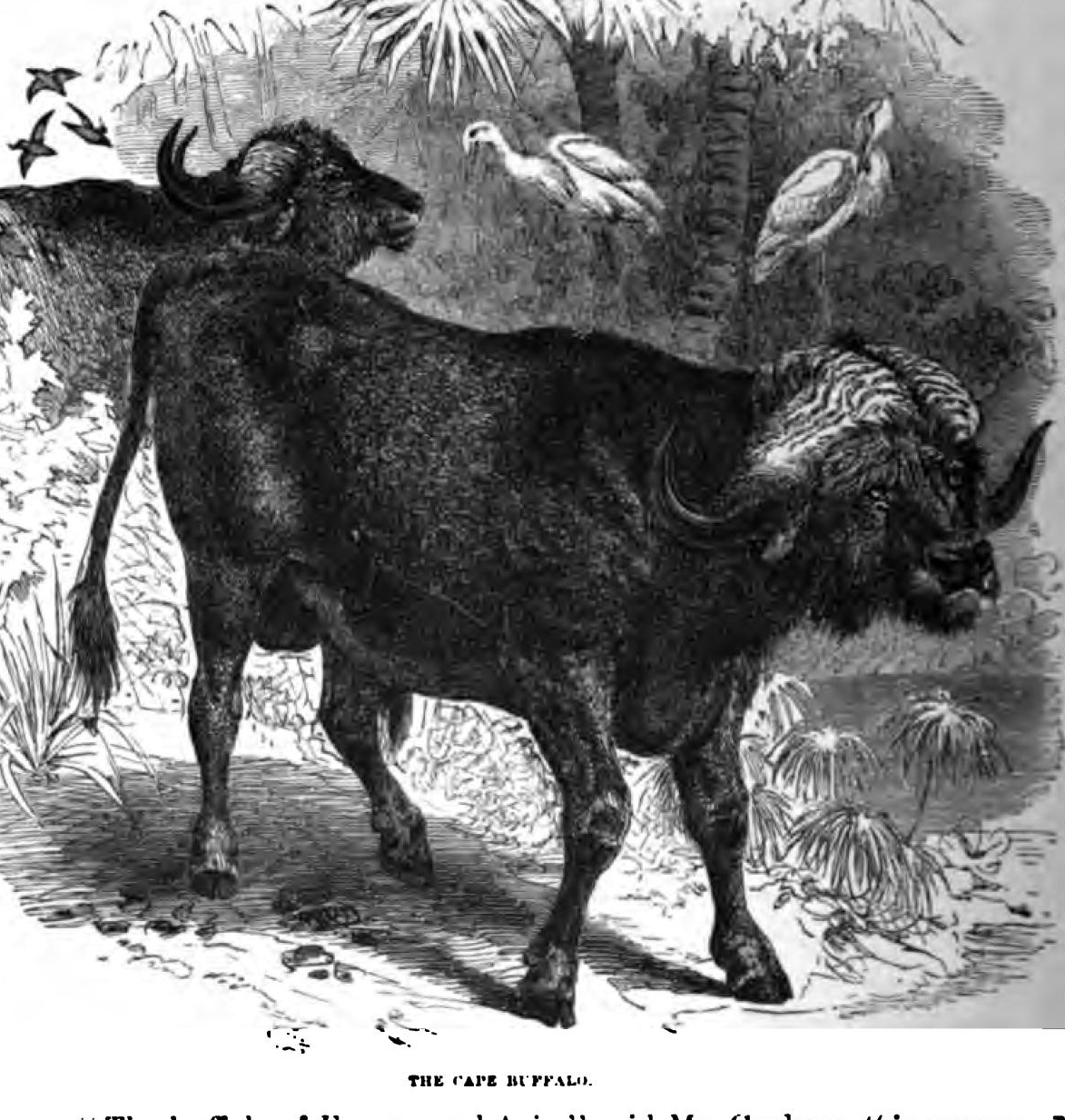

The buffalo of Europe and Asia,” said Mr. Graham, “is supposed to be a native of the damp parts of India, whence he has spread over the countries where he is now found. He is essentially a tropical animal and does not thrive in mild climates, and he is fond of wallowing in the mud and lying down to rest there.”
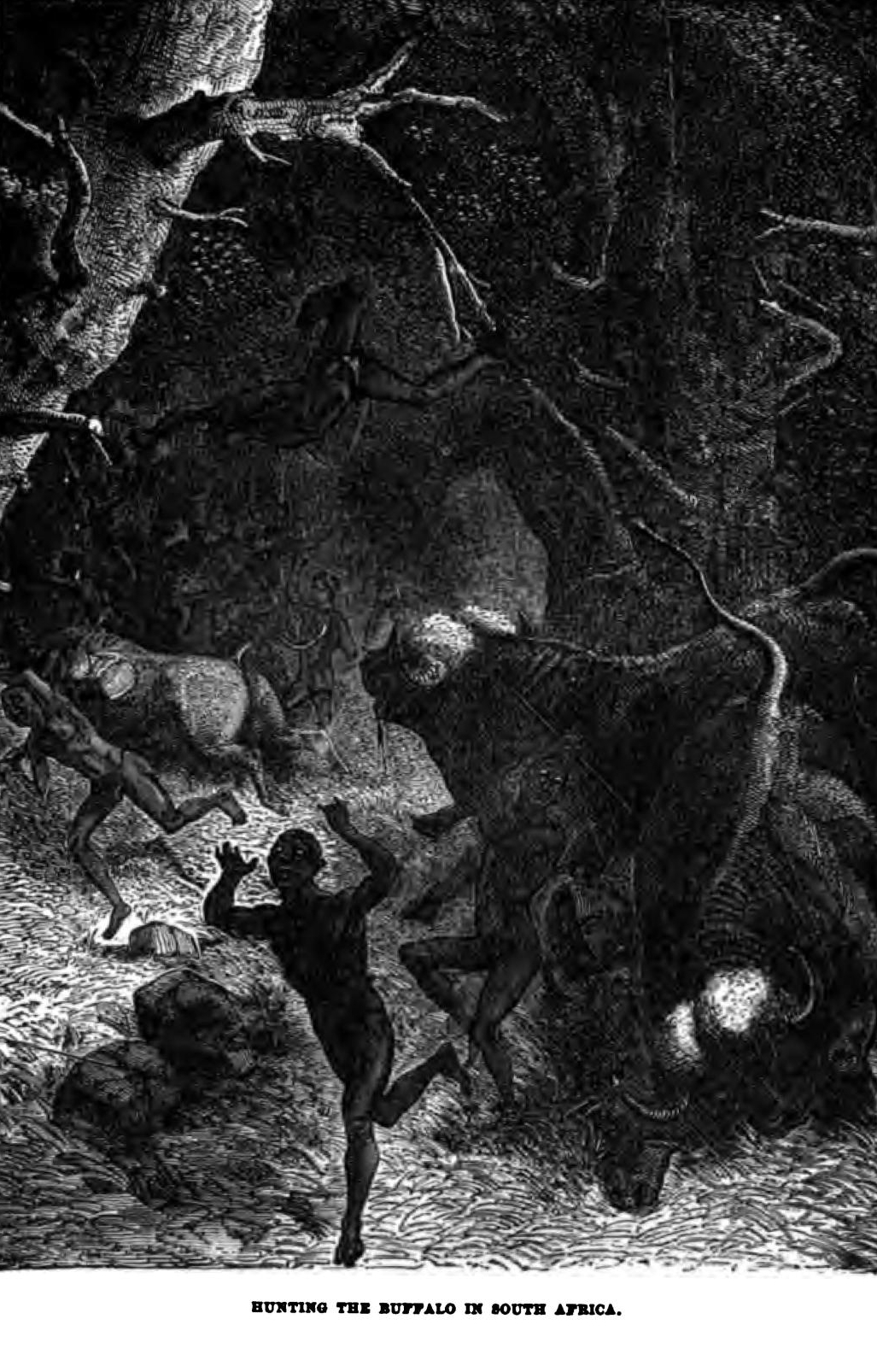

George asked in what the Asiatic buffalo resembled the common ox. Mr. Graham said it was about the size of the ox and had a bulging-forehead with two black horns curved outward. It has a scanty coat and generally presents a very dingy appearance. “It is of an ugly disposition,” continued the gentleman, “and is much inclined to attack strangers. I had an adventure with one of these creatures in Egypt that came near costing me my life.”
“Please tell us about it,” said one of the boys.
“I was taking a walk in the fields a few miles from Cairo,” said Mr. Graham, “and carried nothing except a small walking stick. While I was looking at the grasses and the fields of cotton and douro, and watching the pigeons circling in the air, I heard all at once the shouting of the natives to indicate something unusual. Looking around I saw that a buffalo was coming directly toward me and was not more than a hundred feet away. His head was lowered and it was very evident that I was to be the object of his attack.
“I had to think and act very quickly, as none of the natives were near enough to divert the attention of the brute. There was no fence near and no building or enclosure in which I could find safety.
“Close by me was a field of cotton, the bushes being as high as my head. Into this field I ran, and once in its shelter I doubled on my pursuer and ran the way that both of us had come. Then I met the crowd of natives that were trying to catch the runaway animal and they soon had him secured. A friend of mine in Egypt that same year only saved himself by firing a charge of shot directly at the buffalo's eyes when the creature was not more than ten yards away. He was compelled to pay for the destruction of the animal, as it was very properly argued that he was a trespasser in the field where the buffalo was grazing. You may be sure that he was careful after that not to go where he had no right to be, especially if there was a likelihood of encountering buffaloes.
“A very pugnacious variety of the buffalo is the South African one. He has large horns, that spread out at the base so as to form a sort of helmet that is impenetrable for a bullet or for any other missile smaller than a cannon shot. The African buffalo is found all the way from Guinea to the Cape of Good Hope, and is often called the Cape buffalo. He lives in large herds in the forests, though he sometimes comes into the open plains, where he is more cautious and less quarrelsome than when in the woods. The natives hunt the Cape buffalo, but very often the animal shows so much fight that he becomes the hunter and drives his assailants away. Not infrequently he kills some of them with his powerful horns, and also with his feet, which he uses with great alertness. A single buffalo has been known to resist successfully a hundred natives armed with spears; since the introduction of fire-arms the numbers of the Cape buffalo have diminished, as he is unable to stand against the weapons of civilization any more than can his American namesake.
“We'll go from the cows to sheep at our next talk,” said Mr. Graham to the youths, “and in the meantime please look at the books, and when we sit down to discuss them you may tell what you have found.”
In the language of Parliamentarians “the meeting then adjourned,” and the boys proceeded to look at Cassell's Natural History and other books for information on the topic which they were next to consider.


Origin of the Sheep—The Asiatic Argali—Rocky Mountain Big-Horns—Their Remarkable Intelligence and other Peculiarities—A Hunter's Experience Among Them—Sentinels Guarding the Flocks—Differences between Wild and Domestic Sheep—Gentleness of the Lamb—The Lamb and the Children in the Well—The Sheep that Broke Through the Fence—Varieties of Sheep—The Long Wool and the Short Wool—The Merino—His Origin and Present Extent—Sheep in Australia—An Old Question and its Answer—Astrachan Sheep—Intelligence and Activity of the Goat—Some of his Performances—His Powers of Climbing—Goats said to eat Tomato-Cans and Old Boots—What Buffon says of the Goat—the End.
Well,” remarked Mr. Graham as they sat down for their next discussion of the animal kingdom, “what have you learned about the sheep and his kindred?”
The youths waited a half minute or more, each desiring the other to begin. Then Mr. Graham turned to Harry and nodded for him to speak. Thus encouraged the youth made an end of the silence.
“I have found,” said he, “that the naturalists do not agree as to the origin of the sheep. Some think he is descended from the argali, an animal which is found in Asia and is as large as a deer. In shape and general appearance he resembles a sheep but is larger than the largest known variety of the domestic sheep. He runs wild in the mountains but can be easily tamed, especially if he is captured when young.”
“Has he any relatives in America?” the gentleman asked.
“Yes,” was the reply; “the Rocky Mountain sheep or big-horn, as he is also called, is the American argali, and resembles the Asiatic one very nearly, Now while some naturalists think the domestic sheep is descended from the argali, others believe that the sheep is a animal that has never lived in a wild state.”
“What do you think about it?” was a query that somewhat puzzled the youths.
“We haven't made up our minds yet,” answered Harry, “and from present appearances we are not likely to at once. We went to look at a flock of sheep and concluded from what we knew of the habits of the animal that they would have a hard time to exist if they were outside the care of man. We don't know much about the argali either in Asia or America, but if he is no more intelligent than the sheep he would not be able to elude the hunters as he does.”
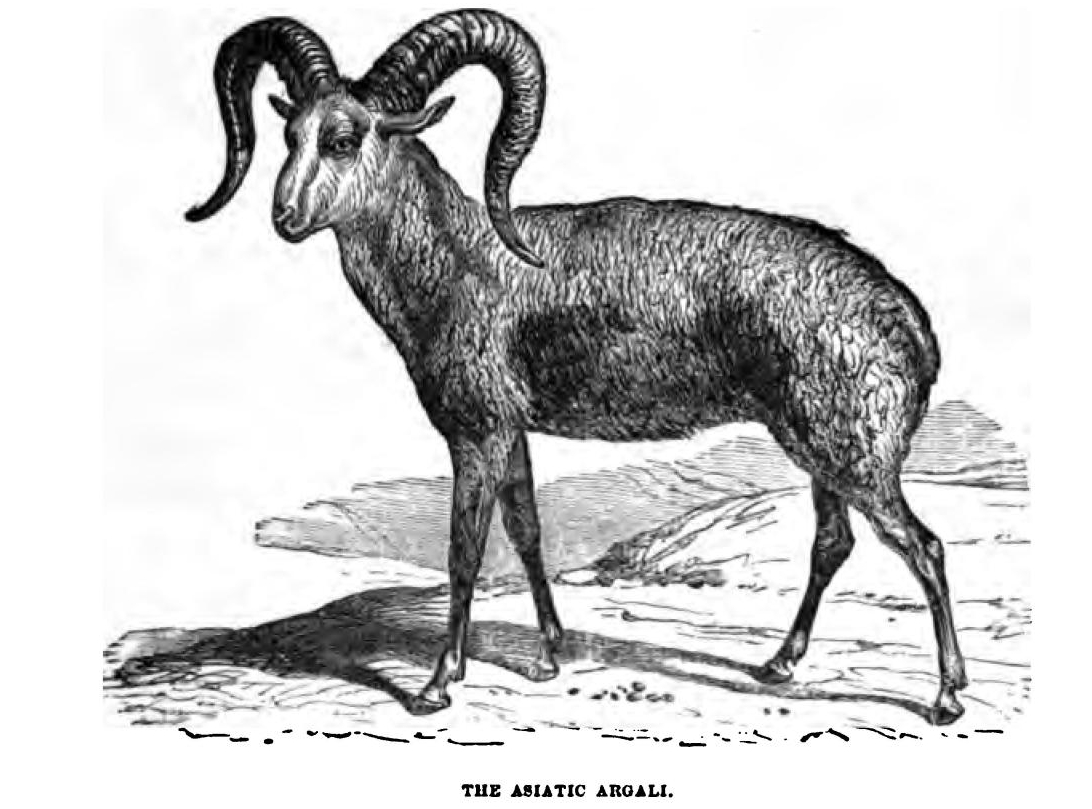

“You are quite right,” said their mentor, “as the argali far surpasses the sheep in intelligence and activity. The argali is graceful in figure, wonderfully sure of foot, his vision and heaving are of the keenest, and when there is any danger near he is always on the alert to discover it. Read what a hunter say of the Ovis montana or Rocky Mountain sheep,” he continued, as he opened the pages of a book entitled “Sporting Adventures in the Far West,” by J. Mortimer Murphy.
George took the book and read as follows:
“Few creatures are more difficult of approach than the big-horn, for, like all mountain animals, it is exceedingly keen of scent, unusually vigilant, and so cautious that it carefully reconnoitres a country from an elevated stand-point ere it presumes to advance toward it. The Nimrod who would place the head of the big-horn among his trophies of the chase, must be not only of an active and vigorous form to bear steep mountain climbing and a rarefied atmosphere, but he must also possess the qualities of patience, perseverance and hardihood, for its pursuit may lead him through deep and gloomy precipices, and over ground so stony and rough as to seem impassable.
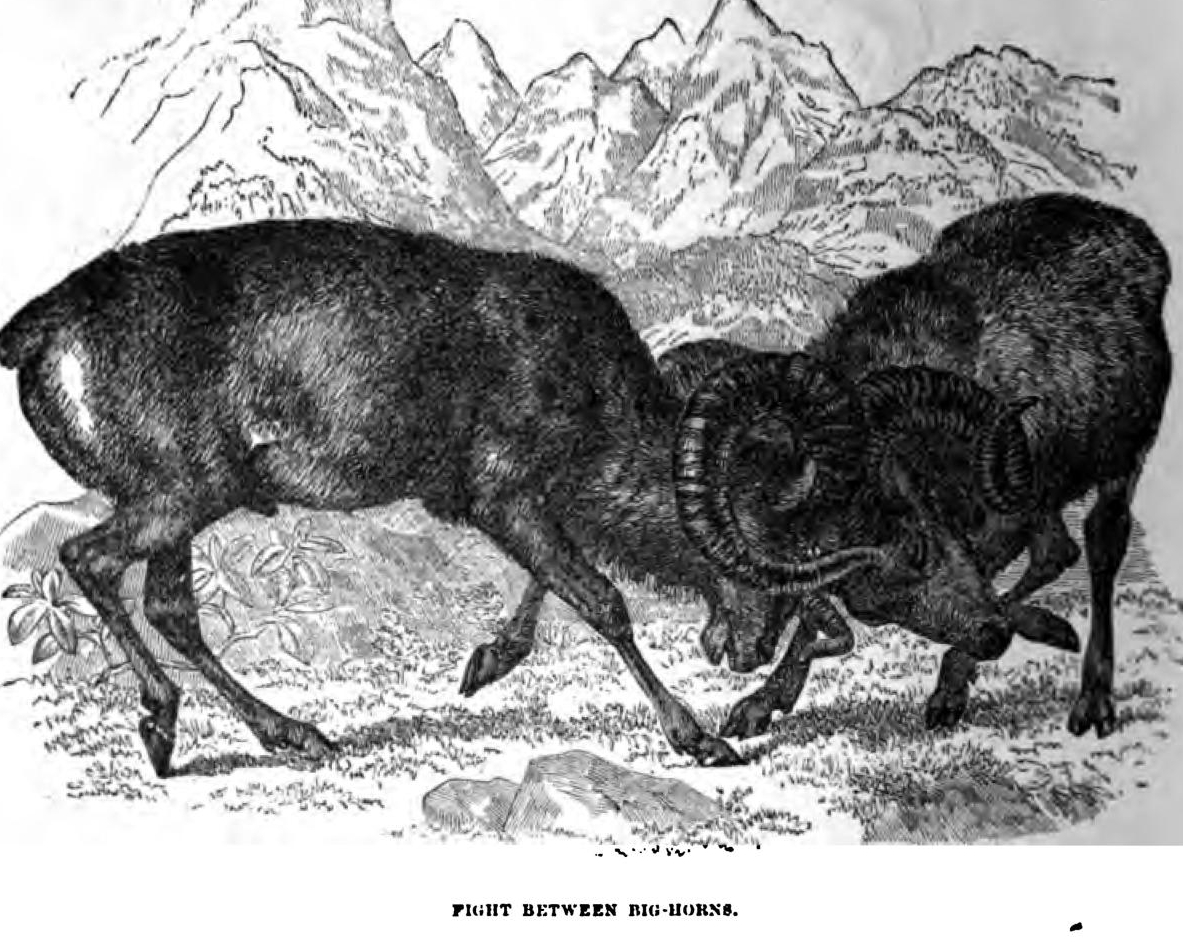

“When a flock is migrating to new pastures the sentinels or leaden carefully scrutinize the country before them from every commanding position, and when they are satisfied with its appearance the whole party advance boldly, and having made it their head-quarters, throw out vedettes, generally males, who mount guard on elevated crags or hillocks, and vigilantly survey their surroundings until their companions have dined, when all seek shelter amidst crags, small pine or fir coppices, and inaccessible shelves of rock or somber canyons, where no ordinary enemy can follow them without making its presence known.
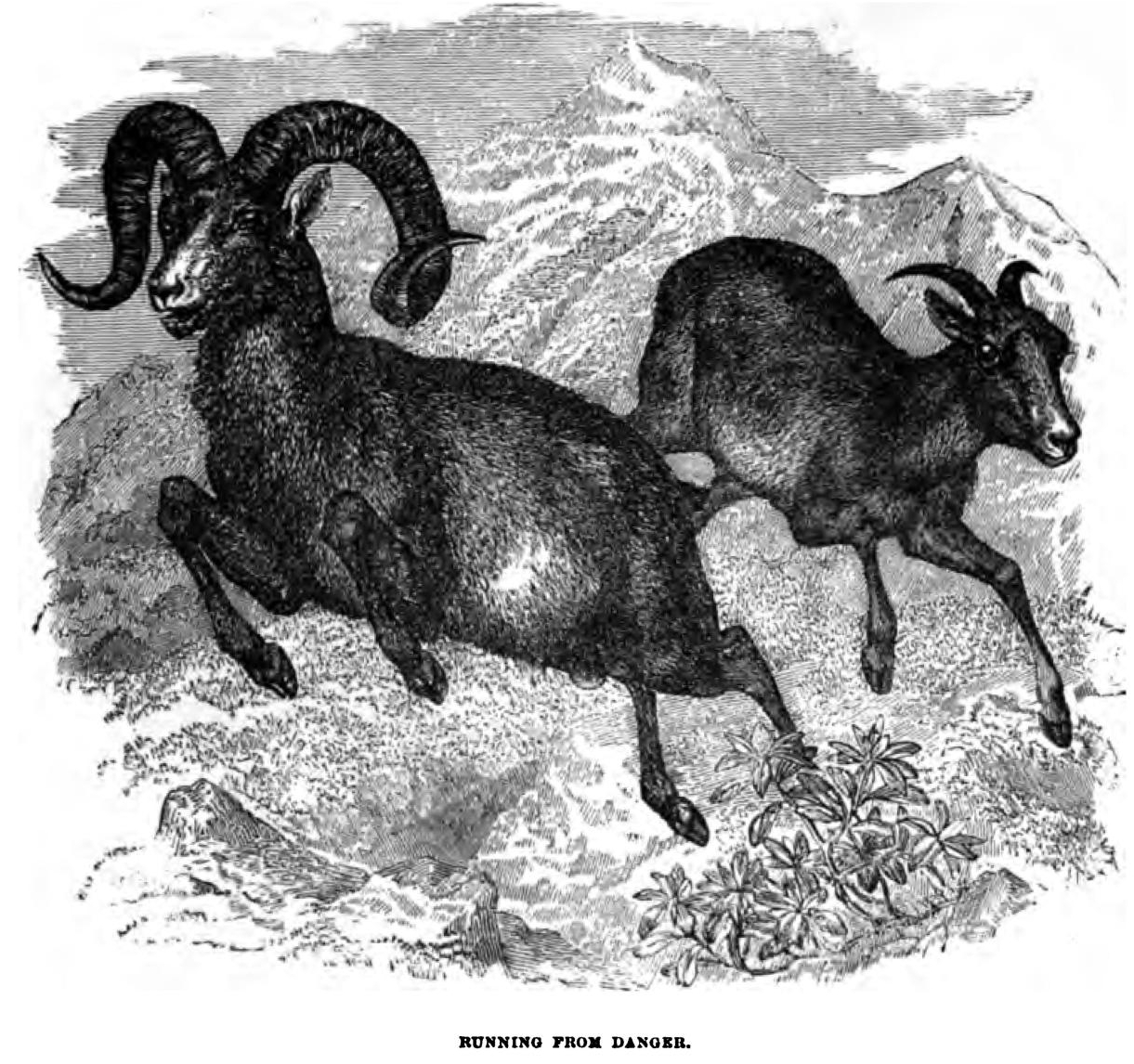

“When a sentinel detects the approach of a suspicions object, he sounds an alarm at once by a few loud and peremptory hissing snorts; this brings the flock huddling together, the lambs and ewes in the center; and when the column is formed, all dash for the highest ridges at their best pace, and never stop until they have sought a safe refuge among crags or chasms. The advance is always led by a sturdy ram, one that is generally looked upon as the leader, and the rear and flanks are carefully guarded by the young males. In regions where they are little disturbed they raise their heads every few minutes while feeding and survey their surroundings; and as they are both sharp of eye and keen of scent it requires the most careful stalking to approach them within shooting range without being discovered. They will get the scent of a hunter to windward seemingly half a mile away; and when that terrifying odor is made known to the flock they display the greatest symptoms of terror and dash wildly for the highest pinnacles, now leaping nimbly from crag to crag, or vaulting dark and narrow chasms with the greatest ease, nor do they stop until they have placed a goodly distance between themselves and their most dreaded foe.”
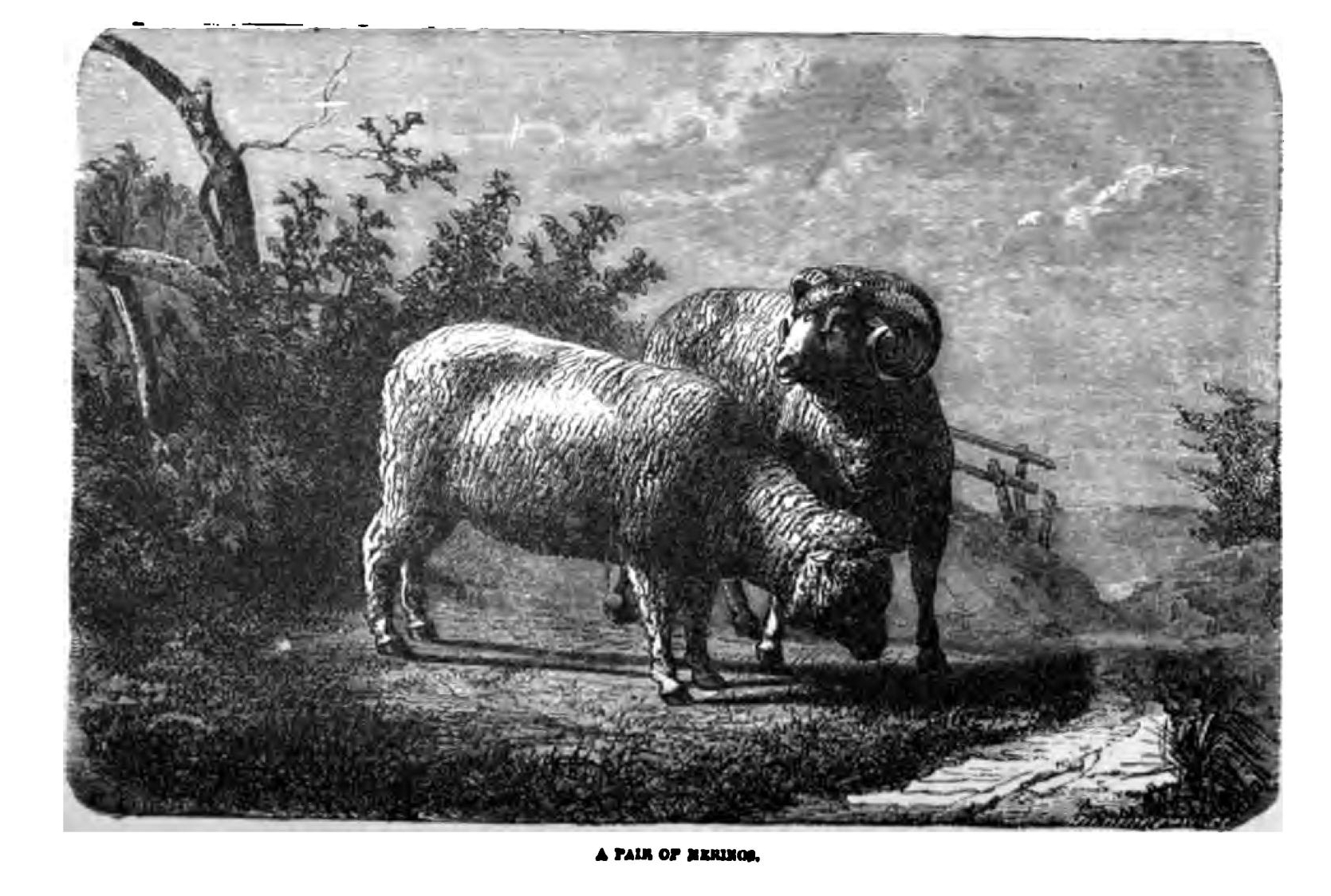

“A common sheep could do nothing like that,” said Harry, as George paused and closed the book.
“Not by any means,” responded Mr. Graham, “as he is heavy in his steps and slow in his motions. His intelligence is low and his constitution could not stand the exposure to the weather that the wild animal endures without injury. Except under very favorable circumstances a flock of sheep would soon perish if turned out to shift for themselves.”
“Then I suppose we cannot find many stories of the intelligence of the sheep as we can of the dog, the elephant and the horse,” one of the youths remarked.
“We cannot,” was the reply, “but to offset the lack of sagacity in the sheep we have its patience and kindness of disposition, in which it is without a superior. The lamb has been in all ages the type of gentleness, and will probably continue so as long as man and the sheep exist together. He is also the type of playfulness, and there can be few more pleasing sights than that of a flock of lambs sporting on the grass or a single lamb playing among children by whom he is kept as a pet. I have somewhere read a story of a lamb that belonged to some children and went out with them one day as he had often done before. An hour or so later the 'lamb came to the house bleating loudly and evidently wishing to attract somebody's attention. When he obtained it he led the way to where the two children had fallen into a shallow well, and though not injured by the fall, which had only been a few feet, they were unable to get out. It seems they were standing on a plank which covered the well; the plank being old and rotten had given way beneath them, but as the well had been filled nearly to the top with earth they suffered no damage. In this case the lamb had the intelligence to understand that help was needed and he went to bring it.
“Sheep will sometimes display considerable cunning in getting into fields and pastures where they have no right to go. On the country farm where I lived when I was a boy we had a small flock of sheep; they were all stupid enough with the exception of one, that used to devote himself to hunting for weak places in the fence between the pasture where they ran and the adjoining field. It was what we called a 'brush' fence, and this mischievous animal used to walk along the line and survey it with great care. When he found what he thought was a weak place he would insert his head through the opening and work patiently till lie had enlarged it sufficiently to permit him to get through. Then the rest of the lot followed 'like a flock of sheep,' and when we went to drive them out the shrewd leader took them in a direction quite opposite to the opening. He seemed to understand that it would be blocked up as soon as discovered and he wanted to keep it for further use.”
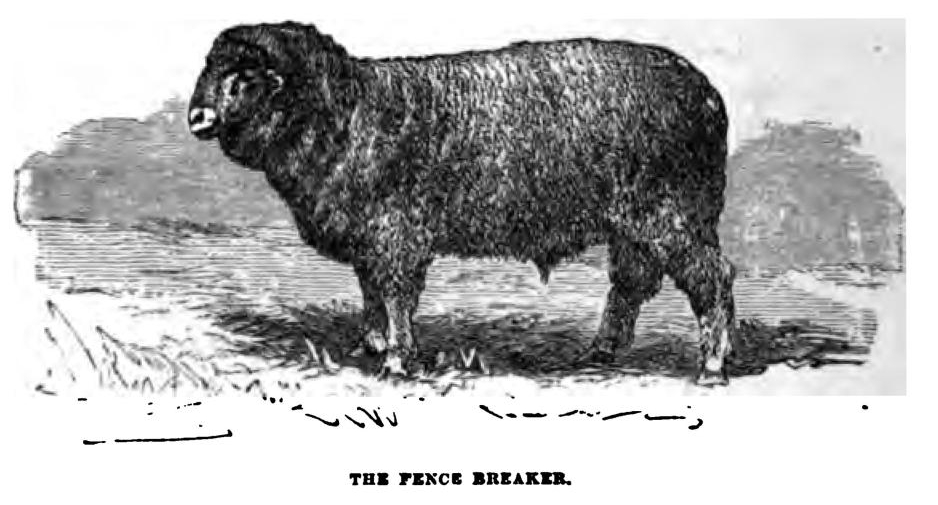

Harry asked how many varieties of sheep there are in the world. He had looked through the works on natural history but was unable to find out.
“There are two great varieties,” answered George proudly, as he realized that he had come upon some information which had escaped his brother. “They are the long-wool and the short-wool,” said he, “the former being most useful for the production of meat and the latter for their wool. The long-wooled sheep have the wool straight or slightly curved while the short-wooled kind have it thick and curly. The Leicesters, Cotswolds, Scotch and Welsh breeds are of the long-wooled kind, while the Merino is the most noted of the other sort.”
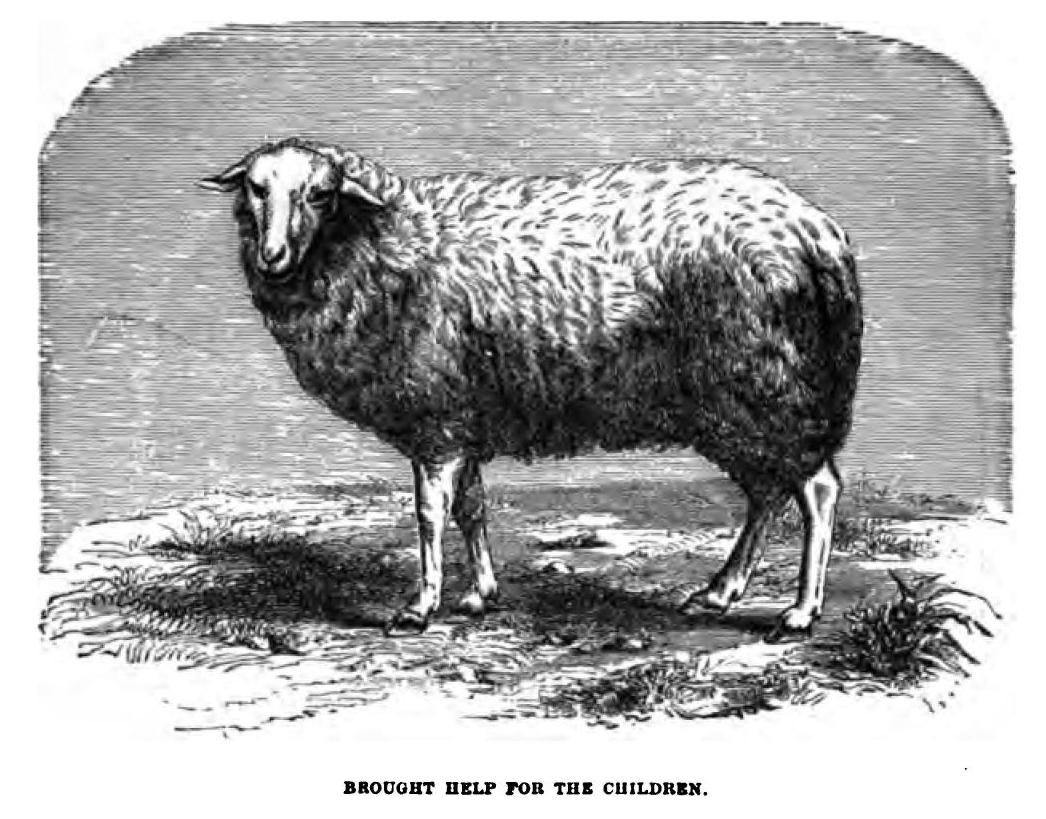

“That is right,” said Mr. Graham, “and can you tell me which is the most widely known of the short-wooled sheep?”
“I can,” said Harry; “it is the Merino, which was brought into Spain by the Moors and derives its name from the Spanish word merino which signifies 'wandering.' It was introduced into France more than a hundred years ago and has gradually spread all over Europe and to America and Australia. There wasn't a sheep in Australia when Governor Philip went there in 1788, and now that country sends a million and a quarter bales of wool every year to London alone besides what it ships to other countries and consumes at home. The merino is the favorite sheep of Australia, and it has also found a home in the British colonies at the Cape of Good Hope.
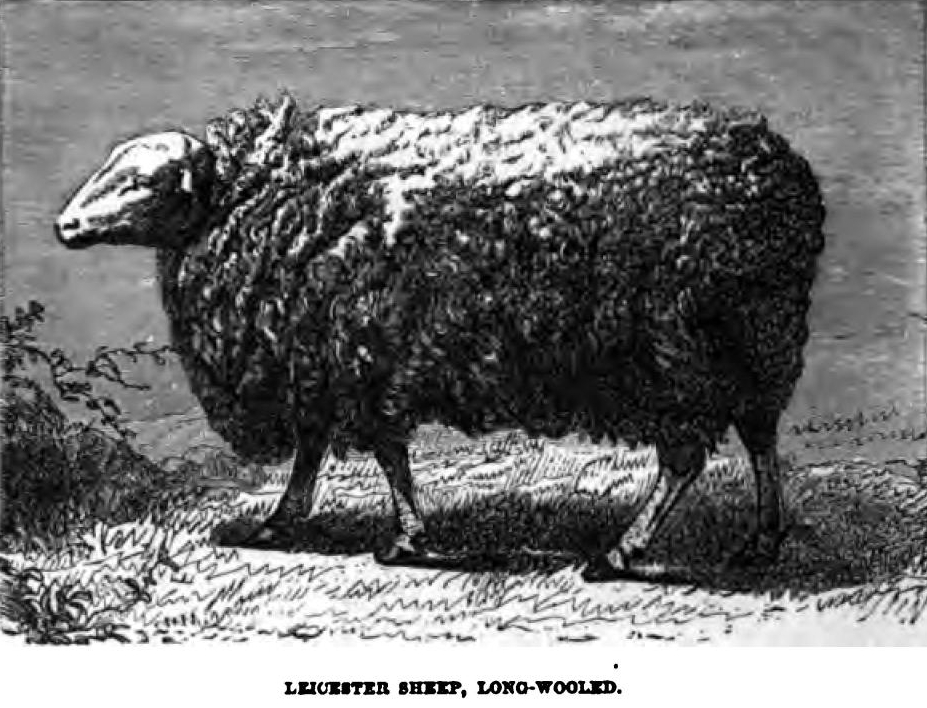

“As to the other kinds of sheep,” continued the youth, “they are, as the auctioneers say in their advertisements, too numerous to mention. Almost every county of England has its peculiar breed, some of them being more famous for their mutton than their wool, and others vice versa. Scattered over Europe are many breeds, but it is safe to say that the most of them came from one original stock and owe their variation in development to the differences of climate and modes of rearing. One of the most famous breeds of sheep in England is the Southdown, which is famous both for wool and meat: it has been introduced into France and other countries, and we have a good supply of Southdowns nowadays in America.”
“I am reminded,” said George, “of a conundrum I heard a while ago, and it is about sheep.”
“What is it?”
“Why do white sheep eat more than black ones?”
“I know,” said Harry, “that's a chestnut. It's because there are more of them.”
“Yes,” responded Mr. Graham, “and the naturalists have had much difficulty in separating the one from the other in consequence of the intermediate forms between them. The goat is generally believed to be descended from the paseng or ibex of Asia, and he inherits some of the qualities of his ancestors who dwell among the rugged mountains. He is marvelously sure-footed, and can go where almost any other quadruped would not dare venture.”
“I wonder if it is true,” said one of the youths, “that when two
“But it isn't exactly right,” said George, “at least not for all parts of the world. In Central Asia the flocks contain more black sheep than white ones; the Astrachan sheep is generally black and his wool is very soft and curly. The skin of the Astrachan lamb is used as a sort of fur, and very pretty cloaks, muffs, collars, coats and similar things are made of it.”
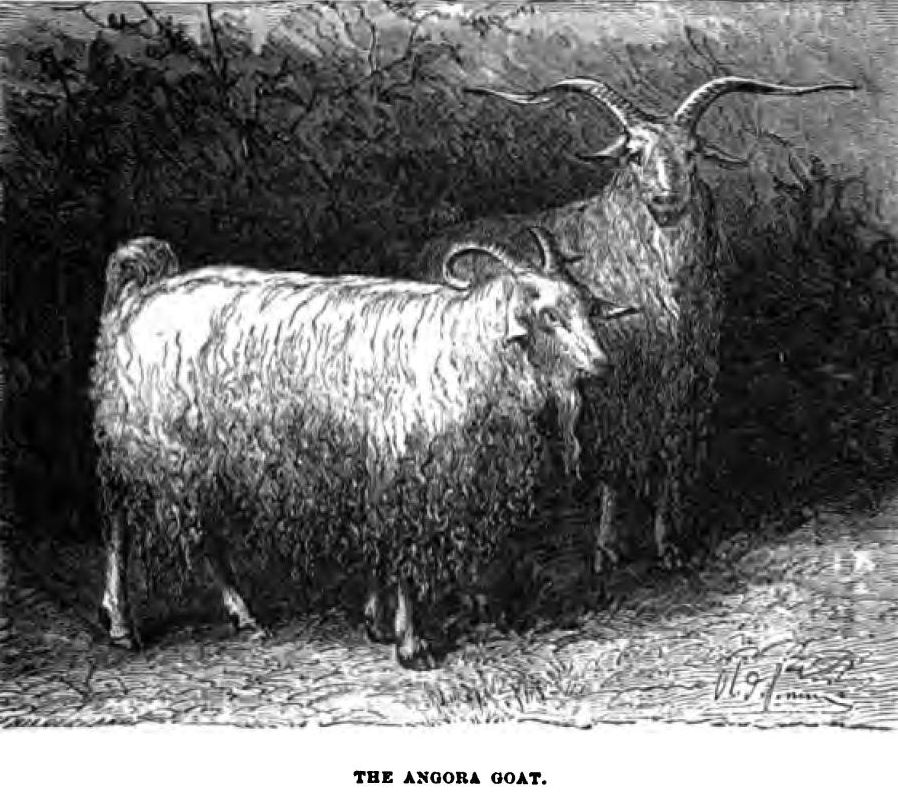

“While I was looking up the description of sheep,” said Harry, “I read something about the goat, who may be called his first cousin, when goats meet on a mountain road where it is too narrow for them to turn around or pass at the side, one will lie down and let the other go over him.”
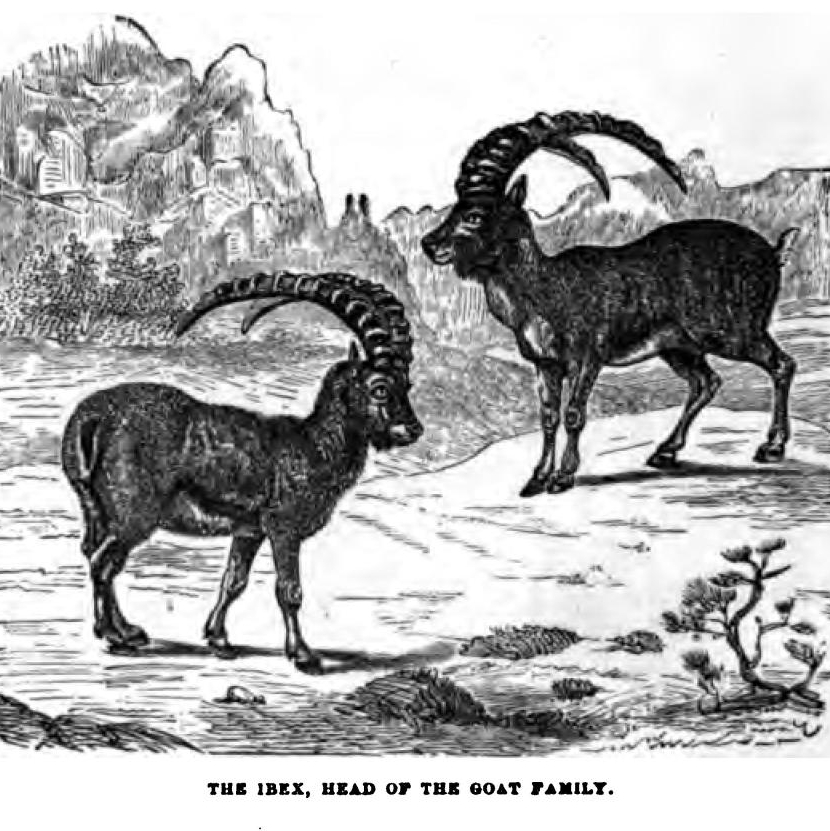

“It has been told so often,” Mr. Graham answered, “that it certainly ought to be true. Not long ago I read of exactly such an occurrence somewhere in Spain, and it was witnessed by several persons. But what is much more likely to happen is that the animals would fight for the possession of the road, and one or perhaps both would be forced over the precipice and dashed to death on the rocks below.
“The goat's power of climbing and his fondness for getting into dangerous places are something remarkable. I have seen in the Alps and also in Algeria the goats browsing on the steep side of a mountain where it would be impossible for a man to climb, and where a single slip or mis-step would send the animal down for hundreds of feet almost perpendicularly. At Constantine in Algeria there is a wall of rock five or six hundred feet high; it is slightly, broken near the top, perpendicular further down, and the goats browse along the broken part, springing slowly from break to break until they can get no farther. Then they slowly ascend the cliff and start out for a new grazing place. The funny thing was that there was plenty of grass elsewhere and they had no occasion to get into such dangerous positions. They seemed to do it for the fun of the thing.”
“You remember they had a goat at the monkey theater,” said Harry, “that climbed upon bottles in the shape of a pyramid, stood on the top of a pole, balanced himself on a table and did other curious things. I wonder somebody doesn't train goats to walk a tight rope, for it must be they could do it.”


“I think I've heard of their doing it,” Mr. Graham remarked, “though I am not positive on that point. I've seen an elephant walk a tight rope, but it was stretched only a foot or so from the ground so that a fall wouldn't injure him.”
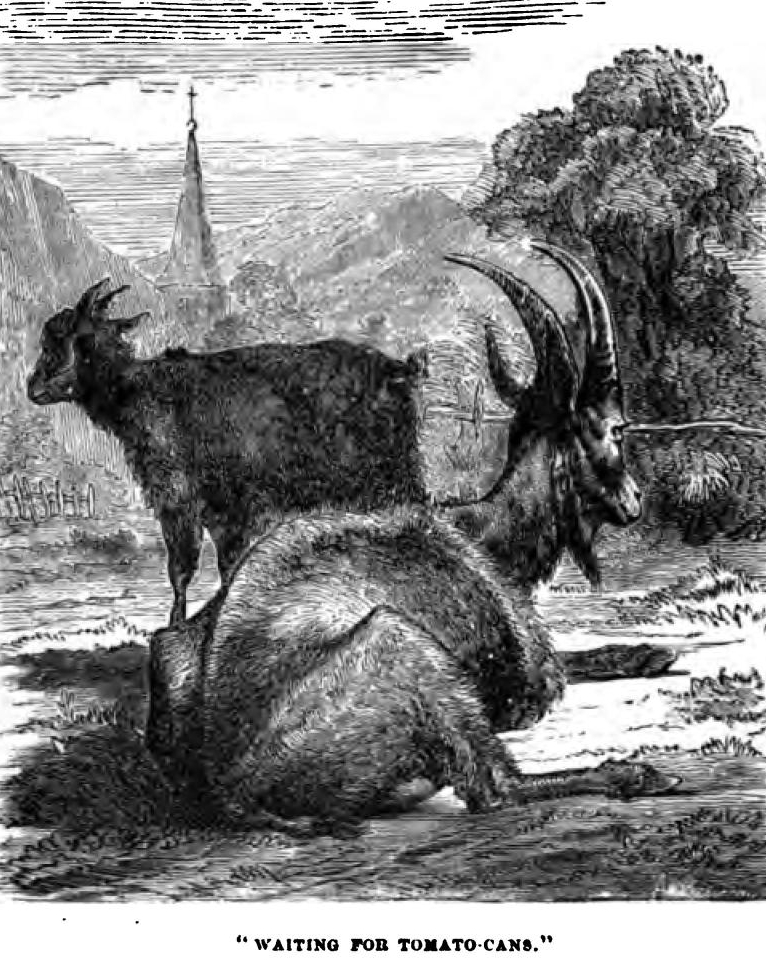

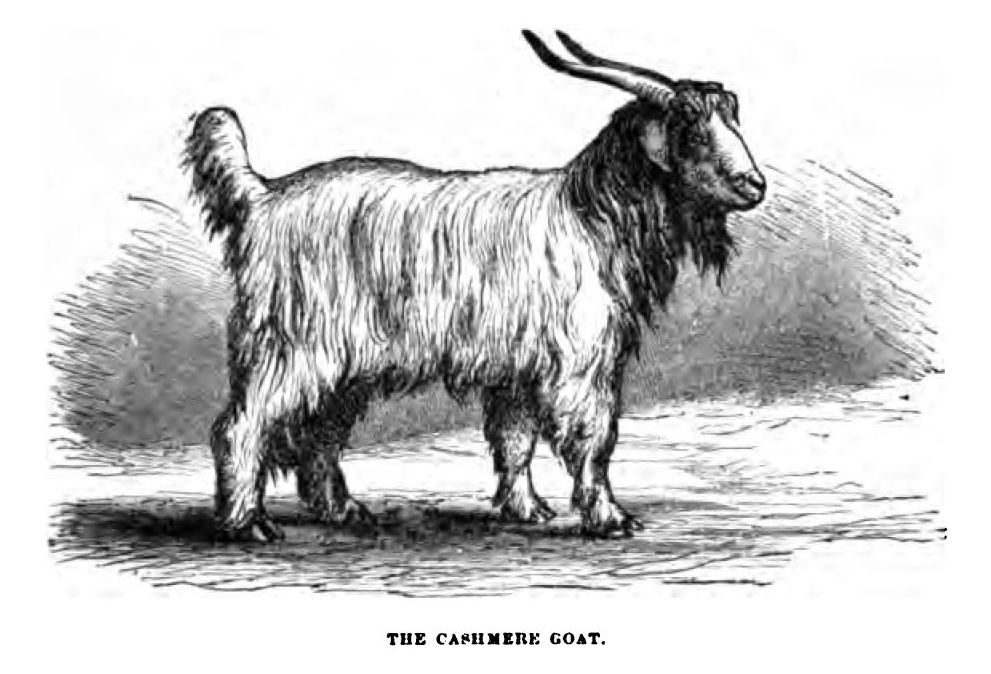

The conversation about goats took a wide range and included performances both actual and apochryphal. George asked what variety of goat it was that was credited with eating tomato-cans, umbrellas, boots, and similar things usually considered inedible, and was told he must seek it in the upper districts of New York and at Hoboken and other suburban places. But while Mr. Graham would not aver that the goat lived upon the articles mentioned, he positively assured the youths that he had seen the creature devour newspapers and bill-posters with apparent relish, and that it didn't seem to make any difference to him whether the newspapers were Republican or Democratic, secular or religious. He was sure that the digestion of the goat was one of the best in the world and could justly be envied by a great many men. “But leaving all jest aside,” said he, “the goat is a hardy feeder and can live on very little; he has been called the poor man's cow, as he can be kept by people who cannot afford the expense of a cow and the milk of the goat is rich and nutritious. Invalids are sometimes nourished on it when the milk of the cow does not answer the purpose, and in some countries large flocks of goats are maintained for their milk. The medicinal properties of goat's milk and whey are well known, and cheese made from goat's milk brings a higher price in the market than that from cow's milk.”
“I found what Buffon, the naturalist, said of the goat,” said George, “and it is worth remembering. He considers the goat superior to the sheep both in intelligence and agility. He is stronger, lighter, and more agile than the sheep, he is sprightly, capricious and given to wander, and it is with difficulty he can be confined to a flock. He loves to retire into solitude, and climb steep and rugged places. Though he seems to feel the effects of severe cold, he is not afraid of rain or storms or too great a degree of heat: he cheerfully exposes himself to the sun and without inconvenience sleeps under its most severe rays.”
The various kinds of goat, the Angora and Cashmere varieties, which supply the wool for shawls and other fine fabrics, the Syrian goat with pendulous ears, the Swiss goat which is kept in large flocks and is highly profitable to its owners, and the common goat which is found in all civilized countries of the world, all were discussed and duly considered. But the youths were disappointed in the animal, as they were obliged to offset his numerous good qualities with the fact that he is wayward and unruly, and does not form any serious attachment to his owner. The youths decided that they would not enter the business of rearing goats, but be content with the pet animals they then possessed.
George suggested that it was time to look after their horses. While they are busy with those favorites we will lay down our pen for the present, in the hope that we will be allowed to listen whenever they again discuss the members of the animal kingdom.